It seems we can’t find what you’re looking for. Perhaps searching can help.
Sign Up for newsletter!
Subscribe to get the latest eBook!
Hotline






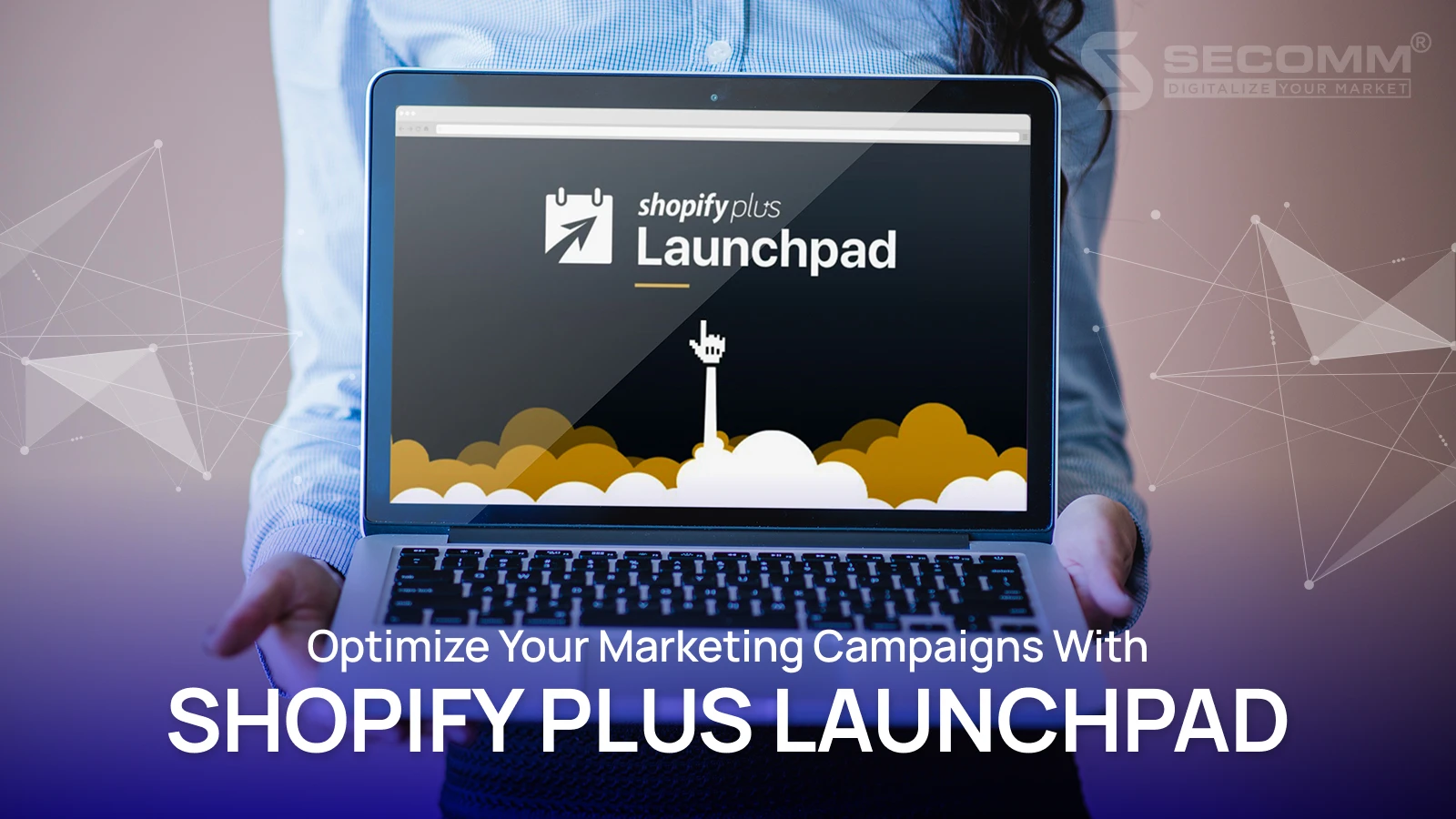
In today’s eCommerce world, staying ahead of the competition requires not only a great product but also effective tools to manage and optimize your store’s operations. Shopify, one of the leading eCommerce platforms, offers a variety of features designed to help businesses thrive. Among these is Shopify LaunchPad, a powerful tool aimed at automating and streamlining promotional events.
In this blog post, we’ll dive into what Shopify LaunchPad is, how it works, and the key features that make it a valuable asset for online store owners. We’ll also explore the benefits and drawbacks of using this tool, helping you decide if it’s the right fit for your business needs. Whether you’re planning a major sale, a product launch, or a special campaign, understanding the capabilities of Shopify LaunchPad can help you execute your strategies more efficiently and effectively.
Shopify LaunchPad is a specialized feature within the Shopify platform designed to facilitate the management and execution of promotional events for e-commerce businesses. It serves as a comprehensive toolset that allows store owners to automate the setup, scheduling, and execution of events such as product launches, flash sales, and holiday promotions.
Essentially, Shopify LaunchPad enables businesses to plan and implement their marketing strategies more efficiently by automating repetitive tasks and ensuring timely execution of events, thereby enhancing overall store management and customer engagement.
There are two common ways to utilize Shopify LaunchPad. One is creating new events, another is modifying the existing events. Let’s break it down:
To create a new LaunchPad event, you’ll follow these steps:
To modifying the existing LaunchPad events, you’ll need to:
Navigate to the LaunchPad events section in your Shopify dashboard.
Shopify LaunchPad offers a comprehensive suite of features designed to enhance the management and execution of promotional events for eCommerce businesses.
Automated Event Scheduling: LaunchPad automates the activation and deactivation of events based on preset start and end dates, eliminating the need for manual intervention and ensuring timely execution of promotional campaigns.
Event Customization: Businesses can extensively customize their promotional events within LaunchPad. This includes defining event types such as sales, product launches, or holiday promotions, setting specific start and end dates (including time zones for global campaigns), configuring discounts (whether percentage-based or fixed amounts), excluding certain products or collections, and customizing promotional messaging and banners to align with branding strategies.
Integration Capabilities: Shopify LaunchPad seamlessly integrates with other Shopify features and third-party apps. It syncs with Shopify’s inventory management to ensure accurate stock availability during promotions, integrates with email marketing tools for targeted promotional campaigns, and connects with analytics platforms to track campaign performance and customer behavior.
Performance Analytics: The platform provides robust analytics and reporting capabilities, offering insights into event performance metrics such as total revenue generated, units sold, average order value, click-through rates, conversion rates, customer acquisition cost, top-performing products, best-selling categories, and geographic sales distribution. This data empowers businesses to make data-driven decisions to optimize future promotions and marketing strategies.
Using Shopify LaunchPad offers several key benefits for eCommerce businesses:
Time-saving through automation: Shopify LaunchPad automates the entire process of setting up and managing promotional events. This includes scheduling events to start and end at specific times, activating discounts or special offers automatically, and deactivating them once the event concludes. By automating these tasks, businesses can save significant time that would otherwise be spent manually coordinating promotions.
Improved sales management: By automating event activation and deactivation, LaunchPad ensures precise control over sales periods, product launches, and promotional campaigns. Businesses can schedule events in advance, allowing for strategic planning and coordination across different channels. This capability not only improves the efficiency of sales management but also enhances the effectiveness of promotional efforts by ensuring timely execution and optimized sales strategies.
Enhanced customer experience: Streamlined and well-managed promotional events contribute directly to a better shopping experience for customers. With LaunchPad, businesses can communicate promotions clearly and effectively to their audience, reducing confusion and improving transparency. Timely execution of promotions also enhances customer satisfaction by delivering on expectations and providing a seamless shopping experience.
Reach new potential customers: Shopify LaunchPad is instrumental in helping businesses reach new audiences and expand their customer base. Whether through targeted promotions, cross-channel campaigns, or innovative marketing strategies, LaunchPad enables businesses to attract and engage with new potential customers effectively.
While Shopify LaunchPad offers significant benefits, it also has certain limitations that businesses should consider:
Dependence on Proper Setup: The effectiveness of LaunchPad heavily relies on the accurate setup of events, including dates, discounts, and promotional content. Improper configuration or oversight in setup can lead to inconsistencies in promotions or missed opportunities to maximize sales.
Analytics and Reporting Depth: While LaunchPad provides basic analytics and reporting on event performance, businesses looking for advanced analytics capabilities or deeper insights may find the built-in features somewhat limited. Integrating with external analytics tools may be necessary for more comprehensive data analysis.

Cheak, an innovative sportswear brand, leveraged Shopify LaunchPad to streamline its product launches and manage seasonal sales effectively. By scheduling product releases and flash sales in advance, Cheak was able to create buzz and anticipation among its customer base. The automation provided by LaunchPad ensured that promotions started and ended precisely as planned, enhancing the overall shopping experience and boosting sales during peak periods. By using Shopify LaunchPad, Cheak increased 20% month-on-month growth in online store traffic, 100% month-on-month rise in Malaysian expansion store visits, and reduced product launch time, from 1 week to 2 days.
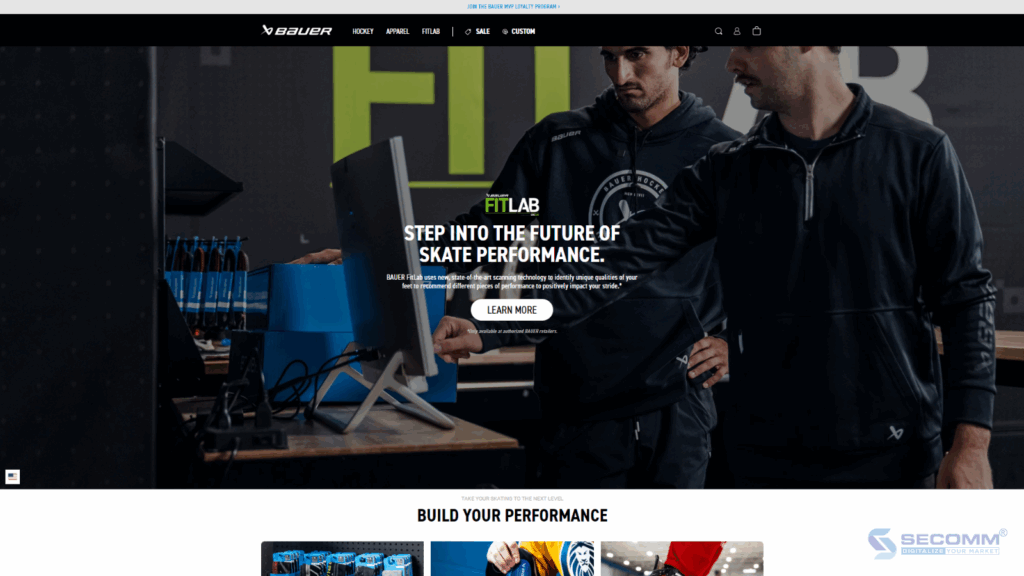
Bauer, a renowned hockey equipment manufacturer, used Shopify LaunchPad after re-platform from Salesforce Commerce Cloud to coordinate large-scale promotional events across multiple regions. By utilizing LaunchPad’s scheduling and automation features, Bauer was able to synchronize discounts and special offers for major events like Black Friday and Cyber Monday. This approach not only simplified the management of these complex campaigns but also maximized their impact, resulting in significant increases in both online traffic and sales.
Shopify Plus and the LaunchPad feature has helped Bauer with 60% revenue increase, 30% order increase, 20% cost savings, 18% conversion rate increase since moving to Shopify, within 6 months year-over-year.
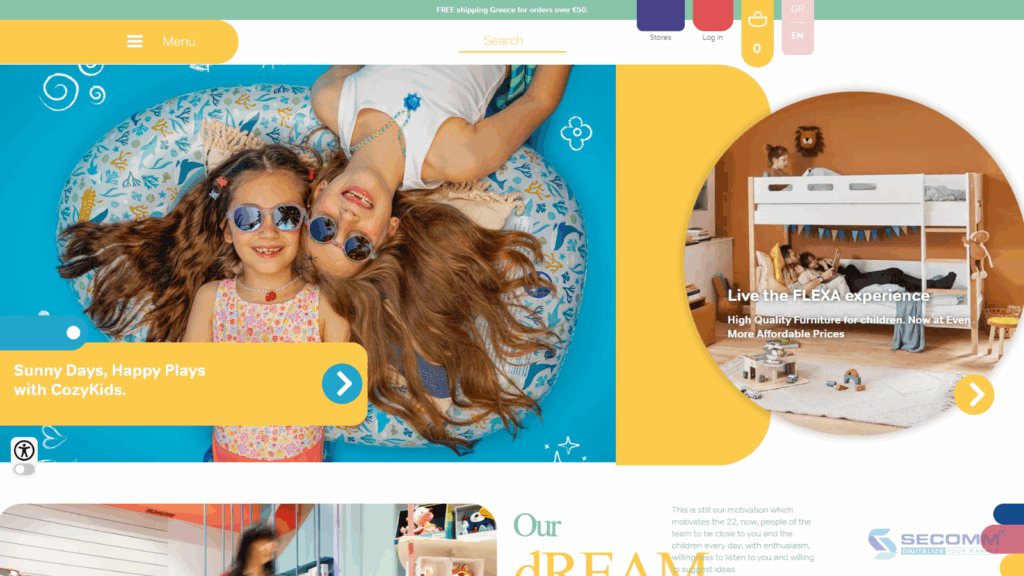
Cozykids, a popular children’s clothing retailer, implemented Shopify LaunchPad to manage its frequent sales and special promotions. The brand utilized LaunchPad to automate discount application and promotional messaging, ensuring a seamless and consistent customer experience. With LaunchPad, Cozykids could easily modify ongoing events and respond quickly to market trends, leading to improved customer engagement and satisfaction. By using LaunchPad, Cozykids has seen: 40% site traffic increased, 82% revenue increased, human error reduced and stock management efficiency increased.
Shopify LaunchPad is a powerful tool that can transform the way eCommerce businesses manage and execute promotional events. By automating event scheduling, enhancing sales management, and improving customer experiences, LaunchPad offers significant benefits. However, it also has limitations that businesses need to consider. Real-world examples like Cheak, Bauer, and Cozykids showcase its potential to drive sales and engagement effectively. Overall, Shopify LaunchPad is a valuable asset for any eCommerce store looking to streamline its promotional strategies and achieve better results.
Want to implement Shopify LaunchPad right now? Contact SECOMM for free consultation!
 92
92
 5,193
5,193
 0
0
 32
32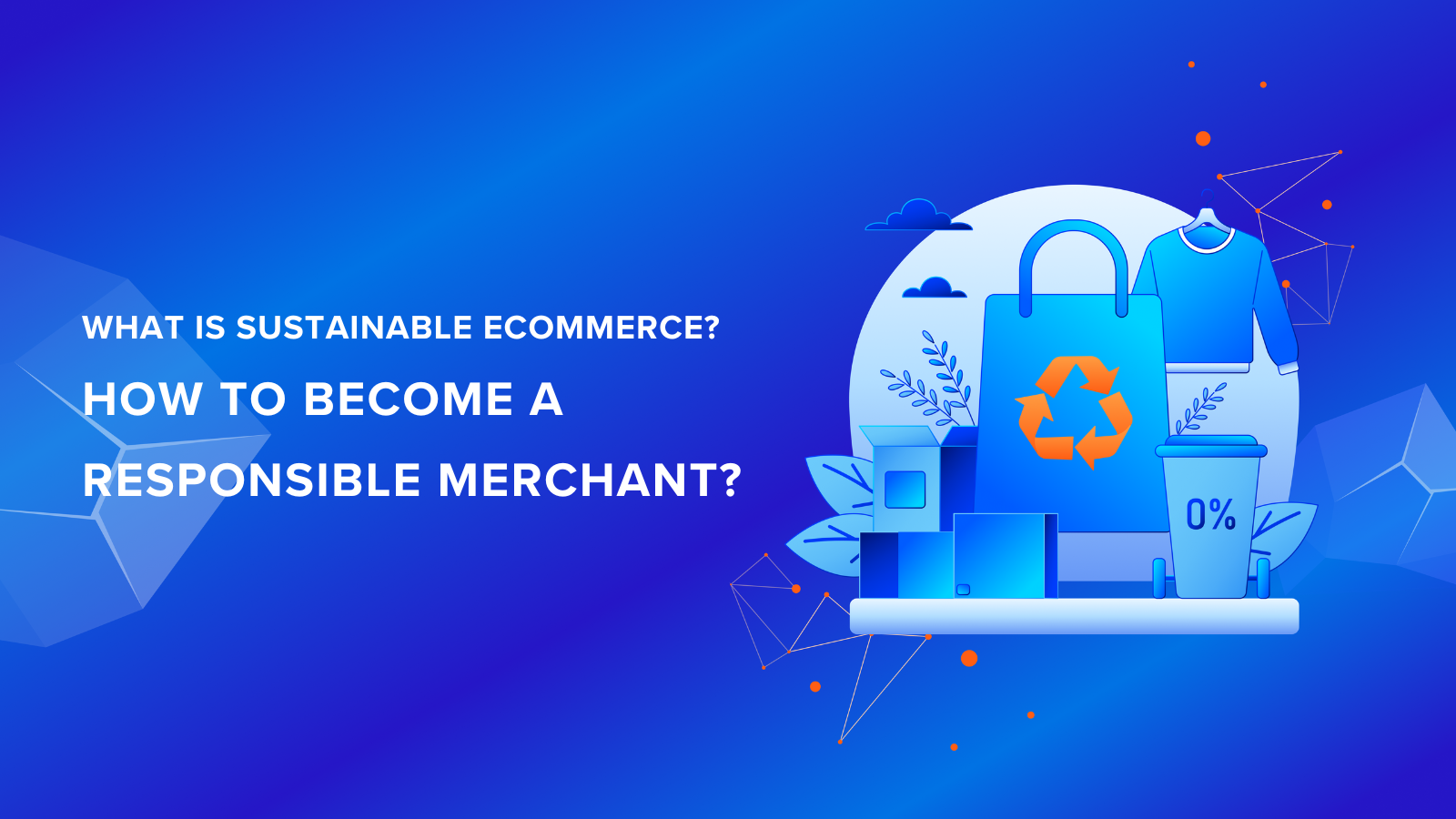
eCommerce has become an integral part of our daily lives, offering unparalleled convenience and access to a vast array of products. However, as the industry continues to grow, so does its environmental footprint. From excessive packaging waste to carbon emissions from shipping, the environmental impact of eCommerce cannot be ignored. This brings us to the concept of sustainable eCommerce—a transformative approach that seeks to minimize the negative environmental effects of online retail while promoting ethical business practices.
Sustainable eCommerce is not just a trend; it’s a response to the increasing consumer demand for environmentally friendly and socially responsible products. A survey shows that 72% of respondents reported that they were actively buying more environmentally friendly products than they did five years ago, while 81% said they expected to buy even more over the next five years.
In this blog, we will delve into the essence of sustainable eCommerce, explore its importance, examine the growing demand for it, and provide practical steps on how you can become a responsible merchant.
Sustainable eCommerce refers to the practice of conducting online business in a way that minimizes environmental impact and promotes social responsibility. At its core, it involves making mindful decisions at every stage of the business process, from product sourcing and manufacturing to packaging, shipping, and customer engagement. The goal is to reduce the carbon footprint, minimize waste, and ensure that ethical standards are upheld throughout the supply chain.
There are some common components in the eCommerce sustainability, including:
Offering products that are made from sustainable materials, are biodegradable, or have a lower environmental impact is crucial. This means choosing materials that are renewable, such as organic cotton or bamboo, over conventional materials that may deplete natural resources or cause pollution. Additionally, promoting products that are ethically sourced ensures that they are produced under fair labor conditions, respecting workers’ rights and contributing to social sustainability.
Sustainable packaging involves using materials that can be recycled, are biodegradable, or are made from recycled content. For instance, using cardboard boxes made from recycled paper or packing peanuts that are biodegradable can greatly reduce the environmental footprint. This approach not only minimizes waste but also appeals to environmentally conscious consumers.
Reducing energy consumption in the warehousing and logistics aspects of eCommerce is another critical component. This can be achieved by:
Minimizing waste throughout the entire eCommerce process is essential. This involves:
Ensuring that all business practices are ethical and transparent is fundamental to sustainable eCommerce. This includes:
By integrating these key components to strategies, eCommerce businesses can significantly reduce their environmental impact, support social responsibility, and meet the growing demand from consumers for more sustainable and ethical products.
Understanding the importance of eCommerce sustainability is crucial for businesses looking to thrive in today’s market. Here are several reasons why adopting sustainable practices in eCommerce is vital:
The environmental impact of traditional eCommerce practices is significant. From the excessive use of plastic packaging to the carbon emissions from shipping and logistics, the eCommerce industry contributes to environmental degradation. By adopting sustainable practices, businesses can significantly reduce their carbon footprint, decrease pollution, and help conserve natural resources. Sustainable eCommerce practices, such as using eco-friendly packaging and optimizing delivery routes, play a vital role in mitigating the industry’s environmental impact.
Consumer behavior is shifting towards sustainability. More and more customers are becoming environmentally conscious and prefer to purchase from brands that align with their values. Studies show that a growing number of consumers are willing to pay a premium for products that are sustainably produced and packaged. By adopting sustainable practices, eCommerce businesses can meet this demand, attract a broader customer base, and enhance customer loyalty. Being a responsible and eco-friendly brand can also differentiate a business in a crowded market.
Sustainable eCommerce practices can lead to significant business benefits. These include cost savings from reduced waste and energy consumption, improved brand reputation, and increased customer loyalty. Businesses that prioritize sustainability can also access new markets and opportunities, such as partnerships with other eco-friendly brands and certifications that can enhance credibility. Additionally, sustainable practices can lead to innovation, as companies find new ways to reduce their environmental impact and improve efficiency.
Governments and regulatory bodies are increasingly implementing stricter environmental regulations. Businesses that do not comply with these regulations risk facing fines, penalties, and damage to their reputation. By adopting sustainable practices, eCommerce businesses can stay ahead of regulatory changes, ensure compliance, and avoid potential legal issues. Proactively embracing sustainability also positions businesses as leaders in their industry, setting an example for others to follow.
Sustainability is essential for the long-term viability of businesses. As natural resources become scarcer and environmental issues become more pressing, companies that do not adopt sustainable practices may face higher costs and supply chain disruptions. By integrating sustainability into their business model, eCommerce companies can ensure they are resilient to future challenges and are better prepared for a changing market landscape. Sustainable practices also contribute to a positive corporate image, which can attract investors and stakeholders who prioritize responsible business operations.
Becoming a sustainable eCommerce business involves implementing practices that minimize environmental impact and promote social responsibility. Here are key steps to help you achieve sustainability:
Optimizing your supply chain is crucial for sustainability. This involves sourcing materials and products from suppliers who adhere to ethical and environmental standards.
Shipping is a significant contributor to the environmental footprint of eCommerce. Optimizing your shipping strategy can help reduce emissions and improve efficiency.
Packaging is a major source of waste in eCommerce. Switching to recyclable packaging can significantly reduce environmental impact.
Supporting environmental charities and initiatives can enhance your sustainability efforts and demonstrate your commitment to making a positive impact.
By implementing these strategies, your eCommerce business can significantly reduce its environmental impact, meet the growing demand for sustainable practices, and build a loyal customer base that values social responsibility. Adopting sustainability is not only good for the planet but also beneficial for your business’s long-term success.
Final words
eCommerce sustainability is no longer a luxury but a necessity. Consumers are increasingly prioritizing eco-friendly and socially responsible brands, and businesses must adapt to meet this demand. Embracing sustainable eCommerce practices, businesses can make informed decisions that contribute to a healthier planet.
 2
2
 2,168
2,168
 0
0
 2
2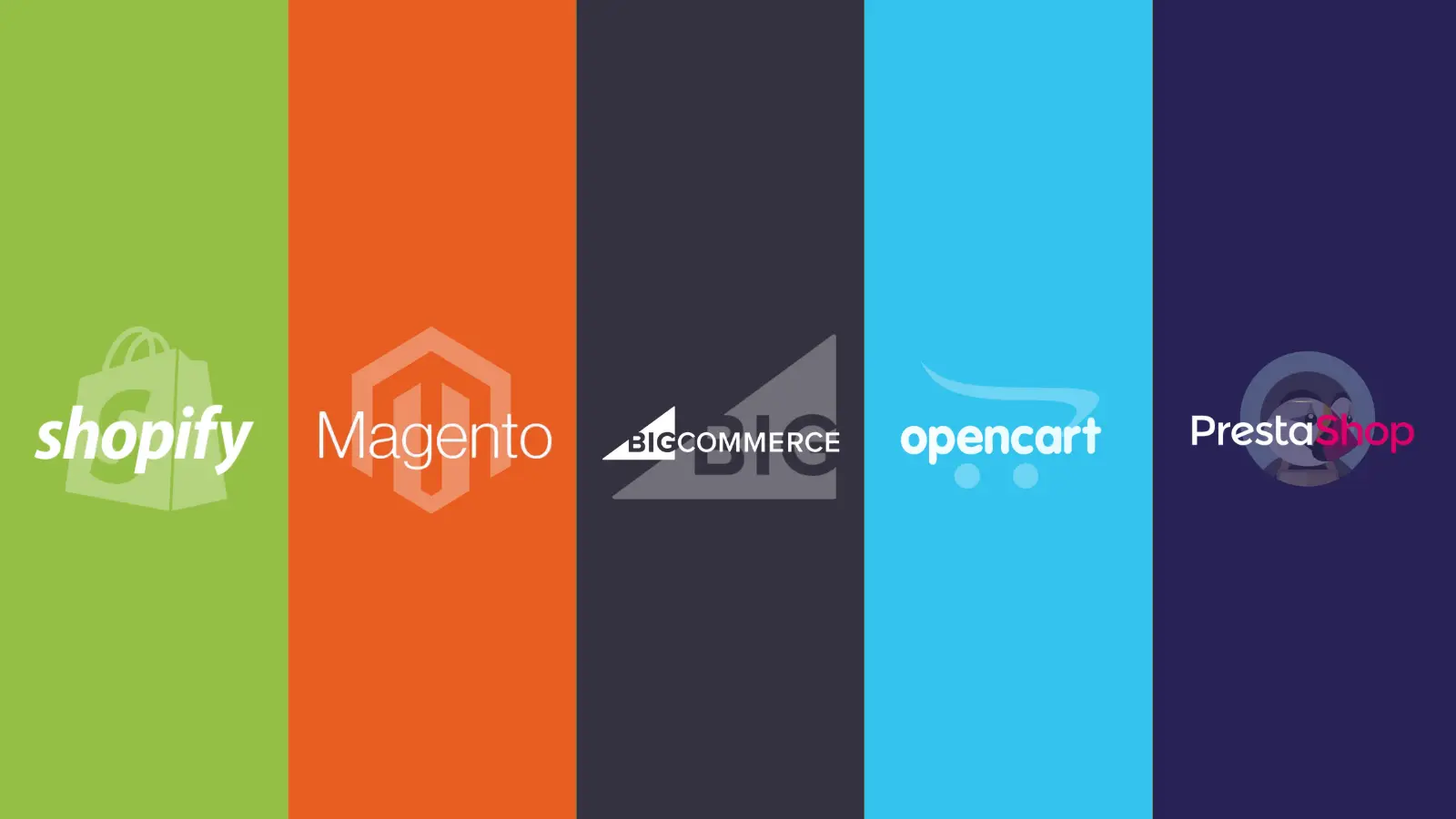
International eCommerce platforms are shaping the shopping trends of modern consumers worldwide, where geographical boundaries are no longer barriers to business activities. With the continuous development of technology and the internet, businesses have the opportunity to reach millions of customers around the globe more easily than ever. However, to succeed in the international market, choosing the right eCommerce platform is crucial.
In this article, let’s explore the top 5 platforms that effectively meet the needs of many businesses for implementing international eCommerce.
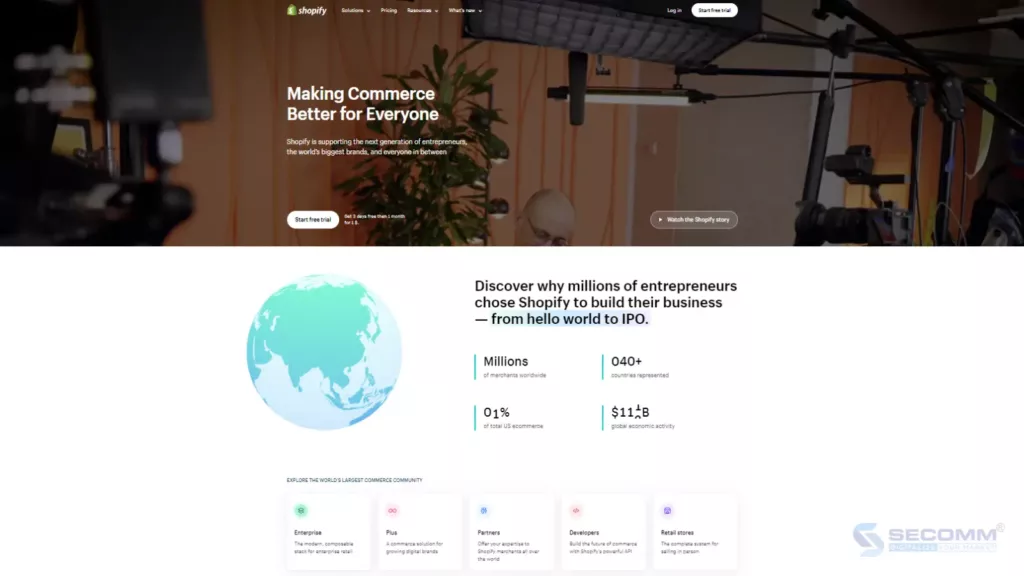
Shopify is a well-known SaaS eCommerce platform for businesses worldwide. It offers an all-in-one solution called Shopify Markets, allowing businesses to start selling in over 150+ different markets and manage efficiently on a single dashboard. Shopify Markets comes in two versions:
Integrated into all Shopify plans, providing core features including:
Fees are incurred per international transaction, including:
Includes all core features plus additional advanced features such as:
The cost of Markets Pro is 6.5% per transaction, including local payment processing fees, so businesses do not need to pay this fee separately. Additionally, businesses will pay 2.5% per transaction for currency conversion fees.
Advantages:
Disadvantages:
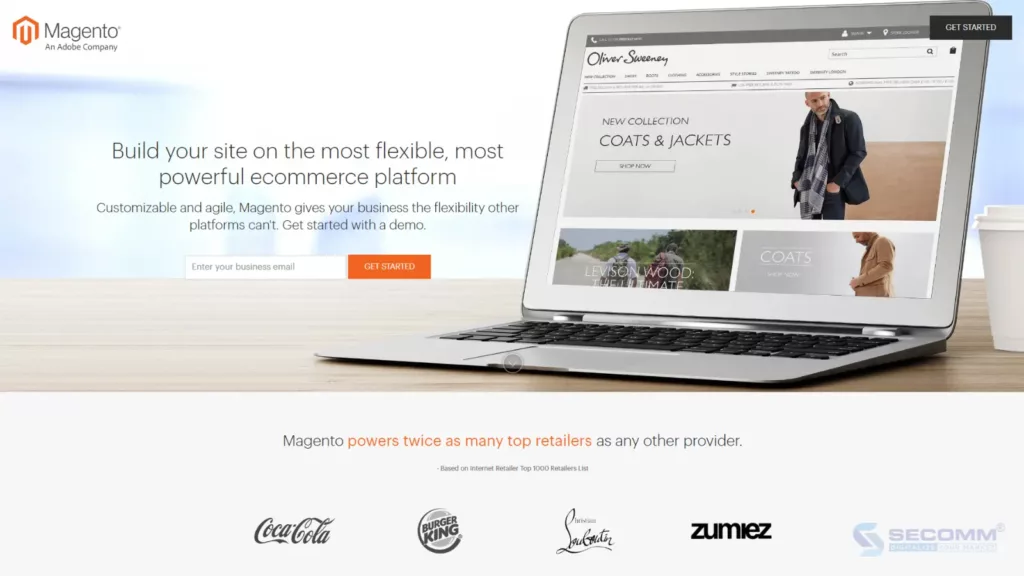
Implementing international eCommerce involves many challenges related to language, currency, and taxes, requiring websites to be optimally customized to provide the most engaging customer experience. This is why Magento is on this list.
Some standout features of Magento that support international commerce include:
Advantages
Disadvantages:
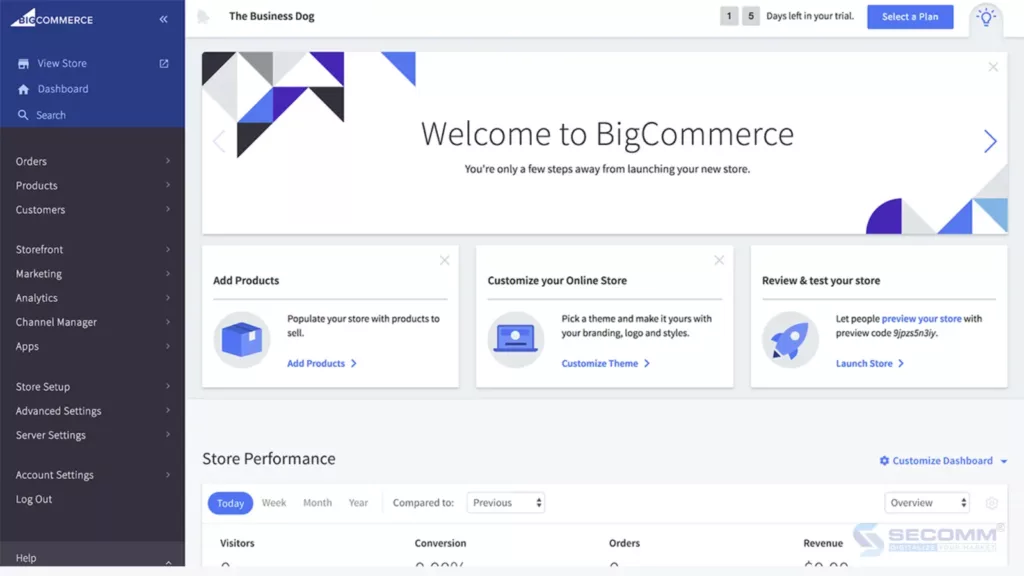
Similar to Shopify, BigCommerce is also a SaaS eCommerce platform that provides international eCommerce solutions. The platform offers features and tools to help businesses expand their operations in the international market simply and effectively.
Some standout features of BigCommerce supporting international eCommerce include:
Advantages:
Disadvantages:
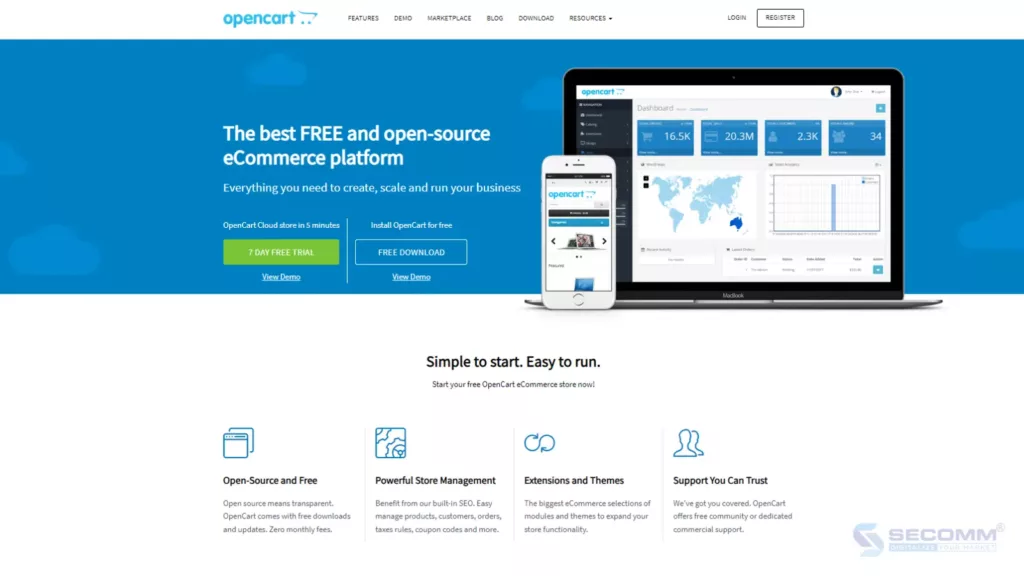
Similar to Magento, OpenCart is a popular open-source eCommerce platform used for international eCommerce implementation. This platform offers many useful features and tools, allowing businesses to better serve global customers.
Some standout features of OpenCart supporting international eCommerce include:
Advantages:
Disadvantages:
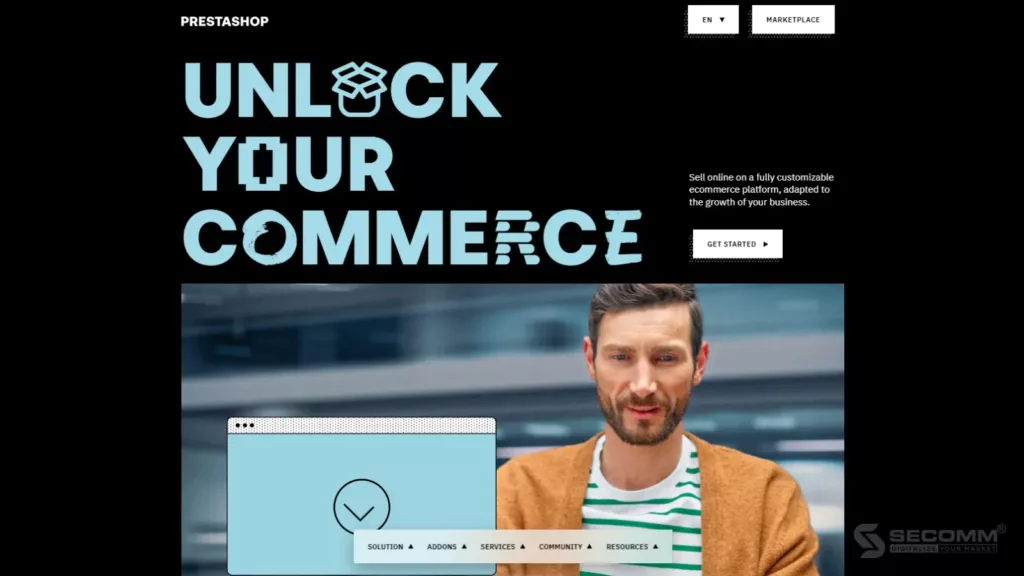
Another widely used open-source eCommerce platform for international e-commerce implementation is PrestaShop. With excellent customization and scalability, as well as outstanding tools and features, PrestaShop is the perfect choice for businesses looking to expand globally.
Some standout features of PrestaShop supporting international eCommerce include:
Advantages:
Disadvantages:
The Bottom Line
The above provides an overview of the top 5 platforms for implementing international eCommerce, each with its advantages and disadvantages. Depending on the scale, budget, and technical requirements, businesses can choose the most suitable platform for themselves.
Regardless of the choice, investing in a robust and flexible eCommerce platform will help businesses effectively reach international markets, increase sales, and expand their scale.
Need advice on implementing international eCommerce? Contact SECOMM today!
 152
152
 1,413
1,413
 0
0
 1
1
The wine eCommerce industry in Singapore is thriving, offering a wide variety of choices for consumers who appreciate fine wines and spirits from around the world. With the convenience and diversity of eCommerce websites, purchasing wine online has become easier than ever.
The following article introduces 8 leading wine eCommerce websites in Singapore, known as popular shopping destinations for modern consumers.
Paneco is one of the most beloved wine eCommerce sites in Singapore, renowned for its product quality, delivery service, and customer care. Established with the aim of providing a convenient and reliable online shopping experience, Paneco offers a rich catalog ranging from wines and spirits to specialty beers and sake.
Focusing on customer experience, Paneco chose the Spree Open Source platform to build its eCommerce website, allowing for customization and scalability. Features such as inventory display, product variations, combo purchases, and bulk buying have been optimized for customization. Paneco also implemented a loyalty program, enabling customers to register as members, earn points from purchases, and enjoy exclusive prices.
Cellarbration is an ideal destination in Singapore for wine and alcohol enthusiasts. This brand boasts an extensive collection of wines and alcoholic beverages from a wide variety of leading global brands.
Shopping on Cellarbration’s eCommerce website is highly optimized through the power of the Magento platform. Every aspect, from search functions and product browsing to checkout, is deeply customized to ensure an engaging shopping experience for customers.
Cellarbration is distinguished not only by its wide range of products but also by its professional and dedicated customer service. The brand is committed to customer satisfaction by offering personalized support and a variety of payment and delivery options.
The Liquor Shop is one of the prominent brands in the wine ommerce sector in Singapore, known for its richness and variety of high-quality imported liquors. With a mission to bring customers the finest liquor products from around the world, The Liquor Shop offers a range of options, from wines, whiskies, rums, and tequilas to unique beers and sojus.
This retailer’s liquor website is built on the infrastructure of Shopify Plus, allowing for easy customization of many features such as age verification, quick purchase, product search suggestions, and upselling prompts. Additionally, Shopify Plus’ flexible system enables integration with a range of popular payment methods such as Apple Pay, Google Pay, PayPal, Visa/MasterCard.
In Singapore, the Wine Connection brand is a favorite destination for wine enthusiasts looking to explore premium wines from the most famous wine regions worldwide. Wine Connection also offers customers a rich and diverse collection of wines.
Wine Connection’s Magento website is optimized for an enhanced experience, allowing customers to search for wines by origin, grape variety, and explore special collections, as well as choose preferred payment and delivery methods.
Not only does Wine Connection provide a modern and engaging online shopping space, but it also serves as a source of wine knowledge. Customers can find articles and detailed guides on selecting and enjoying wines to better understand the art and science behind the exquisite flavors.
Founded in 1983, Millesima is a reputable brand in the global retail wine industry, particularly renowned for its specialization in premium wines. Originating from France, Millesima has expanded its operations to many countries, including Singapore, to provide consumers with the opportunity to experience high-quality wines from renowned vineyards worldwide.
Millesima’s strength lies in its meticulous selection of wine products, ensuring high quality and clear origins. The product portfolio of Millesima includes wines from Bordeaux, Burgundy, Champagne, and many other famous wine-producing regions. Customers can find classic wines, limited editions, and even internationally award-winning bottles.
Millesima’s eCommerce wine website is elegantly designed and user-friendly, making it easy for buyers to search for detailed information about products and place orders online. Additionally, Millesima offers professional advisory services to help customers select wines that suit their preferences and needs.
Wine Fridge Singapore is a prominent brand in providing wine cabinets and related products for wine storage in Singapore. Known for professionalism and high quality, Wine Fridge Singapore specializes in offering wine cabinets from renowned brands, ensuring the ideal conditions for wine storage.
The strength of Wine Fridge Singapore lies not only in providing quality products but also in professional customer advisory and support services. They understand the needs of wine enthusiasts and collectors, providing suitable storage solutions to maintain the flavor and quality of wine over time.
The website of Wine Fridge Singapore provides detailed information about various wine cabinets, from small-capacity cabinets for personal needs to large cabinets for extensive wine collections. Some customized features include product comparisons, selecting products by size and color, quick payments with Shop Pay or Google Pay, etc.
The Wine Wholesales brand is known as a destination for purchasing high-quality wines, wine cabinets, and related accessories at attractive wholesale prices. This brand has built its reputation through product diversity and quality services, aiming to provide customers with smooth and convenient online wine shopping experiences.
The eCommerce website of Wine Wholesales is user-friendly, making it easy to search for and select products. Customers can easily find detailed information about each wine, including origin, flavor profile, and reviews from previous buyers. Additionally, Wine Wholesales regularly offers promotions and discounts, allowing consumers to purchase quality products at affordable prices.
This is a prominent name in the retail wine sector in Singapore, specializing in providing premium wines from around the world. Wines Online’s strength lies in its product diversity, ranging from wines and spirits to soju and sake, especially low-alcohol or non-alcoholic beverages.
Wines Online’s eCommerce website is built on Shopify, featuring an intuitive interface that allows customers to easily search for and select products. Wines Online Singapore is also known for its fast and reliable delivery service. They ensure that products are delivered to customers safely and on time. Additionally, Wines Online’s advisory team is always available to assist customers with any inquiries or requests, ensuring that every customer has the best shopping experience.
Wrap Up!
Here are the 8 most prominent eCommerce wine websites in Singapore. Each brand brings its own unique advantages, from product diversity and service quality to convenient shopping experiences.
Looking for advice on building an eCommerce wine website? Contact SECOMM now!
 2
2
 1,655
1,655
 0
0
 1
1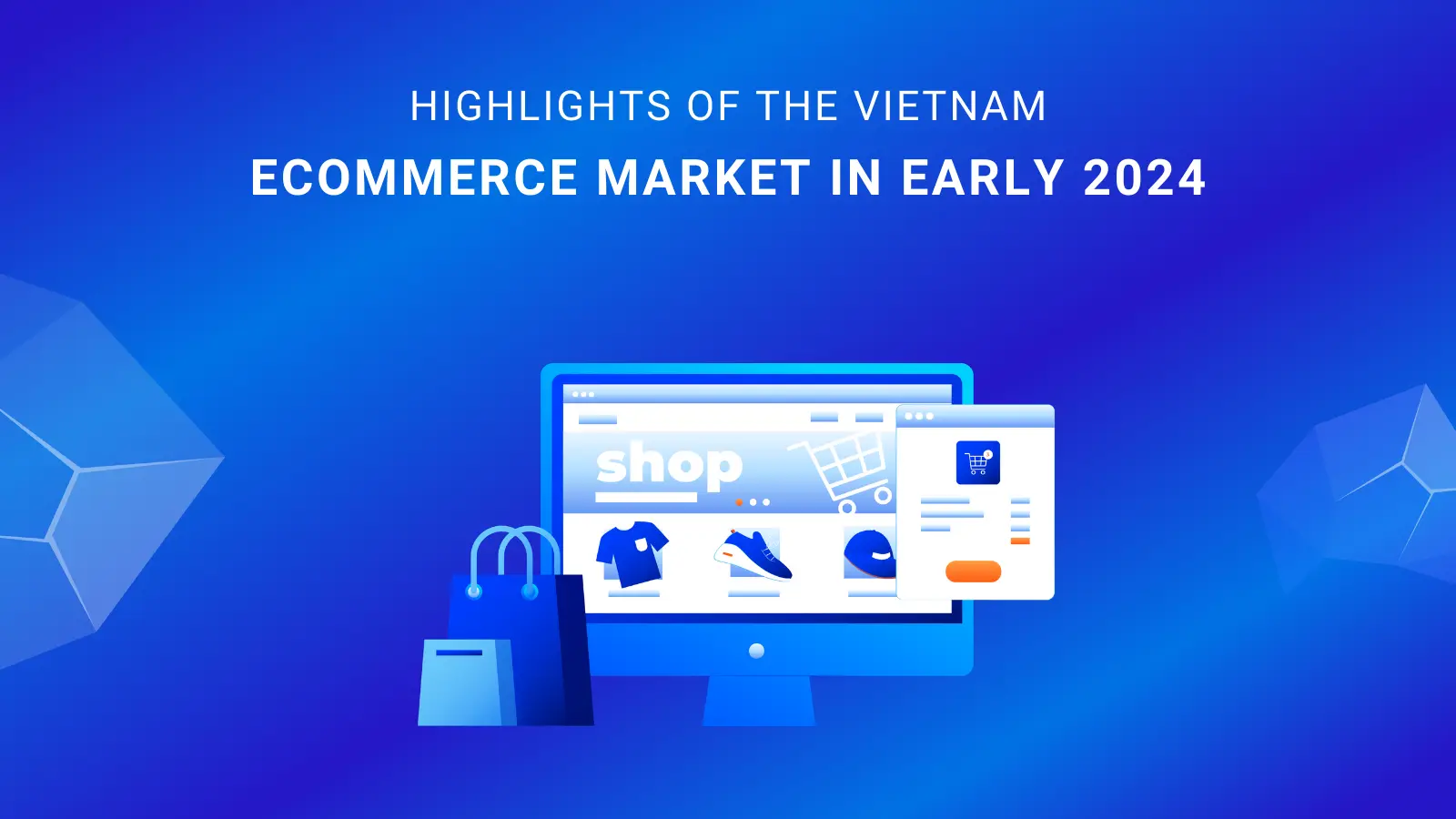
Despite the impact of inflation and economic recession on the Vietnamese economy, consumers are still willing to spend heavily on essential goods. As a temporary solution, they are turning to online shopping channels as one of the ways to deal with rising prices.
In the first two quarters of 2024, the eCommerce market in Vietnam has seen many significant fluctuations with Livestream and Short-video still maintaining their heat as evidenced by the fact that not only TikTok but also the eCommerce giant Shopee is investing heavily in video content. Let’s take a look at some of the highlights of the first few months of the year with SECOMM.
Vietnam is becoming a fertile market for eCommerce development as the demand for online shopping continues to grow. It is forecast that by 2025, eCommerce (B2B, B2C) will reach approximately $24 billion with a CAGR of 22%.
According to statistics from NIQ, there are about 60 million people nationwide using online shopping systems with an average of 3.5 million daily visits to eCommerce sites.
Among eCommerce platforms, TikTok Shop is expected to continue to grow strongly in the coming time. In the first quarter of 2024, this platform’s revenue increased by more than 239% compared to the same period last year, while Lazada showed signs of a slight decrease. Shopee is still holding the upper hand and always outperforms TikTok Shop and Lazada.
A notable point in the consumer behavior of Vietnamese shoppers is that they tend to focus on social factors (social-oriented), which means that they are interested in how products are being evaluated and promoted on communities and social networks, and from there, make purchasing decisions.
Currently, up to 90% of users intend to maintain or even increase their online shopping frequency on eCommerce platforms in the next year.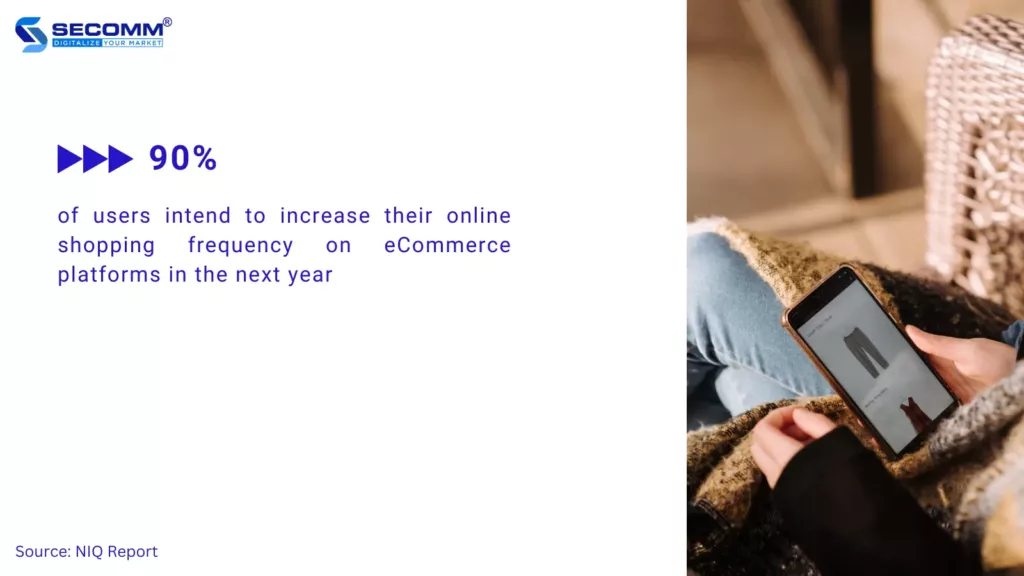
Research indicates that while price reductions and special deals are influential, they only explain 90% of consumer shopping patterns. The convenience factors offered by eCommerce, which simplifies shopping to a few quick actions on mobile devices, actually play a slightly larger role, influencing 92% of consumer choices.
This serves as a reminder for companies to prioritize their eCommerce website’s quality to enhance user experience. For instance, Vinamilk has recently revamped its brand identity and collaborated with SECOMM to refine its online system through eCommerce development services.
The Story of Vinamilk: Vinamilk & The Unprecedented Shift Using Shopify Plus
In a certain survey, only 55% of shoppers chose the shopping experience as a key determinant in their online purchasing decisions. With after-sales services such as easy returns or 24/7 customer care, sellers can easily leverage available resources to enhance the customer’s shopping experience.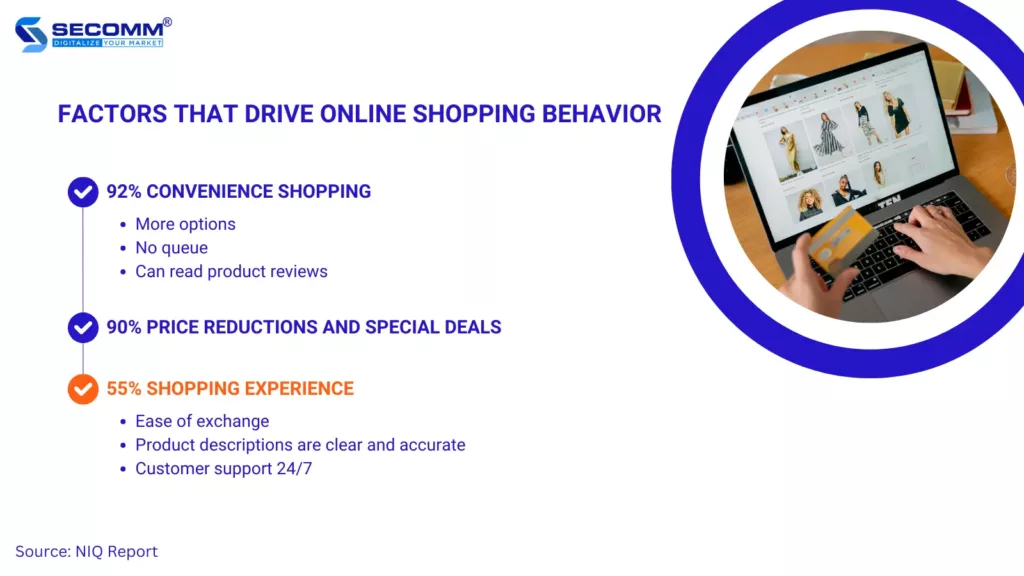
According to research from NIQ, on average, a shopper uses 3.1 different platforms within three months instead of being loyal to just one specific platform. Therefore, sellers should strengthen their presence across multiple platforms.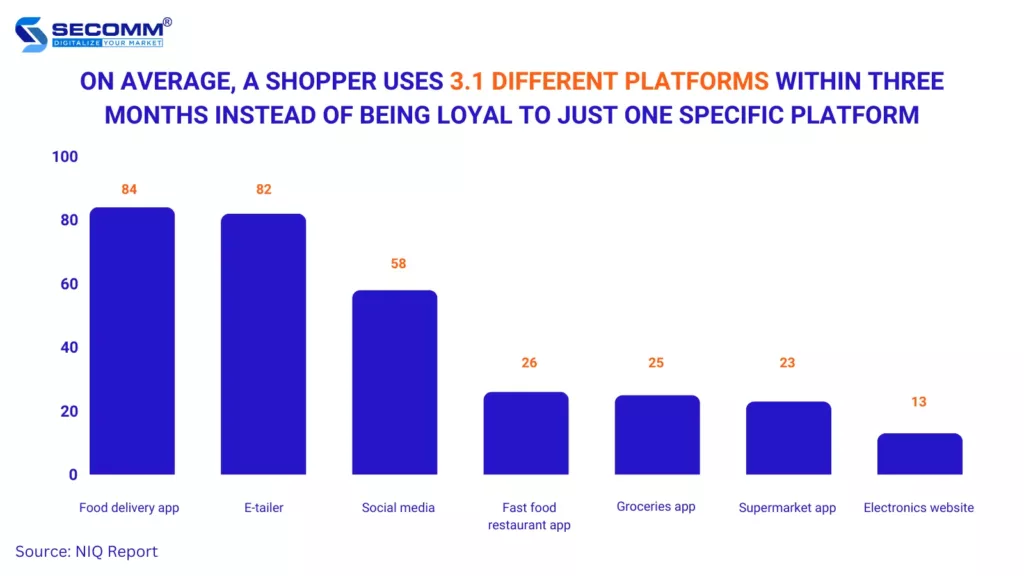
Currently, the trend of ‘Shoppertainment’ remains prevalent, with over 79% of TikTok users making purchases influenced by seller content rather than sales promotions. 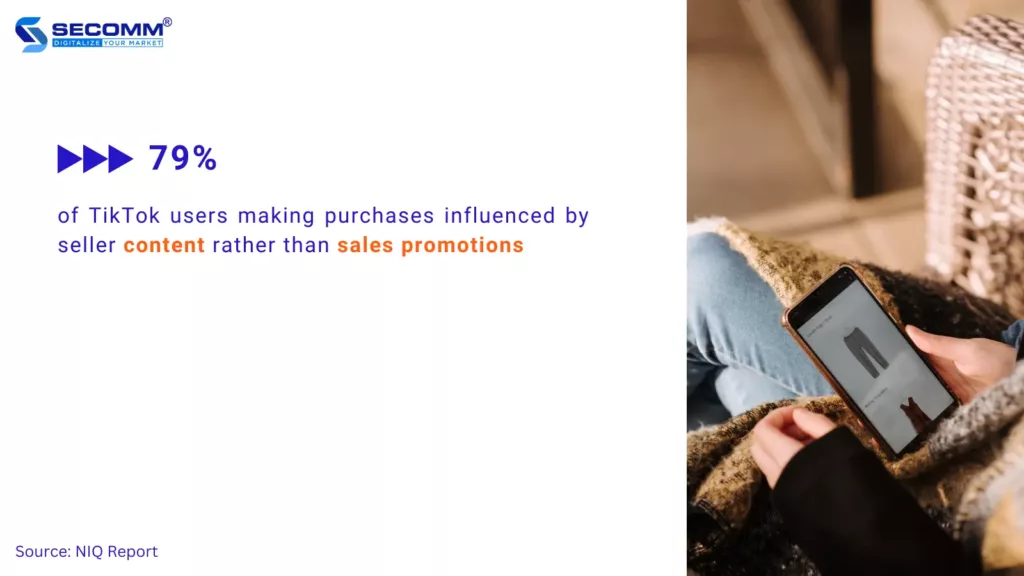
On TikTok, content creation is crucial for merchants to maintain customer engagement and push buying decisions. Ms. Trang Pham, Channel Partner Director at TikTok Vietnam, emphasizes the importance of diversity in advertising and content strategies. She warns that a lack of variety can lead to viewer fatigue.
Consequently, sellers need to understand their customer groups well to create the most suitable content for each group, limit inappropriate content, and utilize cost.
Traditional shopping methods like browsing social media or eCommerce websites are becoming less attractive. Livestreaming, however, stands out as a dynamic way to shop online.
In Q1 2024, 95% of online shoppers made purchases through livestreaming, dedicating an average of 13 hours per week watching livestreams. Statistics reveal that 85% of users prefer livestreaming because it allows direct interaction with sellers, while 81% appreciate the ability to view products in greater detail. Notably, livestreaming can drive 64% of users to purchase unintentionally.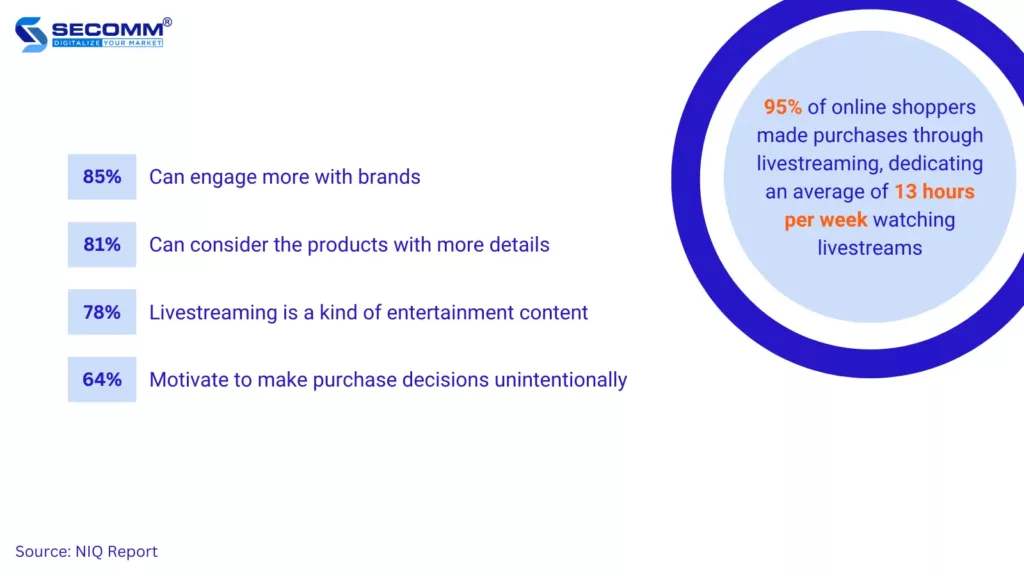
The rise of livestreaming has expanded the influence of content creators and social media influencers. Sellers can leverage these resources to build real connections with consumers. According to NIQ, approximately 50% of consumers are influenced by KOCs/KOLs when making purchasing decisions, with the personal care industry being the most impacted, as 60% of buyers in this category have changed their consumption habits.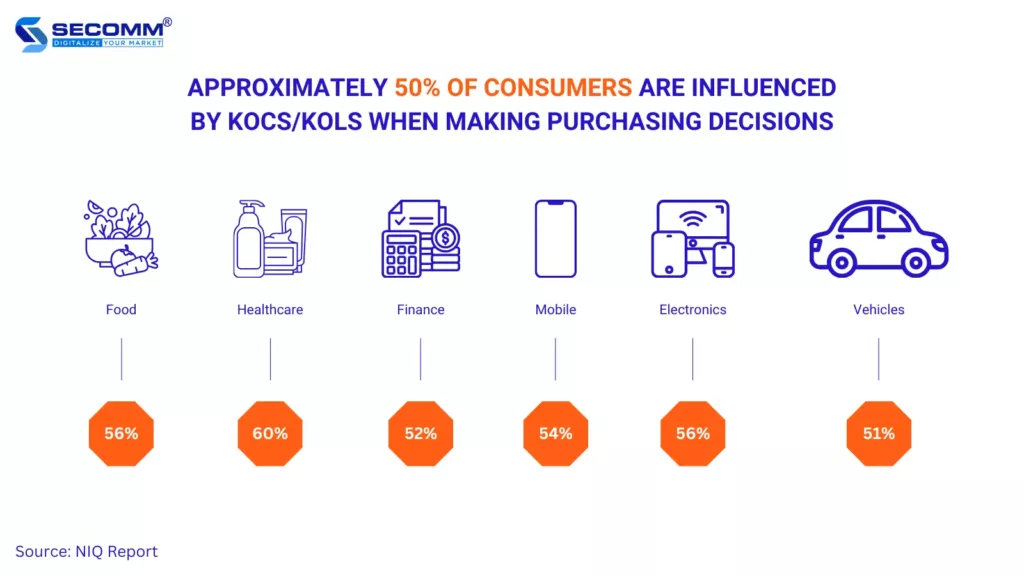
Influencers and KOCs/KOLs are valued for their trust and realness. Their shared content and insights are key in guiding customers’ buying choices. With more influencers emerging, it’s the quality of their content and real-world knowledge that helps shoppers confidently choose trusted brands online.
Online shopping platforms are advancing rapidly, focusing on innovation that puts customers first. For large businesses, along with building brand awareness, improving online stores should always be kept in mind. SECOMM is ready to help companies upgrade their eCommerce platform. Contact SECOMM for a free, detailed consultation.
 2
2
 3,188
3,188
 0
0
 1
1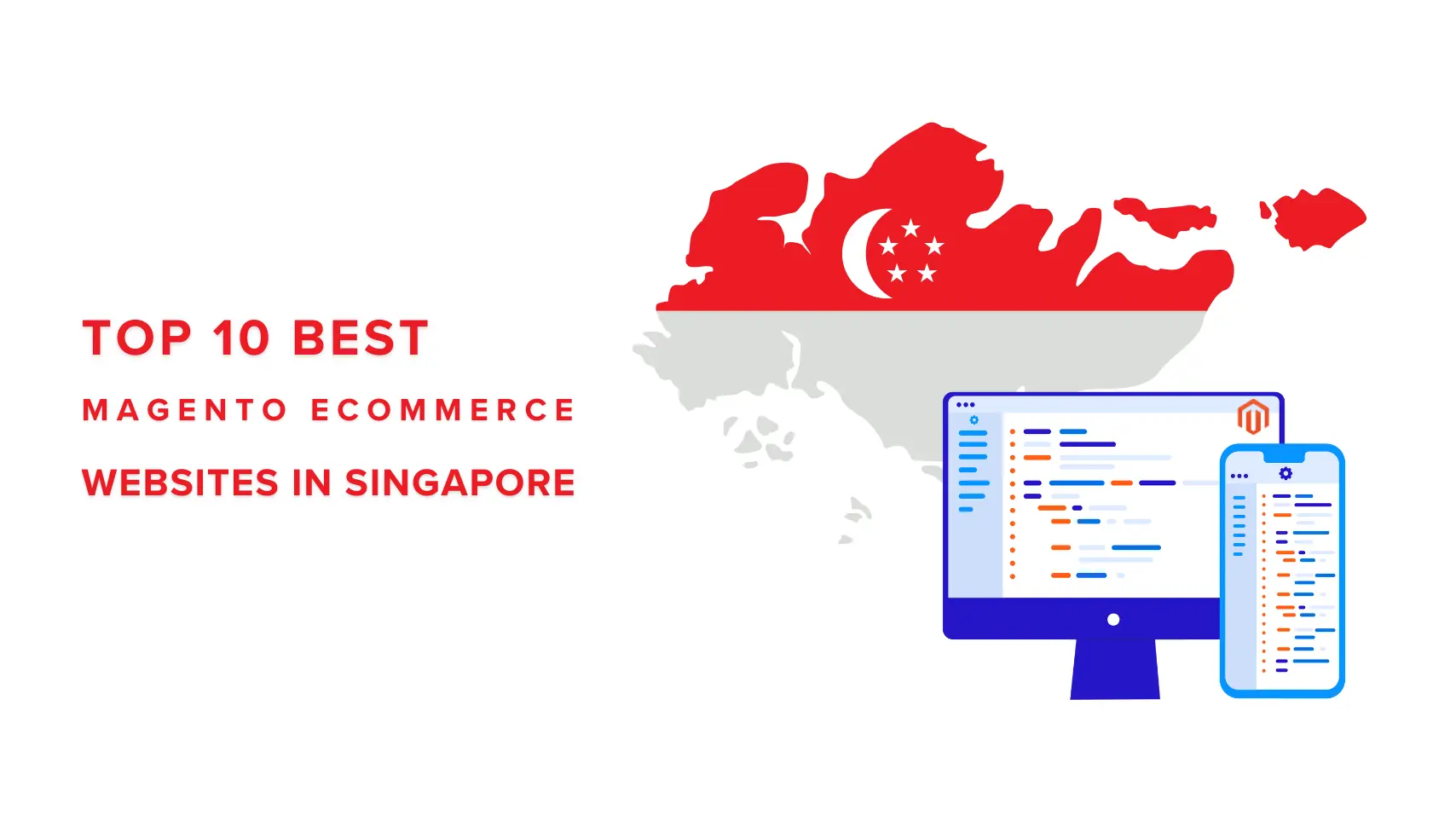
Building Magento eCommerce websites has become an undeniable trend in Singapore, where the blend of technology and creativity has brought unique and appealing shopping experiences to customers. According to Builtwith, there are currently over 600 live eCommerce websites on the Magento platform, and this list is predicted to continue expanding. This indicates that businesses in the Lion City have chosen Magento to create high-quality eCommerce websites, attracting customers and boosting sales.
In this article, let’s explore the top 10 Magento websites in Singapore that have leveraged the power of Magento to enhance the customer experience.
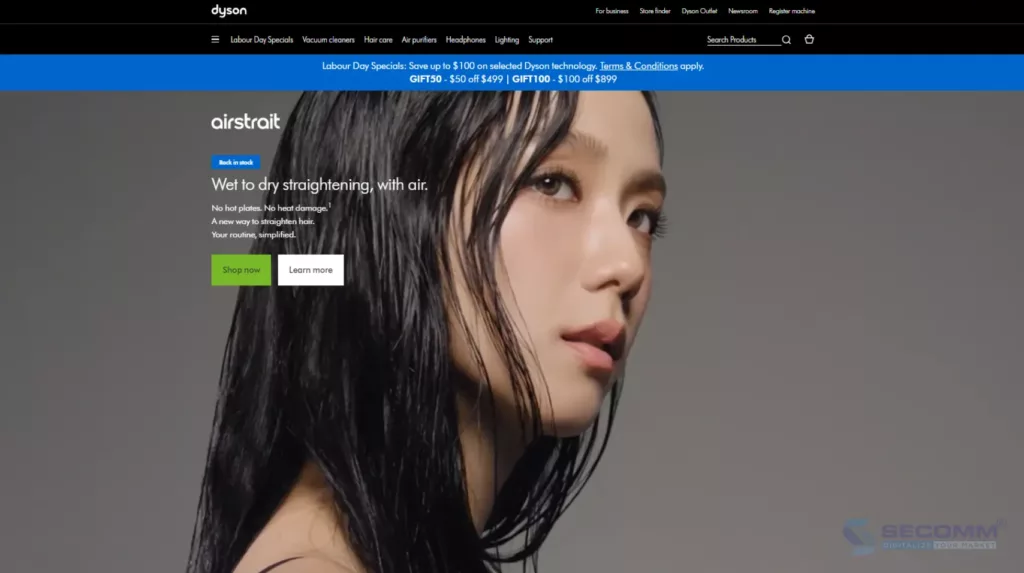
Dyson Singapore is not just an ordinary eCommerce website but also a destination for technology and premium design enthusiasts. With a range of products from vacuum cleaners to smart fans and hair dryers, Dyson continually innovates and enhances the quality of consumers’ lives.
Dyson’s Magento website is designed to provide an optimal shopping experience. From its bright and user-friendly interface to smart product search and categorization features, every detail is carefully crafted to ensure customers have the best online shopping experience. Additionally, Dyson is renowned for its excellent customer care service. From detailed product guidance to flexible return policies, they are committed to ensuring absolute satisfaction for every customer.
Website: https://www.dyson.com.sg/
Industry: Consumer Electronics
Traffic: 690,356/month
Ranking: #1,599 (Singapore) & #292,561 (Global)
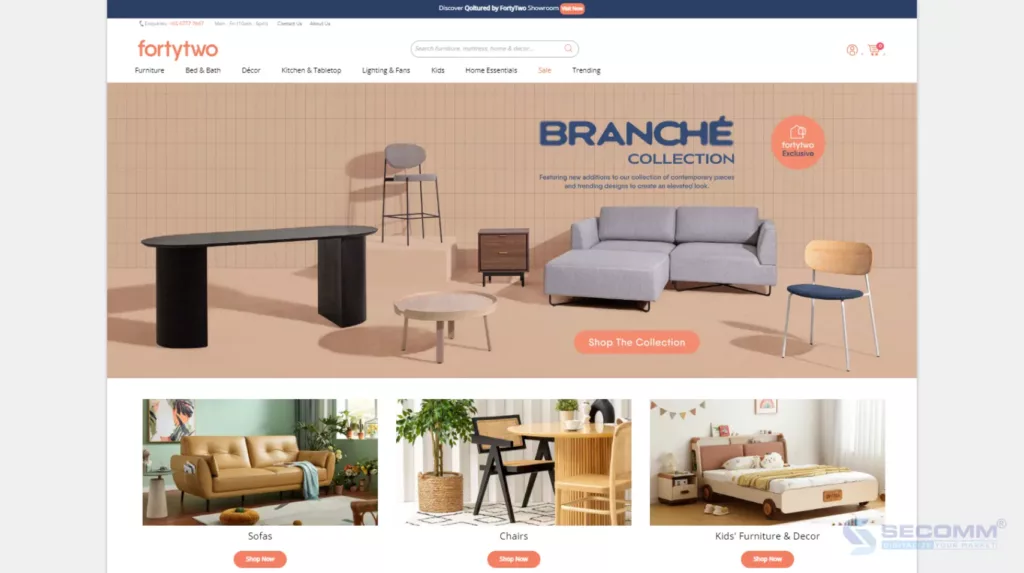
FortyTwo is one of the reputable destinations for household and interior decoration shopping in Singapore. With a diverse collection ranging from living room furniture, bedroom sets to household essentials, FortyTwo offers customers a convenient and varied online shopping experience.
FortyTwo’s eCommerce website is built on the Magento platform, focusing on creating a user-friendly interface. Not only does it display products clearly, but it also provides flexible product search and filtering features, making it easy for customers to find items that reflect their style and personal needs.
Website: https://www.fortytwo.sg/
Industry: Furniture
Traffic: 625,855/month
Ranking: #493 (Singapore) & #107,563 (Global)
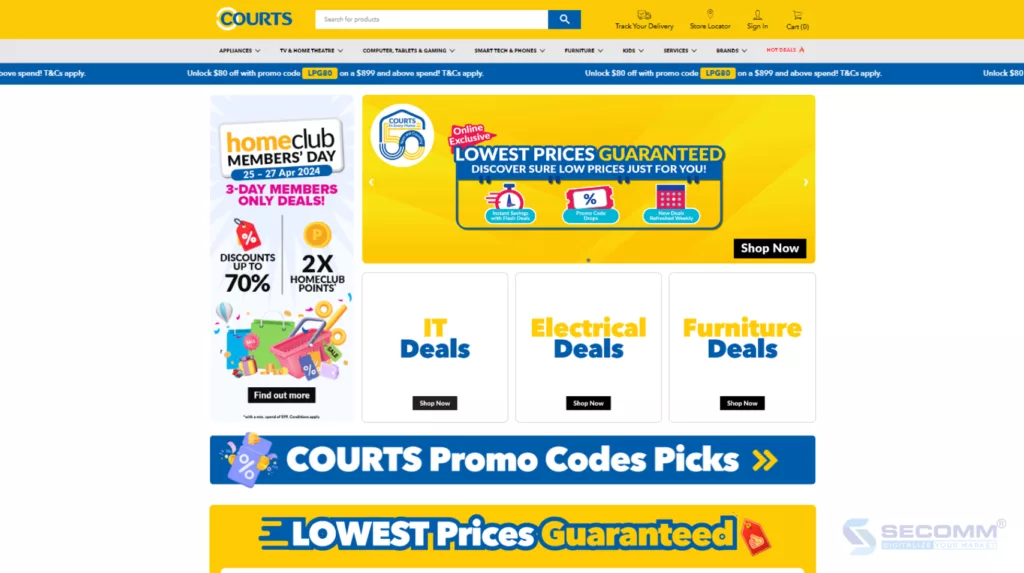
COURTS is known as the leading retailer in Singapore, specializing in a range of diverse products from furniture, electronics to household services. With over 14 stores across the island and a convenient e-commerce website, COURTS is the ideal destination for all shopping needs of Singaporean families.
COURTS’ Magento eCommerce website is designed and built to ensure an easy and comfortable online shopping experience. Through the Magento website, COURTS customers can easily search and select from a variety of high-quality products with flexible search and sorting features.
The brand stands out not only with its diverse products but also with its professional customer service. From shopping advice to delivery and installation services, they are committed to providing maximum satisfaction for every customer.
Website: https://www.courts.com.sg/
Industry: Consumer Electronics
Traffic: 510,240/month
Ranking: #502 (Singapore) & #105,498 (Global)
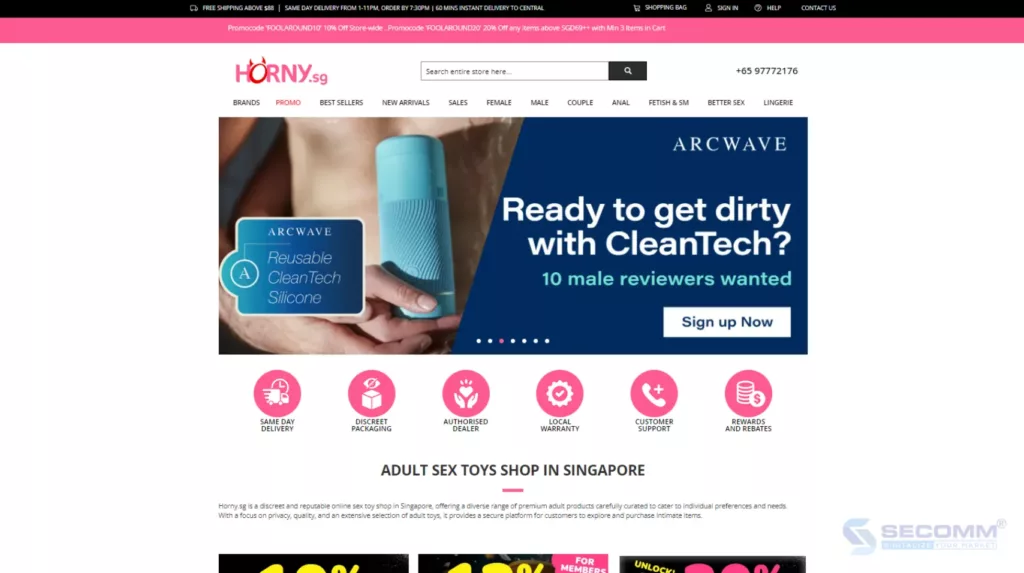
Horny is a unique eCommerce website based in Singapore, focusing on providing modern adult accessories. With a mission to help customers feel confident and satisfied in their romantic lives, Horny has created an enjoyable and convenient shopping experience through the Magento platform. Horny’s Magento eCommerce website is built with a focus on creating a reliable and user-friendly online shopping space. From attractive interface layouts to clear and detailed product displays, every detail is meticulously crafted to create the best shopping experience. Additionally, Horny stands out with the diversity of fashion and accessory products. Customers can easily find items that suit their individual needs.
Website: https://horny.sg/
Industry: Adult
Traffic: 482,417/month
Ranking: #1,133 (Singapore) & #193,753 (Global)
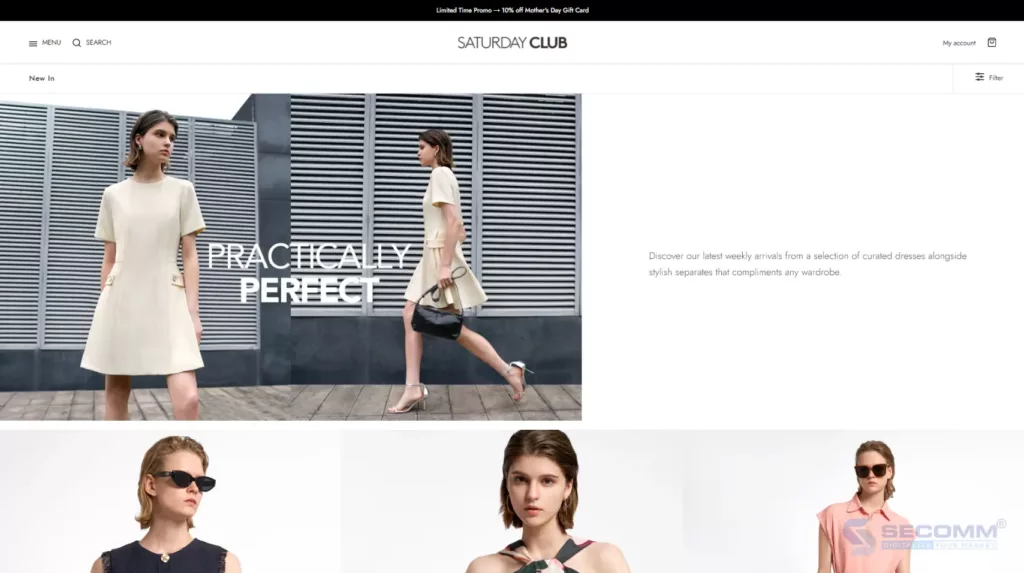
Saturday Club is not just a fashion brand but also an icon of confidence and freedom in women’s workwear fashion in Singapore. With a creative spirit and a mission to celebrate natural beauty, Saturday Club continuously brings fresh, stylish, and unique fashion collections.
Saturday Club uses Magento to develop its eCommerce website to provide customers with a smooth shopping experience with an easy-to-use interface. Customers can easily choose from a variety of products and the latest collections, with detailed information and clear images. Additionally, the brand stands out with attentive customer care service and fast and flexible delivery policies.
Website: https://sg.saturdayclub.com/
Industry: Fashion
Traffic: 406,335/month
Ranking: #2,115 (Singapore) & #240,670 (Global)
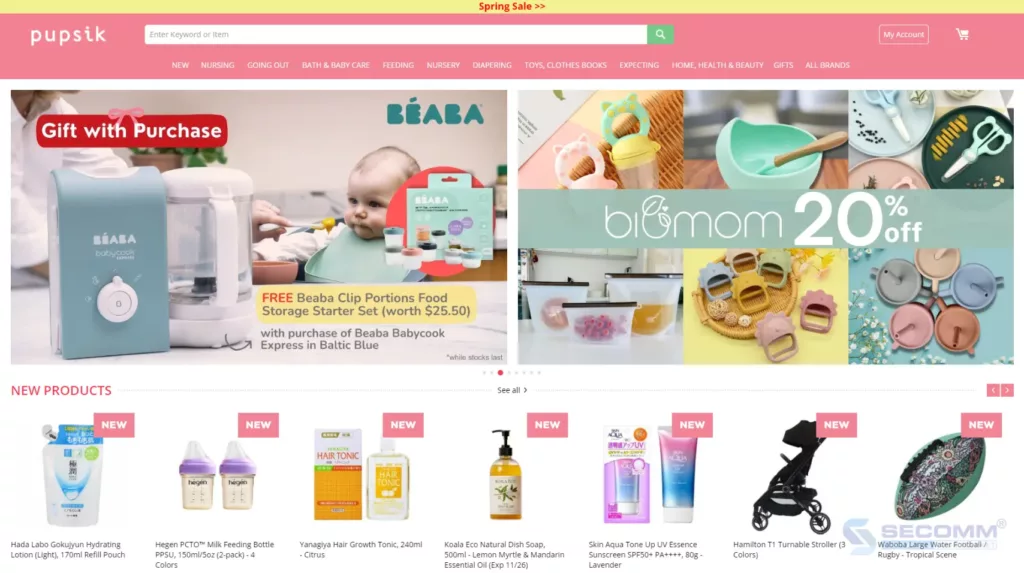
Pupsik is the go-to online shopping destination for parents in Singapore, where they can find everything they need for the care and nurturing of their children. With a humane mission and special attention to the needs of families, Pupsik is committed to providing a peaceful and convenient shopping experience.
Pupsik has built its Magento website to easily customize features and shopping experiences. From smart search features to product filtering and optimized checkout pages, every detail is focused on ensuring shopping becomes easy and quick.
In particular, Pupsik is famous for the diversity and quality of products for children and mothers. From clothing, toys to everyday essentials and healthcare products, they ensure that all family needs are comprehensively met.
Website: https://pupsik.sg/
Industry: Childcare
Traffic: 264,148/month
Ranking: #3,684 (Singapore) & #677,191 (Global)
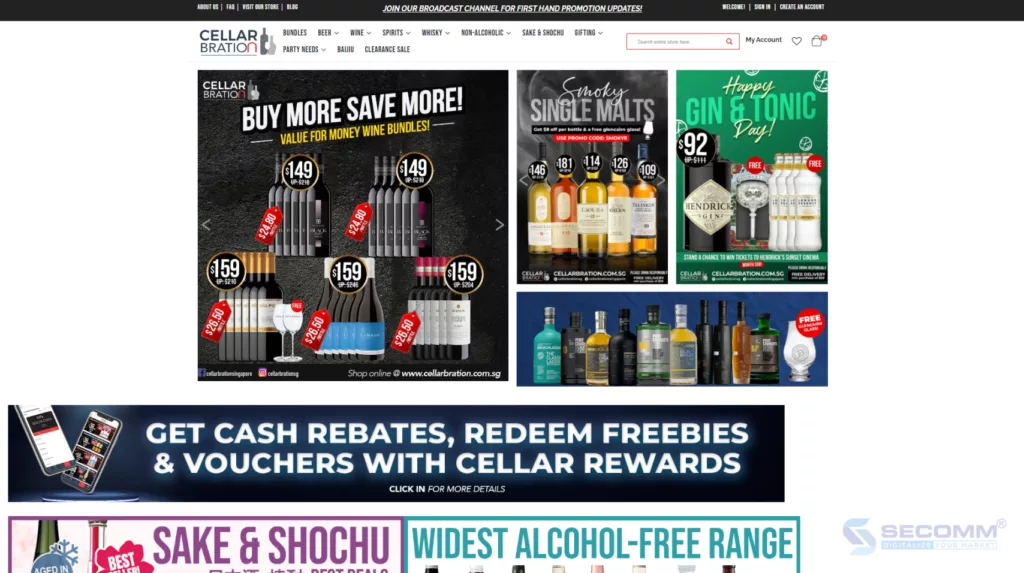
Cellarbration is the ideal destination in Singapore for wine and alcoholic beverage enthusiasts. This brand boasts an extensive collection of wines and alcoholic beverages from top brands worldwide.
Shopping on the eCommerce website is also efficiently optimized by Cellarbration through the power of the Magento platform. From search operations to product browsing and payment, everything is deeply customized to ensure customers have a more engaging shopping experience.
Not only prominent for the richness of products but also for professional and dedicated customer service. Cellarbration is committed to customer satisfaction by providing personalized support and diversifying payment options as well as delivery.
Website: https://cellarbration.com.sg/
Industry: Wine
Traffic: 125,878/month
Ranking#6,676 (Singapore) & #1,075,981 (Global)
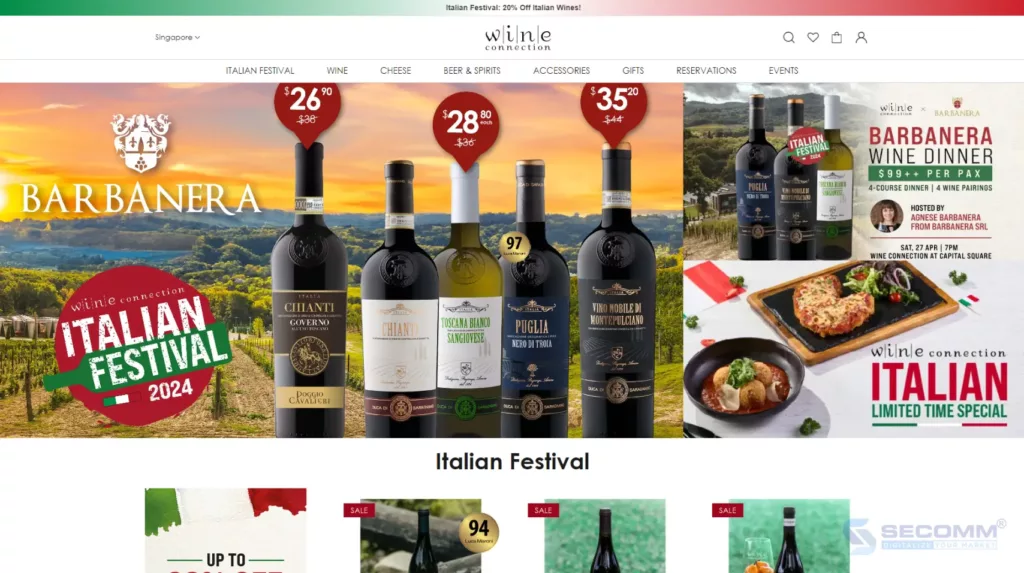
In Singapore, the Wine Collection brand is a favorite destination for wine enthusiasts who want to explore premium wines from the most famous wine regions in the world. Wine Collection also offers customers a rich and diverse collection of wines.
The Wine Collection’s Magento website is customized to optimize the experience, allowing customers to search for wines by origin, grape variety, explore special collections, and choose preferred payment and delivery methods.
Not only does it provide a modern and engaging online shopping space, but Wine Collection also serves as a source of wine knowledge. Customers can find articles and detailed guides on how to choose and enjoy wine to better understand the art and science behind the delicate flavors.
Website: https://wineconnection.com.sg/
Industry: Wine
Traffic: 82,788/month
Ranking: #12,447 (Singapore) & #1,701,444 (Global)
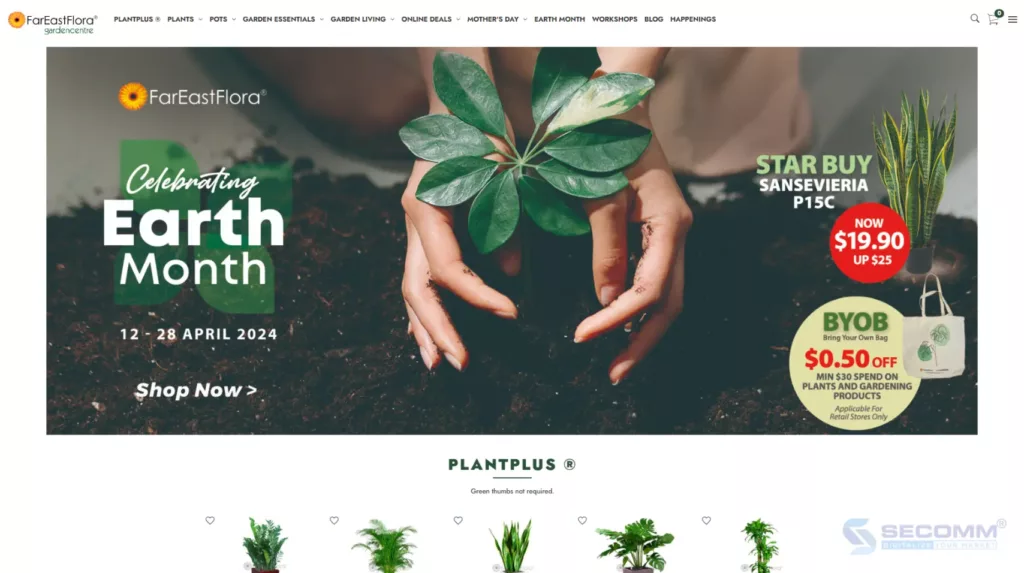
Far East Flora is a brand specializing in providing plant products, fresh flowers, and decorations made from greenery. The Far East Flora Magento eCommerce website is built with a priority on customer experience through a user-friendly interface and deeply developed and customized features. Customers can search for plants by filtering by type, size, and make quick payments with just one page. Additionally, Far East Flora’s fast and reliable delivery service is highly rated by customers. The brand is committed to delivering quality products to customers’ hands safely and promptly, helping them decorate living spaces beautifully and meaningfully.
Website: https://fareastfloragarden.com/
Industry: Gardening
Traffic: 40,864/month
Ranking: #20,995 (Singapore) & #2,327,136
(Global)
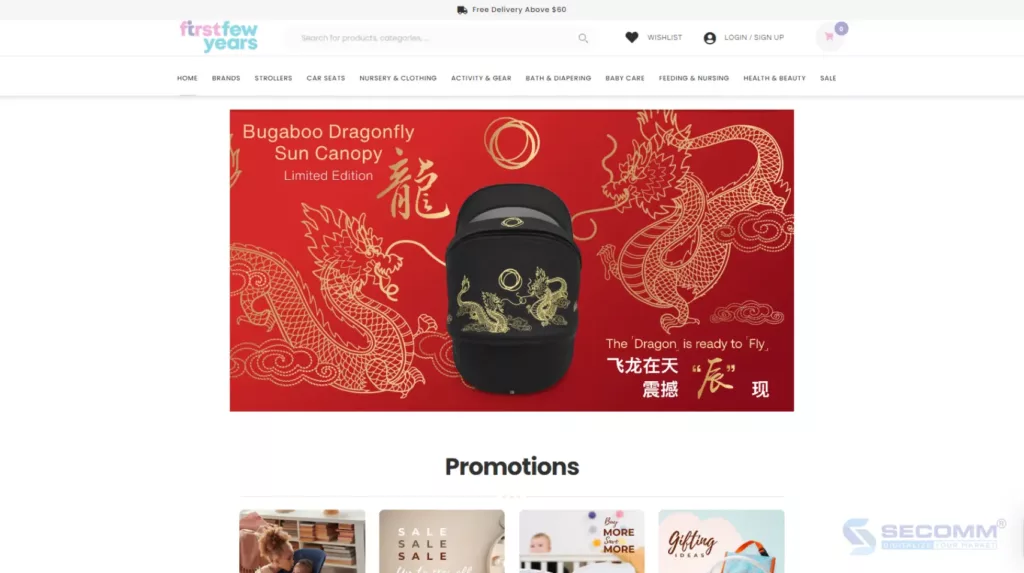
First Few Years is not just a store but also a loyal companion for parents in the journey of caring for their children from the early years. With a dedicated spirit and profound understanding of children’s needs, First Few Years provides a meaningful and trustworthy shopping experience.
The Magento website of this brand is not only a place for shopping but also an important source of information and support for parents. From advising on safe toy selection and development to sharing experiences in childcare, all information is conveyed sincerely and meticulously.
Website: https://firstfewyears.com.sg/
Industry: Childcare
Traffic: 10,245/month
Ranking: #86,167 (Singapore) & #7,519,723 (Global)
The Bottom Line
Above are 10 leading Magento eCommerce websites in Singapore, each providing customers with a unique and memorable shopping experience. From product diversity to professional customer service, each website has prioritized the mission of serving and satisfying customers.
Need more advice to build your first Magento website? Contact SECOMM today!
 2
2
 1,521
1,521
 0
0
 1
1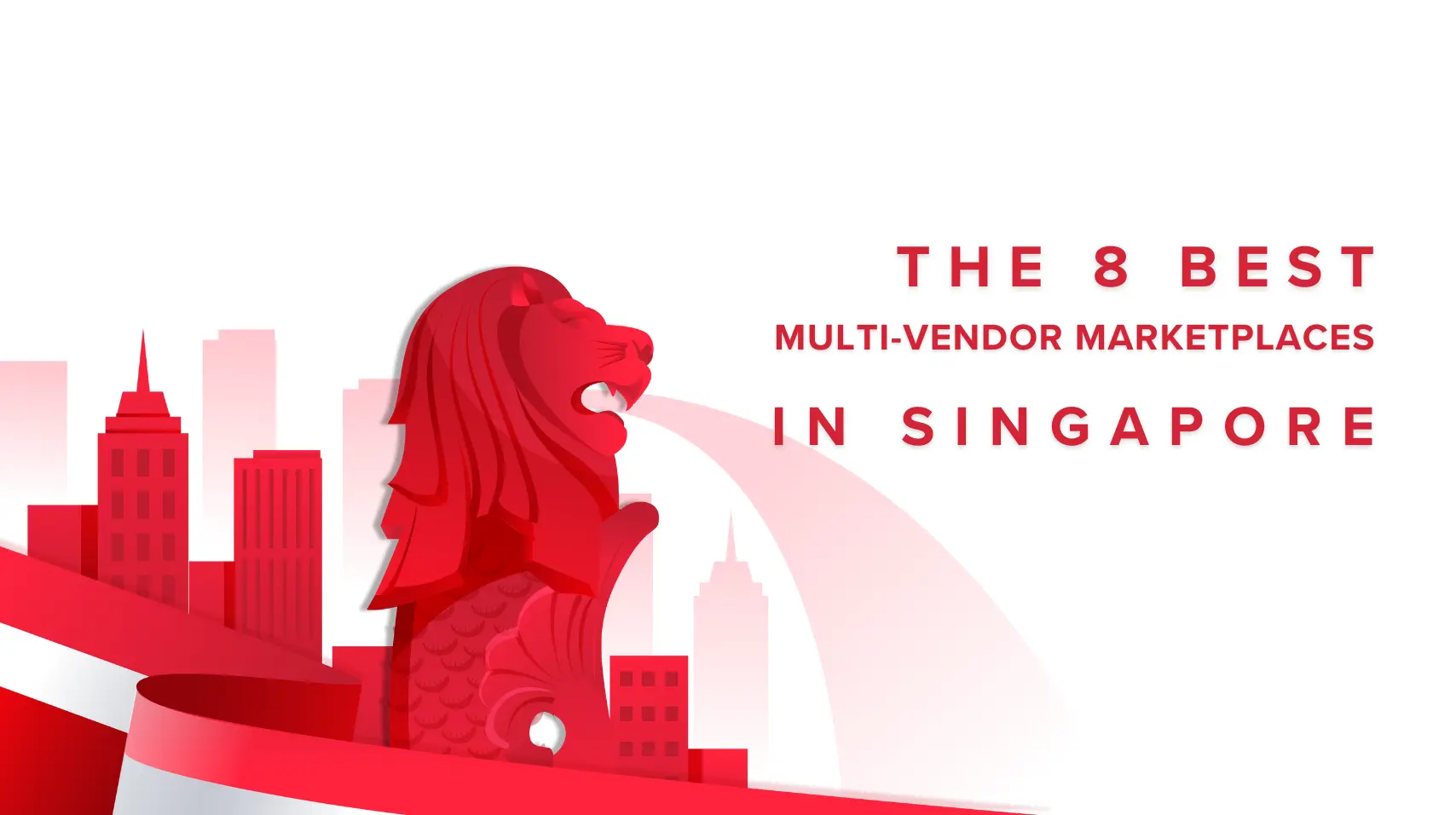
The Singapore multi-vendor marketplace market is booming, with stiff competition from Western giants like Amazon and eBay, as well as trusted local brands such as Shopee and Lazada. Statista reports that in 2023, the industry’s revenue reached $4.45 billion and is projected to hit $5 billion in 2024 and $8.2 billion by 2029. In this context, identifying and understanding the leading online marketplaces in Lion City is crucial for maximizing potential and opportunities in this rapidly evolving market.
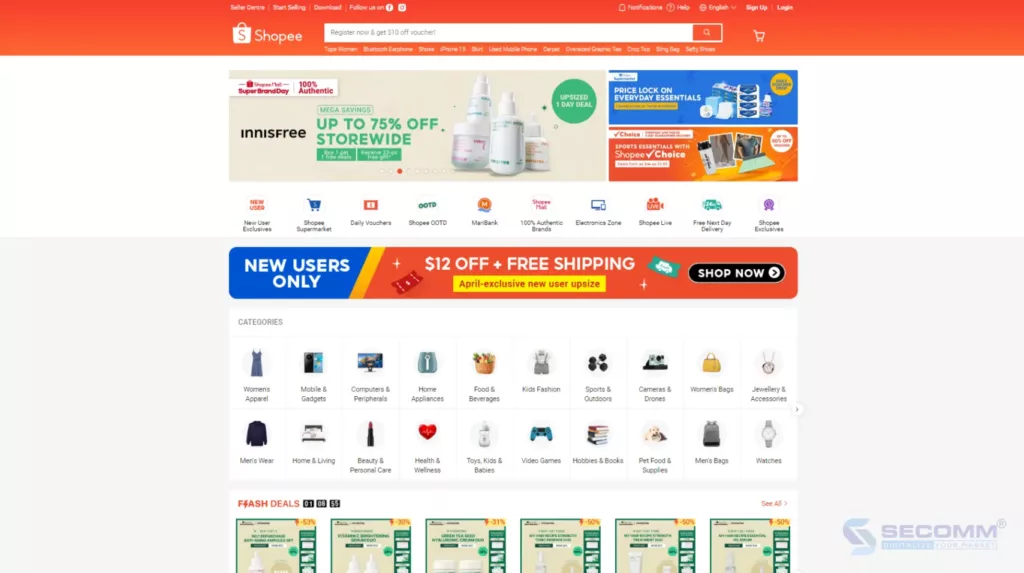
Shopee Singapore is one of the leading multi-vendor marketplaces not only in Singapore but also throughout the Southeast Asia region. The range of products available for purchase and sale on the Shopee platform is quite diverse, spanning from consumer goods to fashion, electronics, toys, and much more. Shopee Singapore is renowned not only for its convenience and flexibility in the online shopping process but also for its attractive promotional programs and fast delivery services. With its open and user-friendly business model, the eCommerce marketplace has become a popular destination for people looking for quality products at reasonable prices.
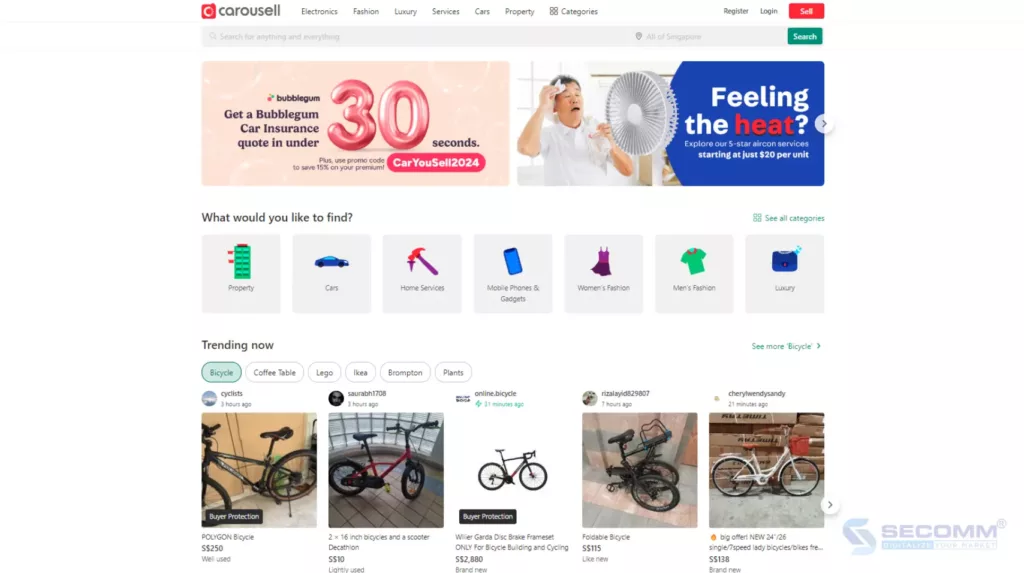
Carousell, a well-known online marketplace based in Singapore, offers a stylish and personalized online shopping experience. It specializes in enhancing the buying and selling process both on its website and mobile app. What makes Carousell stand out is its wide range of unique items available. Beyond just new products, Carousell also serves as an eCommerce marketplace for secondhand items, spanning from clothing and electronics to household goods. This creates an engaging shopping environment for those in search of one-of-a-kind items or looking to recycle goods.
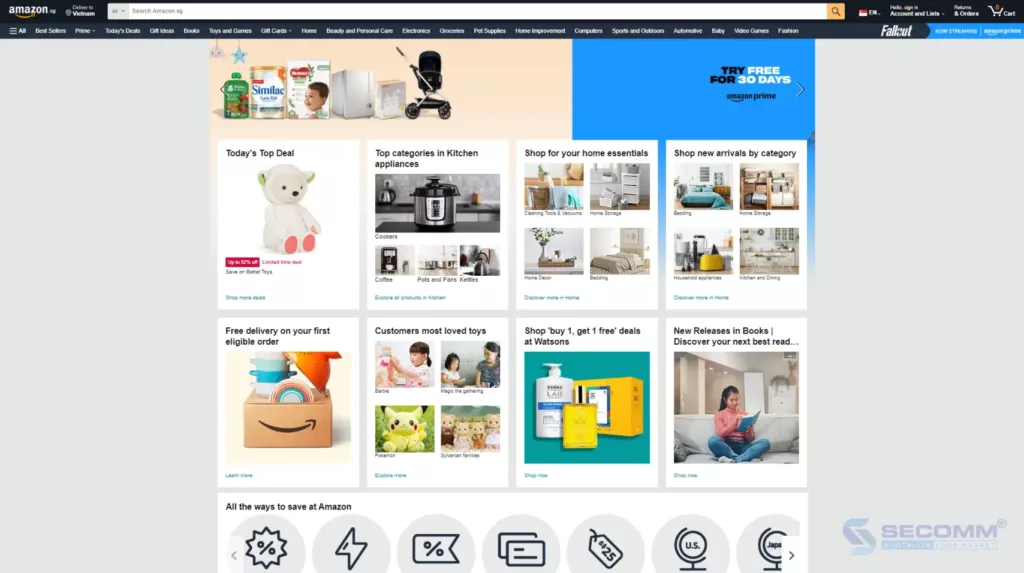
When expanding into the Singapore market, retail giant Amazon brought a top-notch and diverse online shopping experience to local customers. With an extensive array of products spanning from consumer electronics to books, fashion, household items, electronics, and cosmetics, Amazon serves as the preferred destination for customers seeking quality and variety.
A key strength of this multi-vendor marketplace lies in its reliable shipping infrastructure and customer service. With a widespread distribution network and efficient delivery services, Amazon ensures convenient and prompt product deliveries for buyers. Additionally, Amazon’s customer support service is highly regarded, as the company strives to address inquiries and issues from both sellers and buyers promptly and effectively.
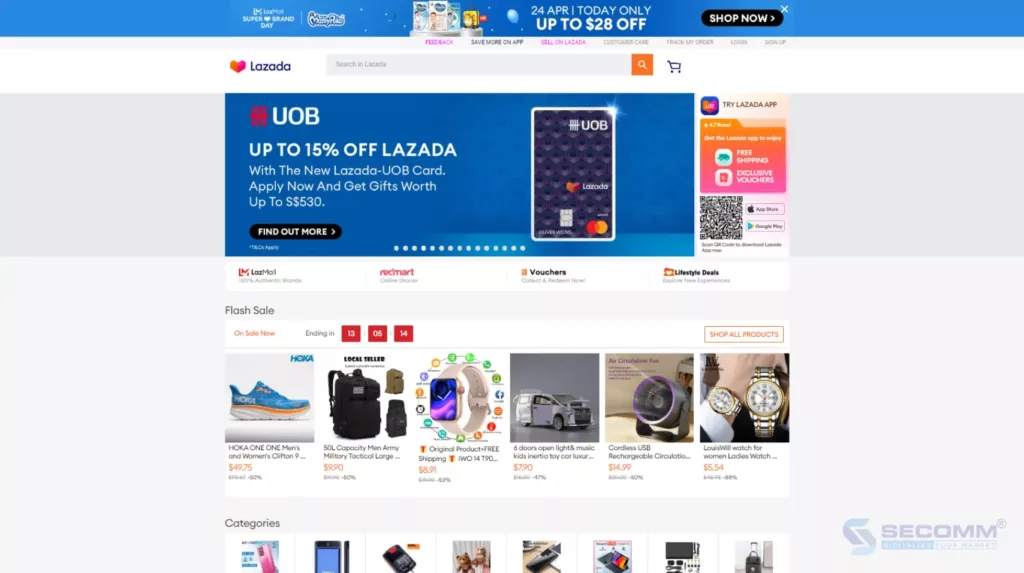
Lazada is one of the major players in the eCommerce world, winning over the trust of Singaporean consumers with its diverse range of services and products. Since being acquired by Alibaba, Lazada has experienced significant growth and strengthened its position in the Southeast Asian market. Today, Lazada serves not only as a platform for major brands but also as a gateway for small and medium-sized enterprises to enter the market effectively. Moreover, the online marketplace is renowned for its enticing promotional offers and swift delivery services. The incorporation of labels like “LazMall” and “LazGlobal” further simplifies the process for customers to discover and purchase quality products from brands worldwide.
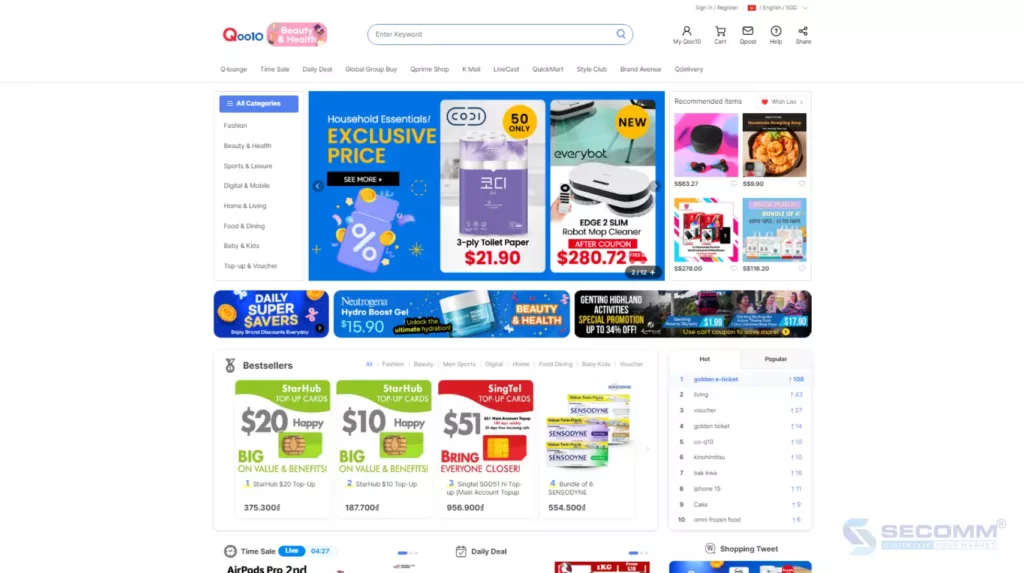
Qoo10, also known as Gmarket, stands as one of Singapore’s most popular and reliable eCommerce marketplaces. With its diverse range of online storefronts, Qoo10 offers users a stylish and varied online shopping experience.
A standout feature of Qoo10 is its emphasis on products from small and medium-sized retailers. Rather than focusing solely on major brands, Qoo10 provides a platform for small and medium enterprises to easily and effectively access the market. This creates a welcoming and diverse shopping environment where buyers can discover unique and high-quality products from smaller manufacturers and brands.
Moreover, the online marketplace is well-known for its appealing promotional programs and fast delivery services. The user rating and feedback system further bolsters trust and transparency in the online shopping process on this platform.
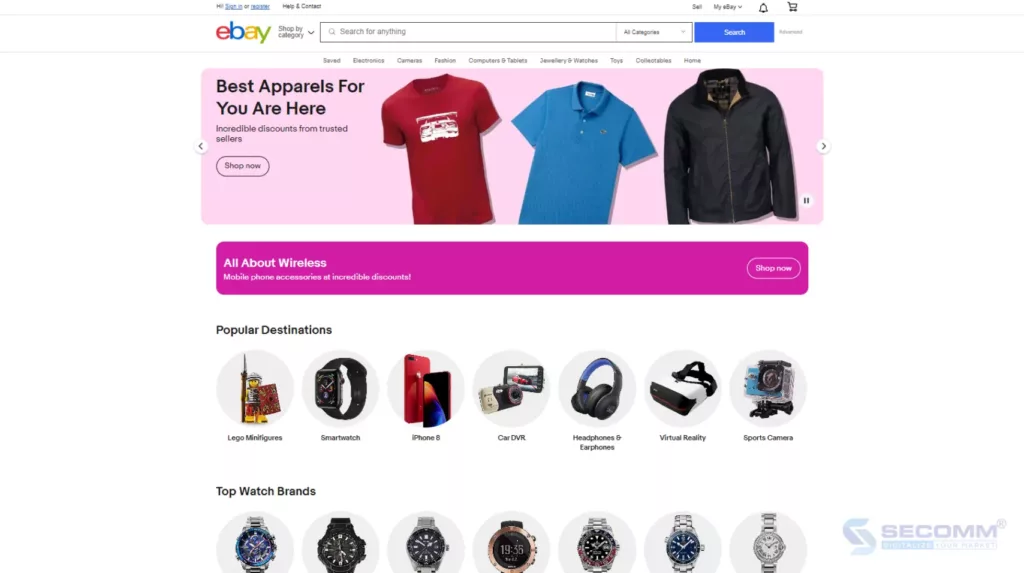
eBay is a well-established and trusted name in the global eCommerce landscape. It has won over Singaporean consumers with appealing and efficient online shopping experiences. eBay Singapore is renowned for its ability to connect buyers and sellers worldwide, creating a vast global online marketplace. With millions of items available for sale on the platform, ranging from brand-new to gently used products, customers can easily discover items that suit their needs and budgets.
Furthermore, the multi-vendor marketplace offers customers flexibility in payment and delivery options. Customers can opt for popular payment methods like PayPal or credit cards and also take advantage of international shipping services to have their purchases delivered directly to their doorstep.
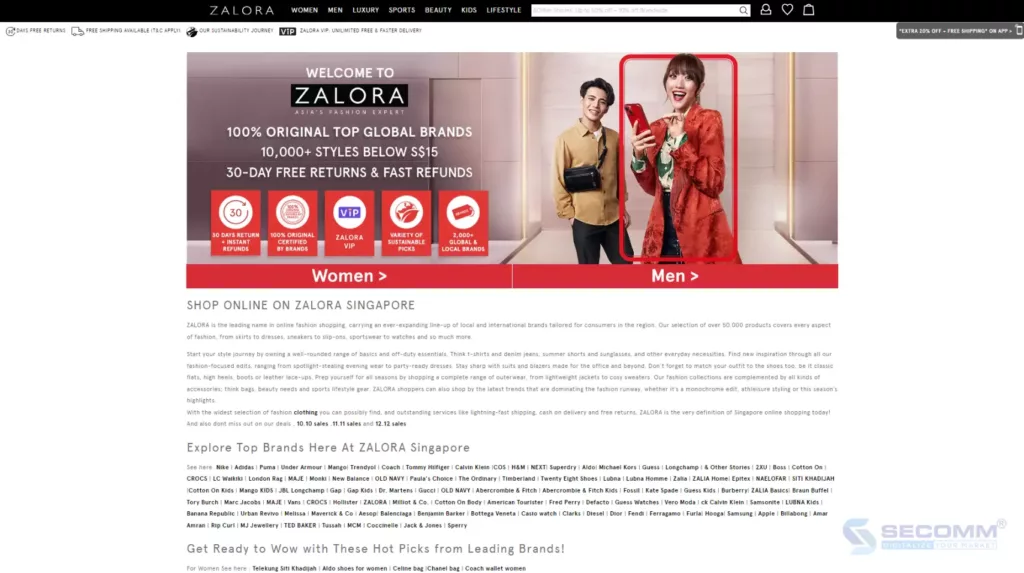
Zalora is a popular multi-vendor marketplace in Singapore, offering fashion and style products from both local and international brands. With its diverse array of items spanning from apparel, footwear, and accessories to jewelry and cosmetics, Zalora has become the go-to destination for fashion enthusiasts seeking to express their unique style. What sets Zalora apart is its dedicated focus on the fashion and style market, delivering users a flawless online shopping experience in this realm. Beyond just a platform for purchasing products from renowned brands, the eCommerce marketplace serves as a hub for individuals to explore and cultivate their style.
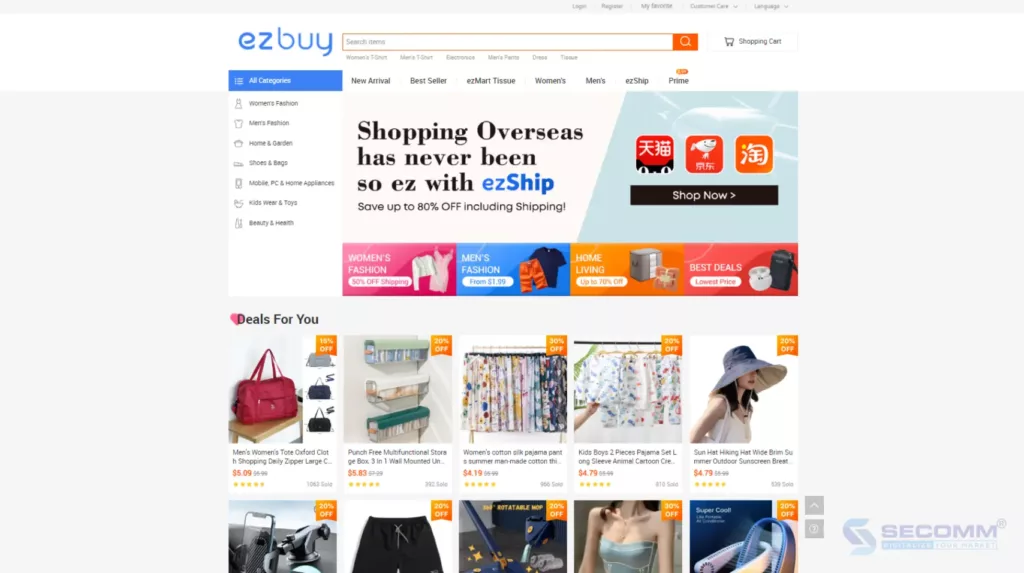
The online marketplace EZbuy is renowned for its convenient and cost-effective international shopping services. With EZbuy, customers can easily access and purchase hundreds of thousands of products from China, Korea, the US, and many other countries at reasonable prices with convenient shipping services.
Operating as an intermediary shopping model, the EZbuy eCommerce marketplace helps users circumvent complications related to import taxes, international shipping fees, and complex customs procedures. Instead of handling these procedures themselves, users can effortlessly shop for products from overseas through EZbuy and conveniently await delivery at home.
In summary, the Singapore eCommerce market is thriving with a variety of top-tier multi-vendor marketplaces. Each platform offers unique features and the best services to meet the shopping needs of customers. The success of these giants serves as motivation for many businesses to join and lays the groundwork for further development of the eCommerce market in Singapore in the future.
Need more advice for multi-vendor marketplace development? Contact SECOMM today!
 16
16
 2,449
2,449
 0
0
 10
10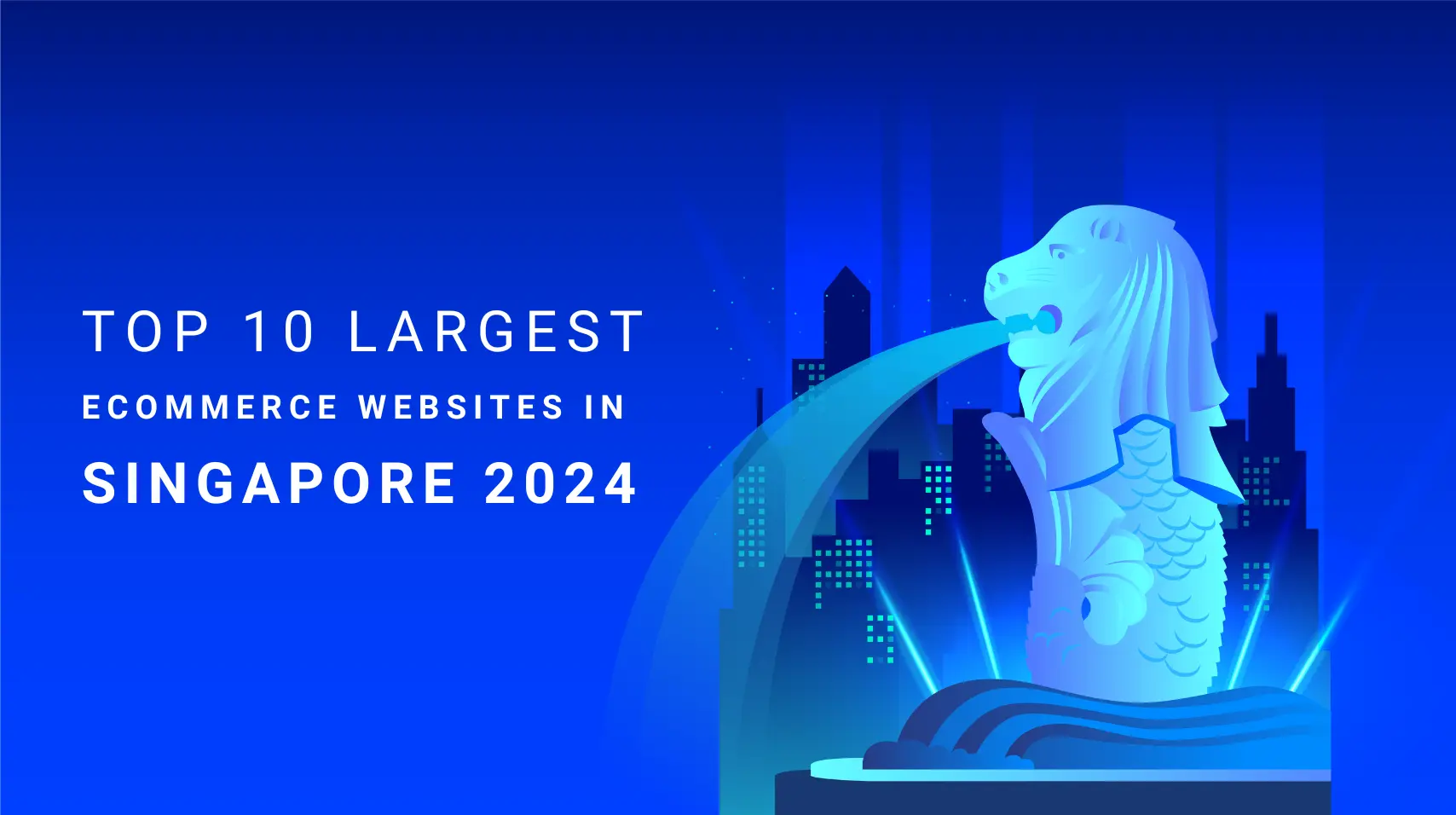
Online shopping has become an indispensable trend in Singapore. Therefore, consumers in this city have set higher demands for their online shopping experience, driving businesses to strive for optimizing their eCommerce websites to provide a unique and best shopping experience for customers.
Below are 10 brands heavily investing in the online shopping experience in Singapore, as collected by SECOMM from BuiltWith, AfterShip, and Similarweb.
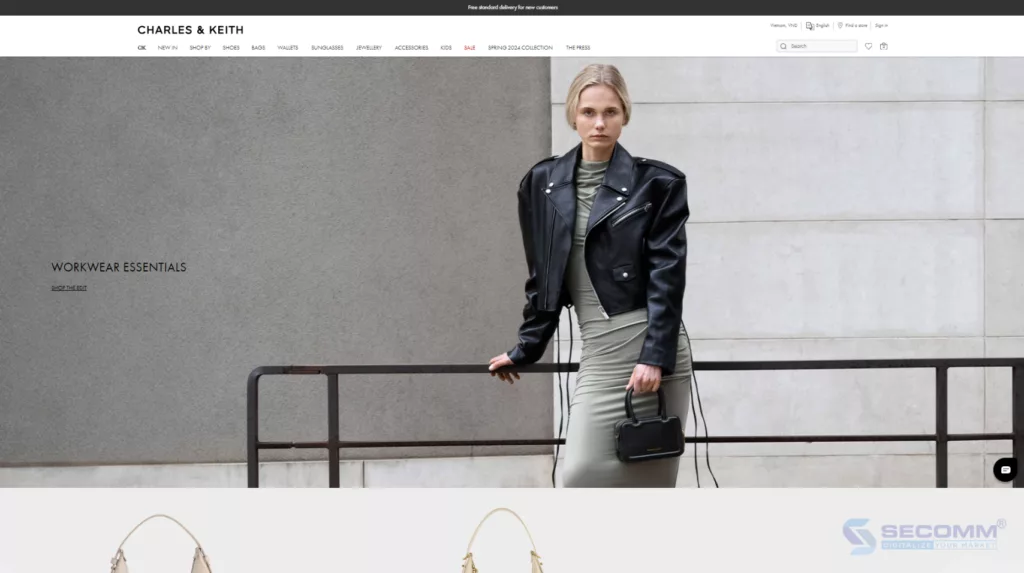
Charles & Keith, a leading fashion brand in Singapore, was founded in 1996 by two brothers Charles and Keith Wong. Focusing on footwear, handbags, and fashion accessories, Charles & Keith quickly gained attention in the market for its modern, youthful fashion style at affordable prices.
Charles & Keith has chosen Salesforce Commerce Cloud to build its website. Thus, Charles & Keith’s website features a range of functions to create the most convenient and comfortable online shopping experience for users. These include advanced search with filtering and sorting, detailed product views with high-quality images and customer ratings, secure shopping cart and payment, along with order tracking and purchase history. Additionally, customers can enjoy loyalty rewards, seek customer support, read fashion blogs, and connect on social media to stay updated on the latest trends. With this diversity and convenience, Charles & Keith’s eCommerce website in Singapore has provided an excellent online shopping experience for users.

FortyTwo is a furniture and home accessories brand established in Singapore in 2007. FortyTwo offers a range of products from bedroom furniture, living room, kitchen to household items and interior decoration. The brand is known for providing quality products at competitive prices with fast delivery and attentive customer service. FortyTwo regularly updates and expands its product portfolio to meet diverse customer needs.
FortyTwo’s website is built on the Magento Open Source platform (Adobe Commerce free version). With this website, users can easily search and filter products, explore a variety of product categories from furniture to household items. Additionally, the website offers the ability to integrate attractive promotional campaigns and customer support, along with fast and secure delivery services.

COURTS is a leading electronics retailer in Singapore, Malaysia, and Indonesia. With over 40 years of experience, COURTS offers customers a wide range of product choices, convenient services, and competitive prices.
COURTS uses Magento Open Source to build its eCommerce website. This website provides diverse and convenient online shopping experiences for users with functions such as product categories, specific product search, store information, and order tracking on the website. COURTS also provides support services and information about promotional programs and product news.
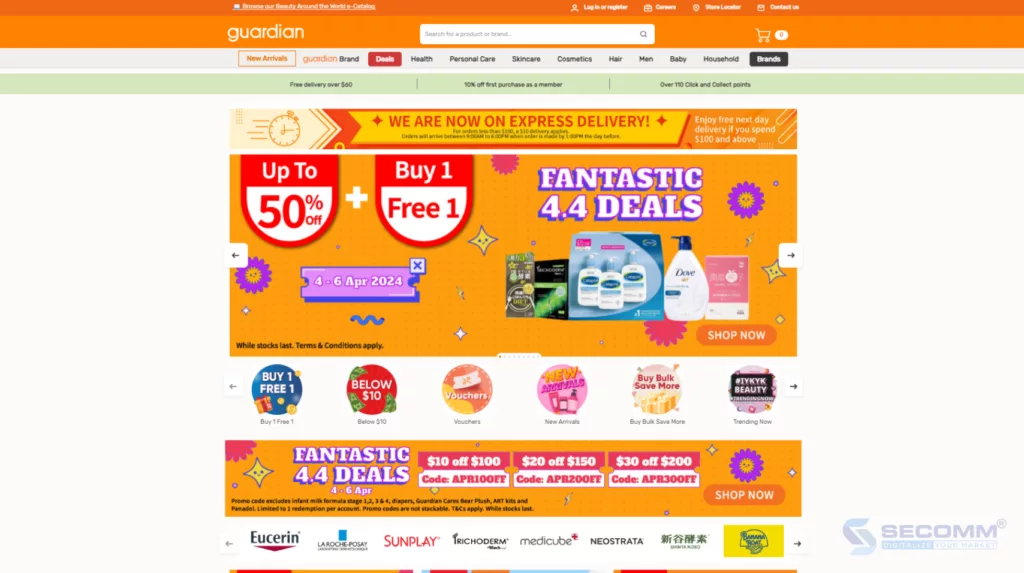
Guardian is a retail chain specializing in health care, cosmetics, and other consumer products. Guardian has a presence in many countries and regions around the world, including Singapore, with a range of products from famous and reliable brands.
Guardian’s website is built on the SAP Commerce Cloud platform, offering many useful features for users. Customers can easily search and purchase products, manage their shopping carts, and make convenient payments. At the same time, the website offers promotions and online support services to help customers have a comfortable and safe online shopping experience. Moreover, customers can also rate and provide feedback on products, providing useful information for other users.
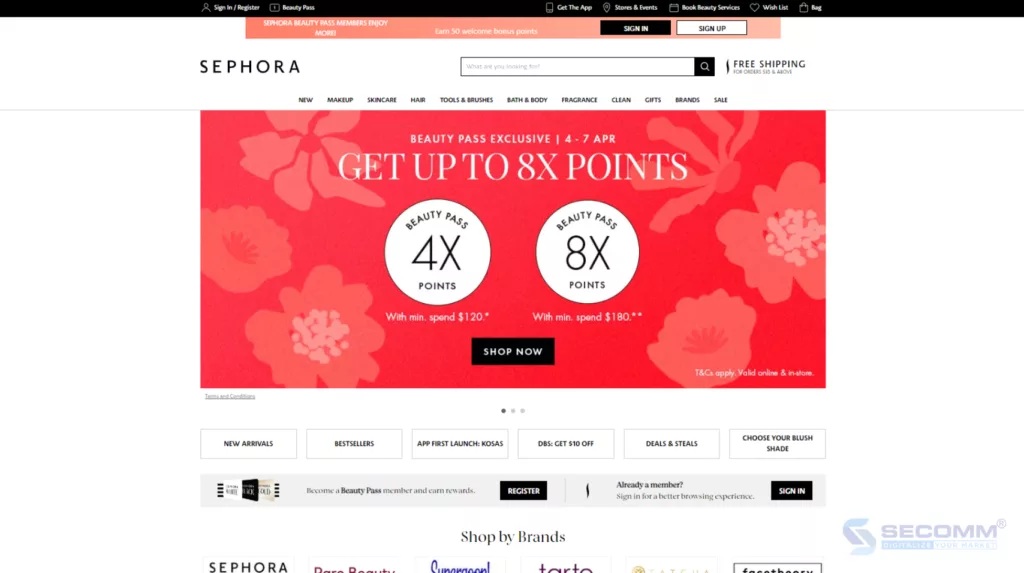
Similar to Guardian, Sephora is a global retail chain of cosmetics and beauty products, known for offering a range of cosmetics, skincare, and beauty products from leading brands worldwide. Currently, Sephora has a presence in the Singapore market with physical stores in major shopping centers and an eCommerce system, including a website and app for customers. Sephora is favored for its product diversity, customer care services, and innovation in the online cosmetics shopping experience.
Sephora’s eCommerce system in Singapore is built on the Vue.js and Nuxt.js programming languages. With this system, Sephora customers can quickly search and explore products through smart search and various filters. The online shopping experience is optimized with detailed product information, sharp images, and customer reviews.
Sephora’s app is also highly rated, making shopping easier for customers with features like “Virtual Artist” and receiving notifications about promotions. In general, Sephora offers a range of features and services to meet customers’ cosmetics shopping needs, creating a professional and convenient online shopping experience.
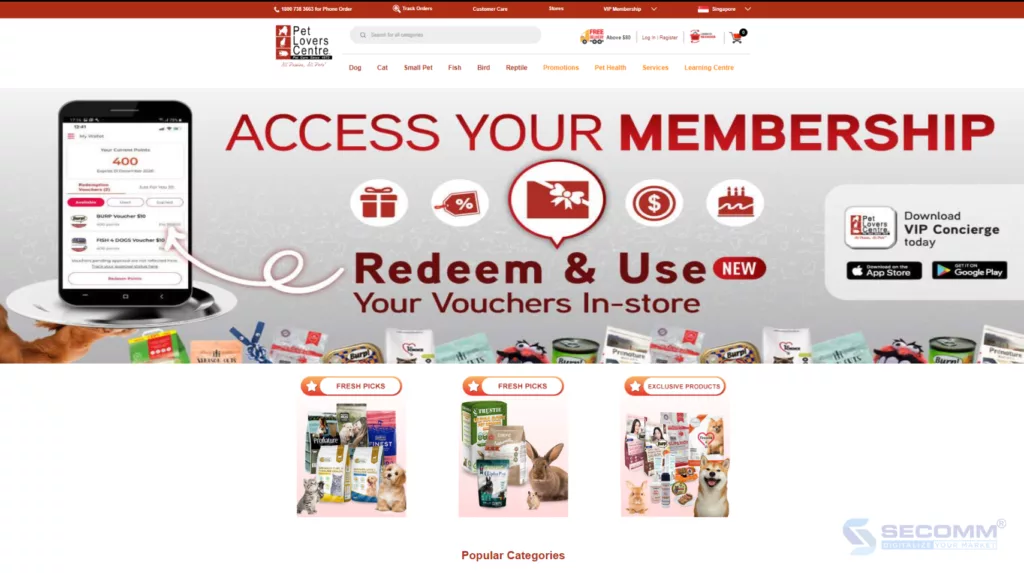
Pet Lovers Centre is a leading pet products and services retailer in Asia. Established in 1973 in Singapore, Pet Lovers Centre now has over 160 stores in 5 countries: Singapore, Malaysia, Thailand, the Philippines, and Vietnam. Pet Lovers Centre is committed to providing quality products and services from reputable brands at competitive prices.
The Pet Lovers Centre website is built using PHP programming language and has outstanding features to provide users with a convenient online shopping experience. Users can search for products based on various criteria and use filters to select suitable products. The multi-layered product categories are classified by pet type, ensuring diversity and richness. The VIP Member program brings benefits to customer loyalty strategies. Integrating customer reviews on Google Maps helps users evaluate the quality of products and services provided by Pet Lovers Centre. Additionally, the website builds a quick shopping function to save time, customer management feature, and reorder support to efficiently manage customer information and orders.
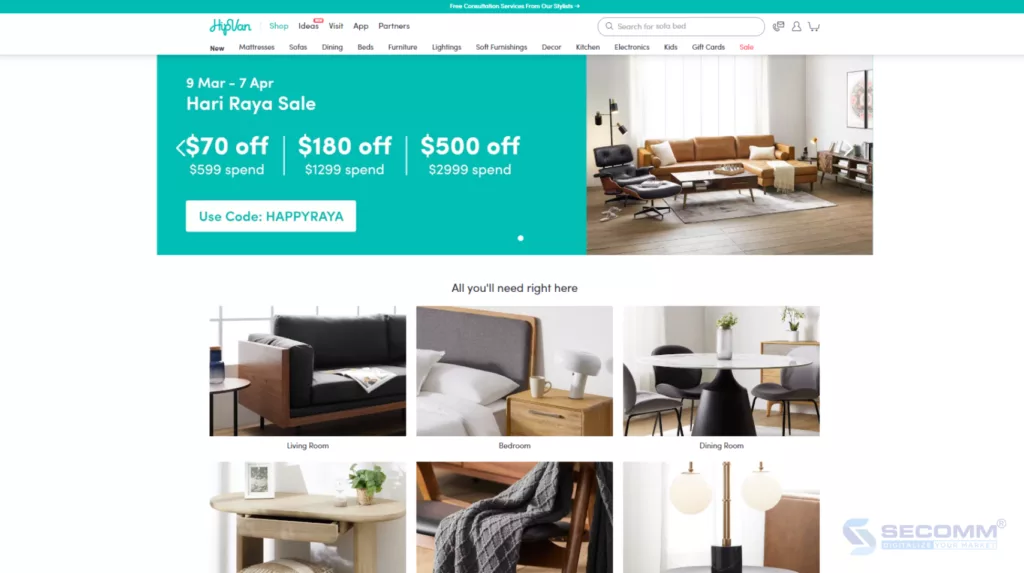
HipVan is an online retail website specializing in furniture and home decor, headquartered in Singapore. The brand was founded in 2013 with the aim of providing customers with high-quality furniture products at affordable prices, along with a convenient shopping experience and excellent customer service.
HipVan’s website is built using the Ruby on Rails and React framework, with Ruby being the primary programming language. Its notable features include building a community for sharing interior design ideas, image-based product search, and allowing customers to upload images of desired products. Particularly, the augmented reality (AR) feature enables customers to view products in their real-life space before making a purchase. Additionally, HipVan offers free interior planning services to help customers conveniently plan and design their living space.
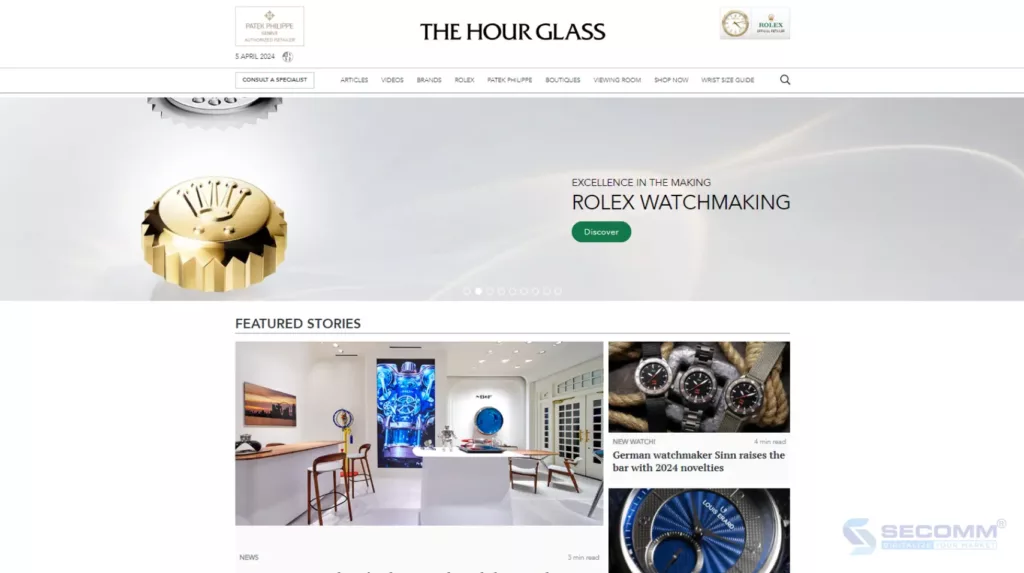
The Hour Glass is a premium watch retailer in Singapore founded in 1974. Currently, The Hour Glass has over 50 stores worldwide and is an authorized distributor for many leading watch brands such as Rolex, Patek Philippe, Audemars Piguet, Omega, Cartier, and more.
The Hour Glass’s online store is built on the WooCommerce platform and CMS WordPress, providing a convenient platform for customers to explore and purchase watches from renowned brands like Rolex, Patek Philippe, Audemars Piguet, and other luxury brands. In addition to product offerings, the website also provides detailed information about the services offered by The Hour Glass, including repairs, maintenance, and polishing of watches, to help customers maintain and preserve their products effectively. Furthermore, the website continuously updates the latest news in the watch industry along with special events organized by The Hour Glass, creating a comprehensive and immersive experience for users.
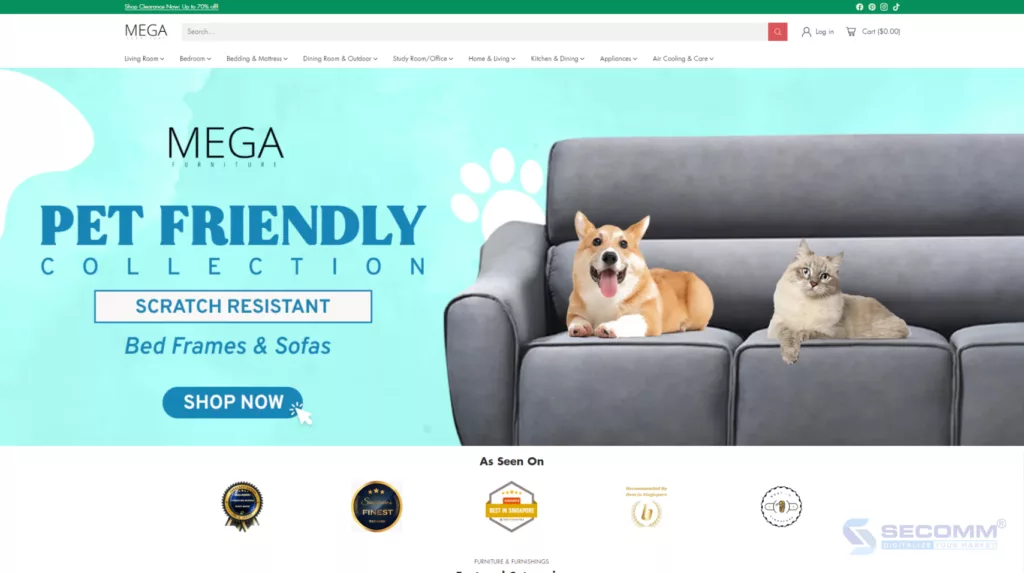
Megafurniture is a furniture retail company in Singapore, specializing in providing a range of furniture products for living rooms, bedrooms, dining rooms, and various other spaces in homes. Megafurniture is known for offering affordable and high-quality products, attracting the interest of many consumers. Additionally, the furniture brand is also renowned for its early investment in the online store, allowing customers to conveniently shop for furniture online.
Megafurniture’s website is built on the leading Shopify Plus platform, with basic and advanced features optimized for the furniture industry. The purchasing process is designed to be simple and straightforward, providing a convenient online shopping experience for customers. Secure online payment support through various methods increases flexibility for consumers. Megafurniture also offers multiple delivery and installation options to meet customer needs. Moreover, features like quick product view and product comparison assist users in making smart and efficient purchasing decisions. This, combined with fast checkout features, significantly enhances the online shopping experience.
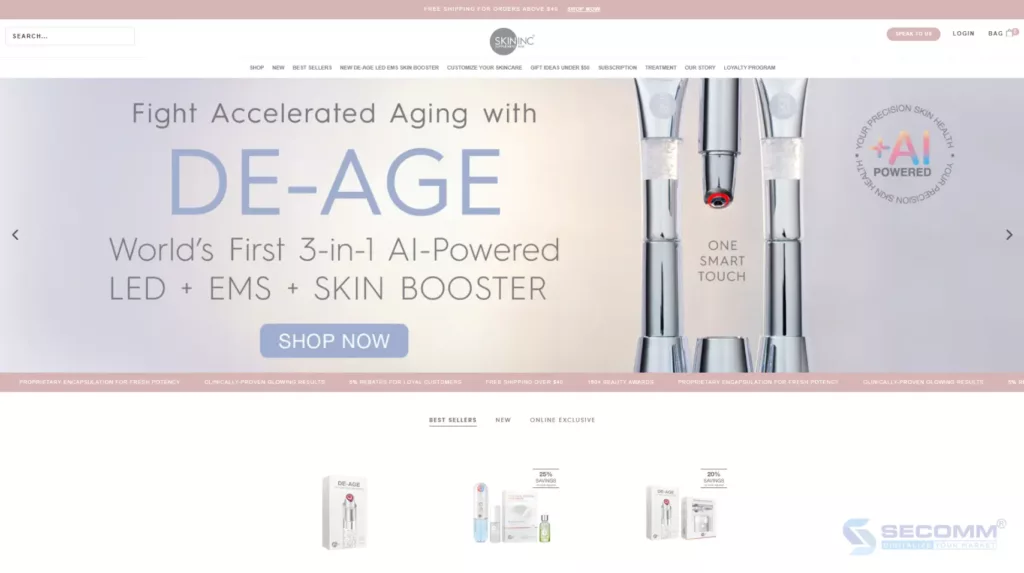
Skin Inc is a skincare brand specializing in manufacturing and distributing high-quality skincare products. The company focuses on providing skincare solutions, including brightening, moisturizing, anti-aging, and treating various skin concerns.
Skin Inc transitioned from the Magento platform to Shopify Plus in 2019, aiming to enhance the customer experience by deploying multiple website versions for different markets and customer segments. Using the LaunchPad feature, Skin Inc employees can create sales events without developer assistance. Additionally, Shopify Plus seamlessly integrates with marketing tools and loyalty programs, enabling personalized communication and data-driven marketing strategies.
Conclusion
The above is a list of the top 10 eCommerce websites in Singapore. By implementing leading platforms such as Magento Open Source, Shopify Plus, and various others, these brands provide optimized online shopping experiences, attracting the interest of customers both domestically and internationally.
During its development process, SECOMM has collaborated with numerous clients from Singapore to create notable eCommerce websites, with the most prominent being the project to develop an online liquor supply system at Changi Airport.
 2
2
 2,278
2,278
 0
0
 1
1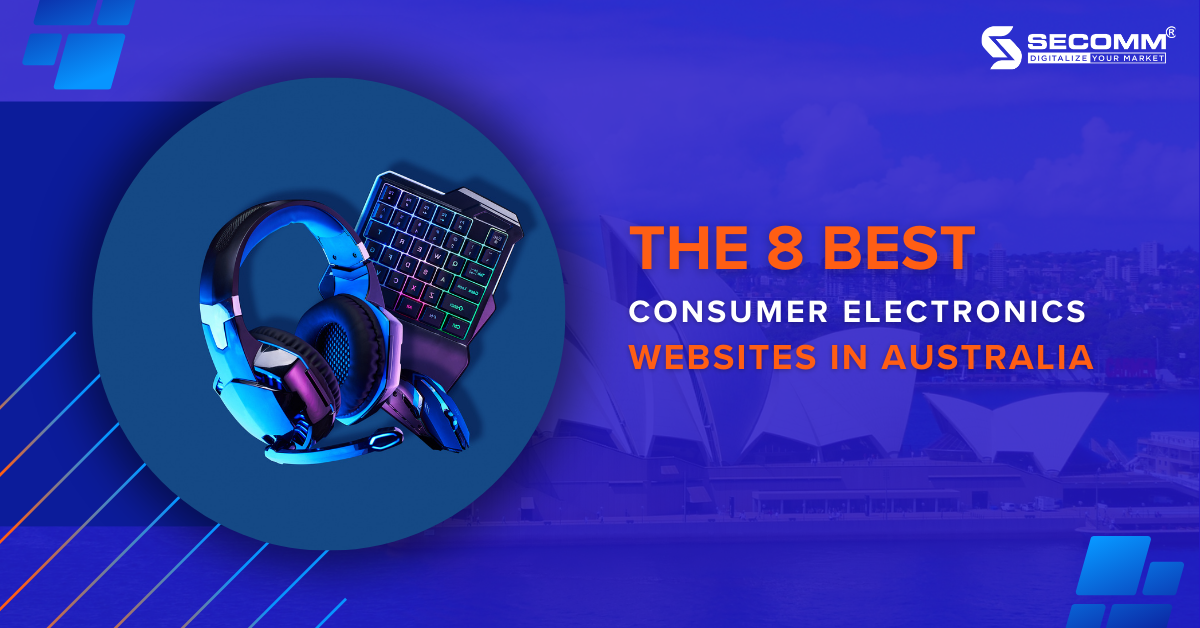
In recent years, the online consumer electronics industry in Australia has seen unprecedented growth. According to IBISWorld, the revenue for this sector reached $5.3 billion in 2023, with a compound annual growth rate (CAGR) of 15.7% over the past 5 years.
Let’s explore the websites of 8 consumer electronics brands that have significantly contributed to the industry’s development through optimized online shopping experiences tailored to the satisfaction of Australian customers.
When mentioning Samsung, people immediately think of cutting-edge smartphones and tablets. However, this tech giant doesn’t stop there. Other products like smart TVs and home appliances are also particularly favoured by global consumers.
In Australia, Samsung’s eCommerce website is the ideal online shopping destination for consumer electronics. With a modern, user-friendly interface and smooth navigation, the website provides customers with a seamless experience in every aspect of browsing, product exploration, and payment.
Additionally, the website features a dedicated section called #Explore, offering numerous shares and helpful tips to sync with modern life.
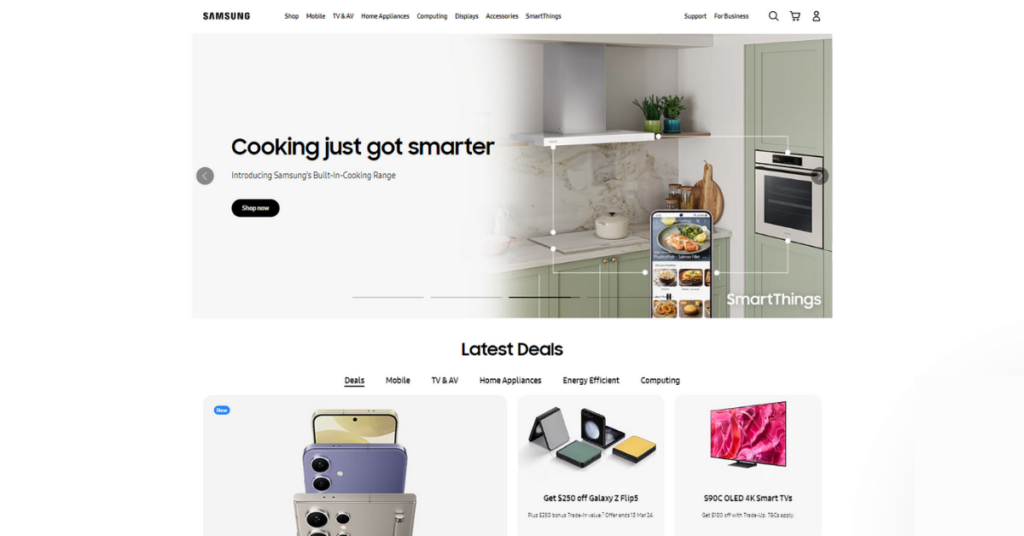
Apple’s website is also the preferred shopping destination for Australian consumers, alongside its nationwide chain of offline stores. With the perfect blend of elegant design and cutting-edge technology, this website is not just a place to explore and purchase high-quality Apple products but also an immersive experience in modernity and luxury.
Additionally, exclusive policies and top-notch customer service contribute to Apple maintaining a large base of loyal customers in Australia and worldwide.
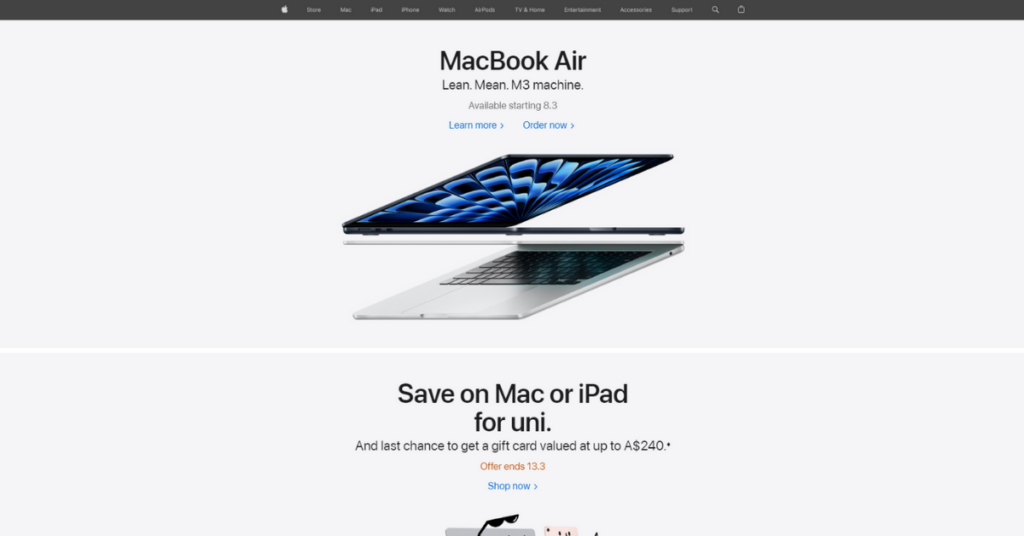
JB Hi-Fi is a consumer electronics brand in Australia that has gained worldwide recognition after more than 50 years of operation. In addition to investing in marketing and sales operations in its chain of offline stores across Australia, JB Hi-Fi’s eCommerce website is also given significant attention.
With a user-friendly and easy-to-navigate interface, JB Hi-Fi’s website enables consumers to easily search for and choose from thousands of products. Competitive pricing policies and excellent customer service are the factors that JB Hi-Fi consistently commits to, aiming to provide the best online shopping experience for Australian customers.
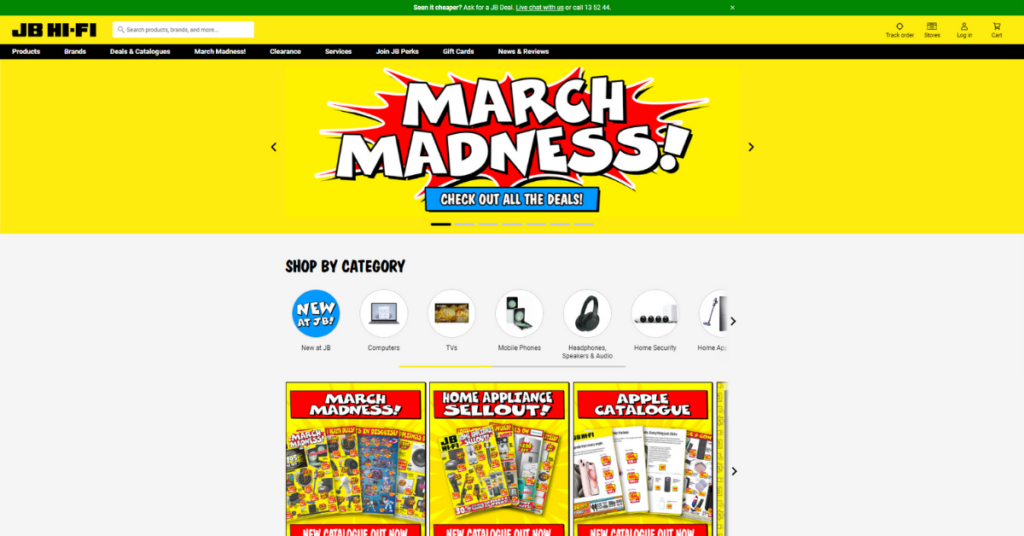
The Good Guys is a prominent and reputable name in the Australian consumer electronics market. Over the years, they have built up a vast product portfolio, including TVs, refrigerators, laptops, audio devices, and washing machines from leading global brands.
Attentive customer care services have also been a positive aspect that has earned The Good Guys favour among Australian consumers for many decades.
The Good Guys’ consumer electronics website allows customers to conveniently shop with a diverse range of choices. Additionally, attractive promotions and deals are regularly applied to attract customers. Furthermore, this retailer has implemented a Loyalty Program to satisfy their loyal customers.
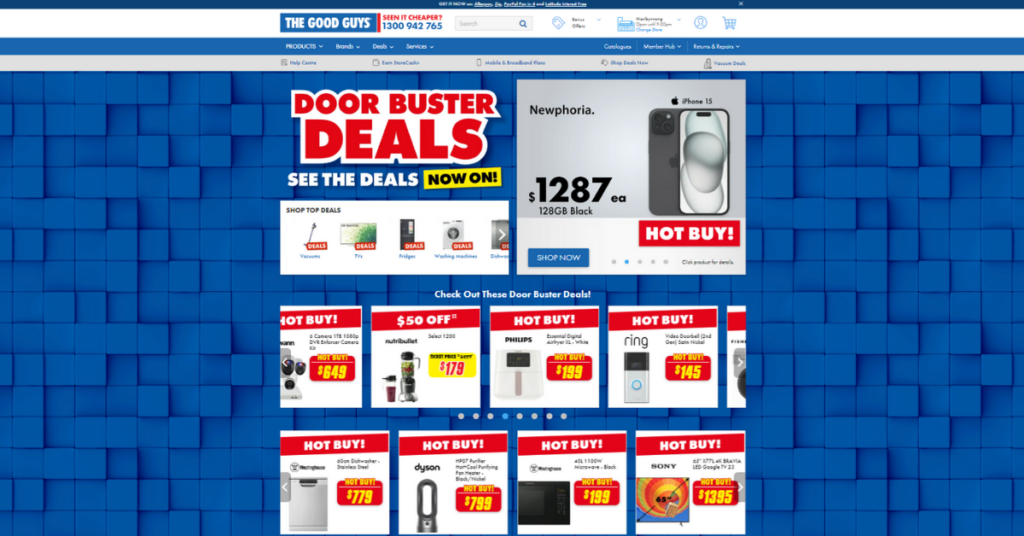
The Appliances Online consumer electronics website is considered a paradise where customers can find the most suitable items for their needs and budget. The intuitive website interface makes it easy for customers to search for and compare products, providing detailed information and user reviews to help them make informed purchasing decisions.
Appliances Online also offers various attractive customer services such as free shipping, product trade-ins and recycling, and 24/7 support via a hotline. The flexible payment methods are also an advantage of this retail site, allowing customers to choose between credit cards, electronic wallets, or instalment payments with a Buy Now Pay Later option.
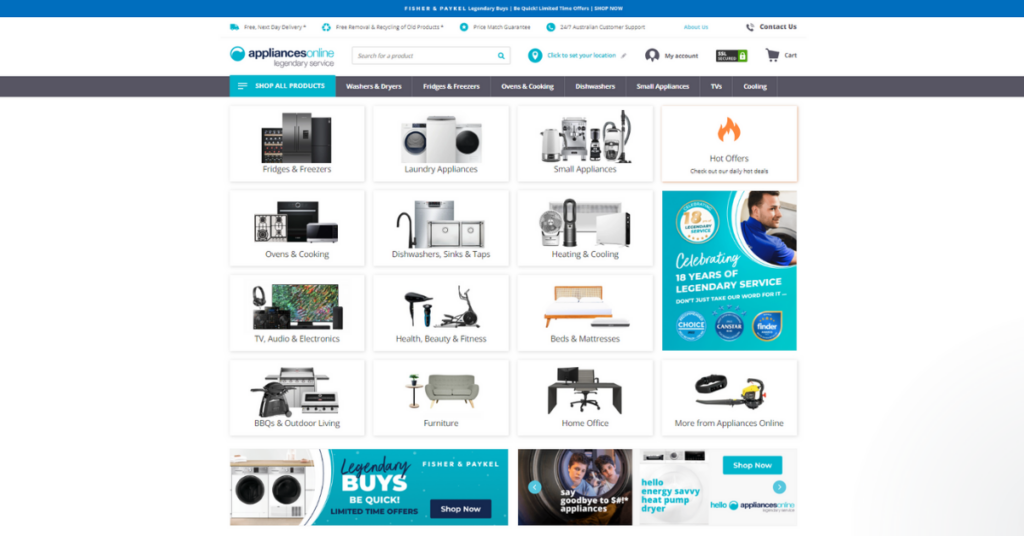
Since its launch in 1968, Dick Smith has firmly established its position in the Australian consumer electronics market. In its early years, Dick Smith focused on providing electronic products and components. It quickly expanded its product portfolio from electronics and home appliances to computers, mobile phones, cameras, tech toys, and other technology and entertainment-related items.
Dick Smith has invested in building an eCommerce website with advanced features on the Magento platform. The intuitive and user-friendly interface of the Dick Smith website makes it easy for Australian consumers to search for and compare products, as well as enjoy special offers and attractive discounts.
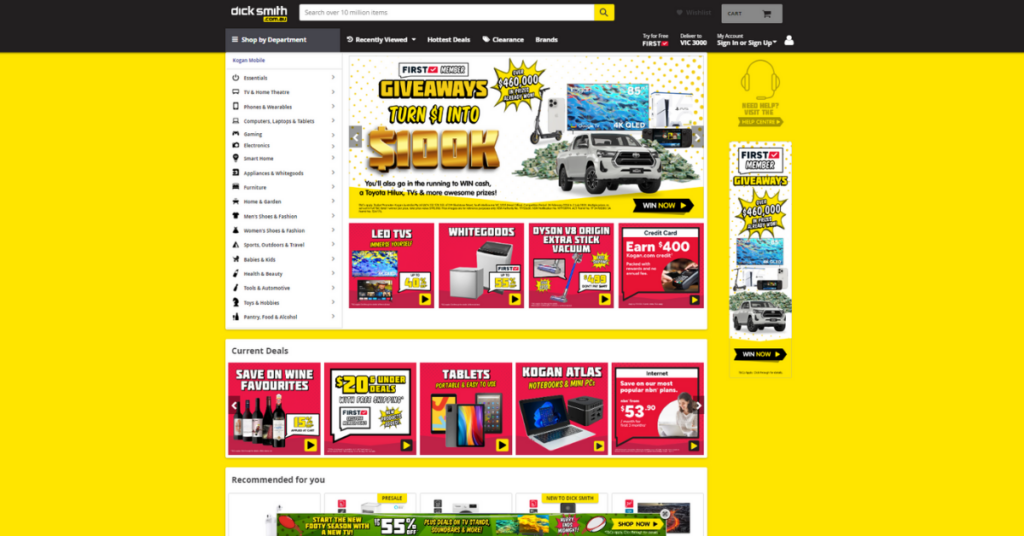
With a simple yet effective mission to provide a convenient and quality shopping experience, Jaycar Electronics has quickly become a reliable companion for Australian consumers. Jaycar Electronics offers a diverse range of products, including printers, USB ports, audio speakers, solar energy batteries, security cameras, and smart home products.
Jaycar Electronics’s eCommerce website is designed for easy navigation, allowing customers to quickly find and view products by category. The checkout process is also streamlined to shorten the payment process and reduce cart abandonment rates.
Additionally, customers have various shopping options, such as online purchases, in-store pickup, online purchases with free delivery, and buy now pay later. Jaycar Electronics has also introduced a Loyalty program to encourage customers to shop with exclusive benefits.
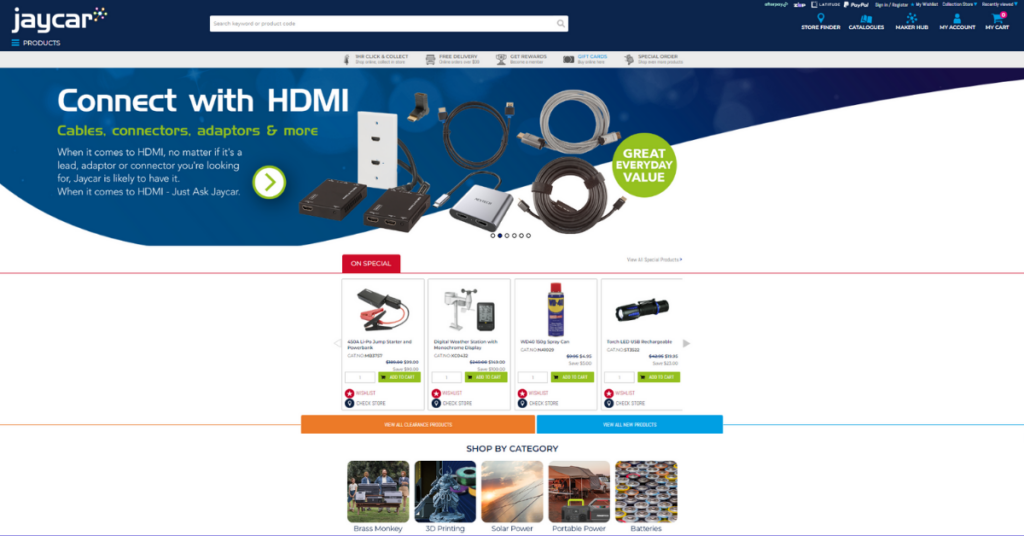
After many years of operation, Centre Com is recognized as one of the leading destinations where consumers can experience diversity and quality across a range of products. Centre Com’s consumer electronics website offers products such as PCs, laptops, CPUs, keyboards, cables, and audio speakers.
The website has been developed and customized with many advanced features to make searching, browsing, ordering, and payment easier.
When it comes to payment, the brand applies Buy Now Pay Later options with Afterpay and Zip, in addition to traditional payment methods, providing customers with more choices and flexibility without hesitation when making purchases.
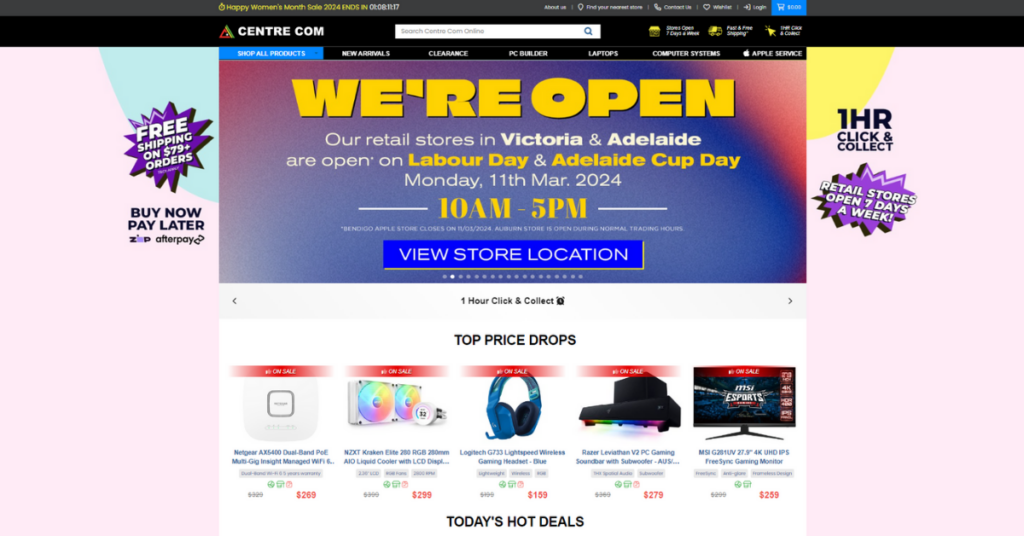
Build your first consumer electronics website today!
Here are the top 10 consumer electronics websites in Australia. By deploying superior platforms such as Magento, Shopify Plus, and SAP, these brands have provided an optimal online shopping experience and successfully captivated both local and international consumers.
Throughout years of development, SECOMM and many Australian clients have collaborated to create proud eCommerce websites. Projects with Laybyland, Jasnor, Rod Shop, and others stand out.
Contact SECOMM or call directly at hotline 028 7108 9908 to start today!
 2
2
 3,509
3,509
 1
1
 1
1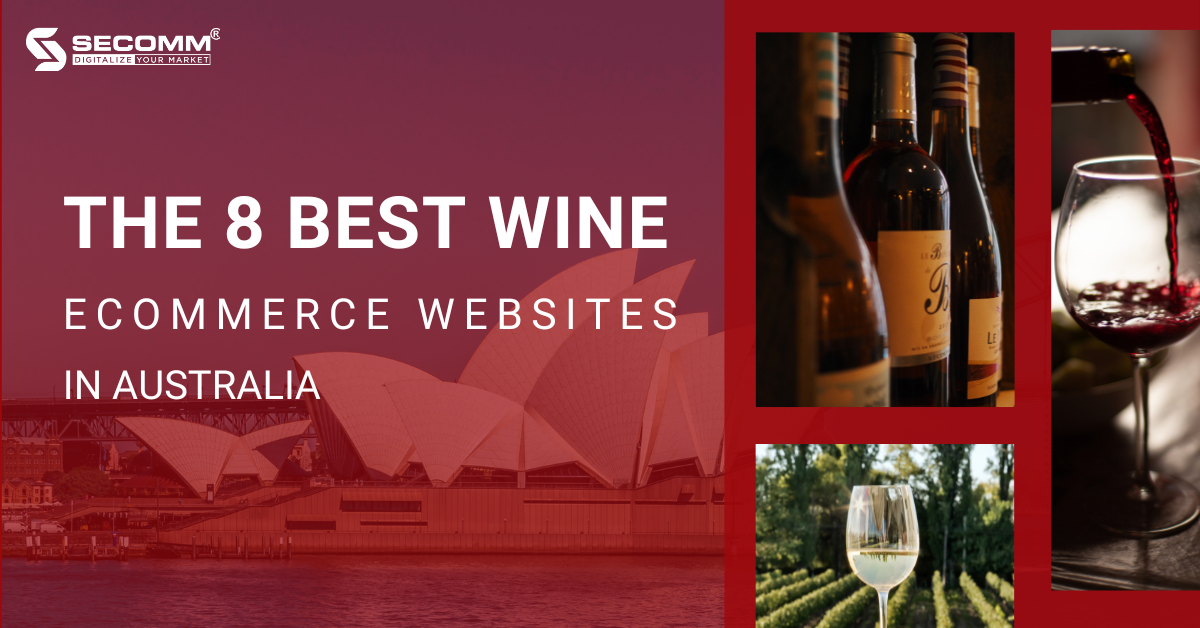
The wine eCommerce industry in Australia is rapidly growing and has the potential for further expansion in the future. According to IBISWorld, the revenue for this sector is projected to surpass $374 billion by 2023, with an annual growth rate of 10.51%.
Let’s explore the websites of the 8 most beloved liquor brands in Australia that have contributed to driving the growth of wine eCommerce in this market.
Dan Murphy’s is a retail brand specializing in the sale of top-quality wines and alcoholic beverages in Australia. With a history of over 60 years in operation, Dan Murphy’s has built a strong reputation within the Australian consumer community.
Through its chain of traditional stores and eCommerce website, Dan Murphy’s enables customers to shop with a wide range of options and convenience.
The eCommerce website of Dan Murphy’s is where customers can experience easy and flexible online shopping. With a user-friendly interface, the website provides detailed product information, consumer reviews, and attractive promotional programs.
Customers can enjoy a comfortable and secure shopping experience with assurance regarding the quality and origin of products from this reputable brand.
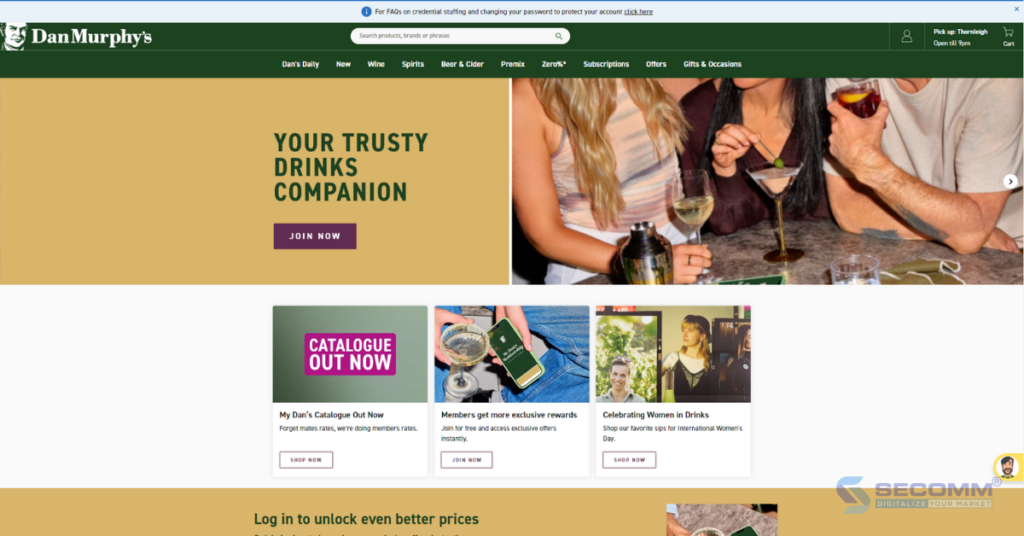
BWS is known as a leading alcohol retail brand in Australia. The brand is renowned for its diverse product portfolio, including wines, domestic and international beers, as well as various spirits from around the world.
BWS’s wine eCommerce website provides a convenient and flexible online shopping experience. In addition to offering detailed product information and prices, the website incorporates various special features. These include exclusive promotional programs, consumer reviews, advanced search options, and one-page checkout.
In addition to the eCommerce website, BWS has developed a mobile app, allowing customers to shop conveniently anytime, anywhere.
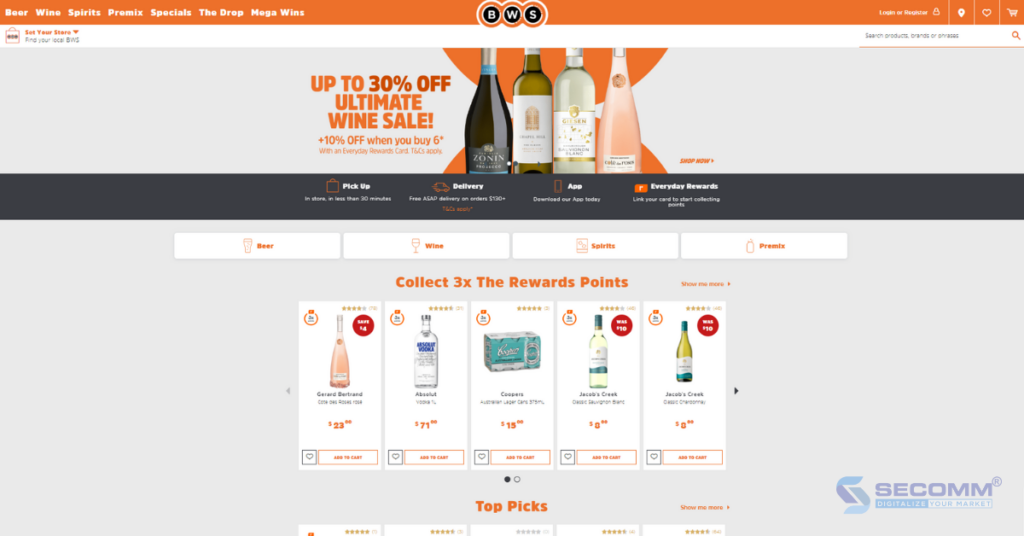
Liquorland is one of the prominent names in the alcohol retail market in Australia. With over 700 stores spread across the country, Liquorland has established a strong presence in the market and has become a favorite destination for those who appreciate fine wines and exceptional beverages.
Liquorland not only focuses on providing quality products but also emphasizes a comfortable and friendly shopping experience through its eCommerce website. The website is built with various unique features such as product filtering and search, displaying products by category, showcasing customer reviews, options for delivery and in-store pickup, and one-page checkout.
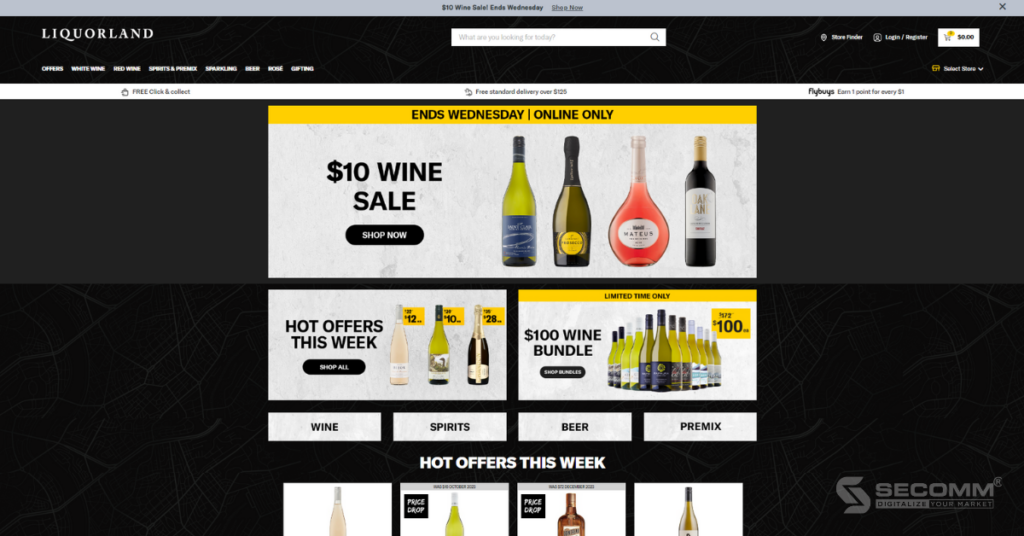
The liquor and alcohol retail chain First Choice Liquor owns over 100 stores throughout Australia and is the choice of many consumers in the country. This retail brand offers a diverse range of products such as wines, spirits, beers, and various alcoholic beverages worldwide.
On the First Choice Liquor eCommerce website, customers can easily search, browse, and purchase products through a user-friendly and navigable interface. Several unique features are also integrated into the website to optimize the customer experience.
These include store locator functionality, choosing the nearest store, product filtering, and search, displaying detailed product information, one-page checkout, delivery and pickup options, and more.
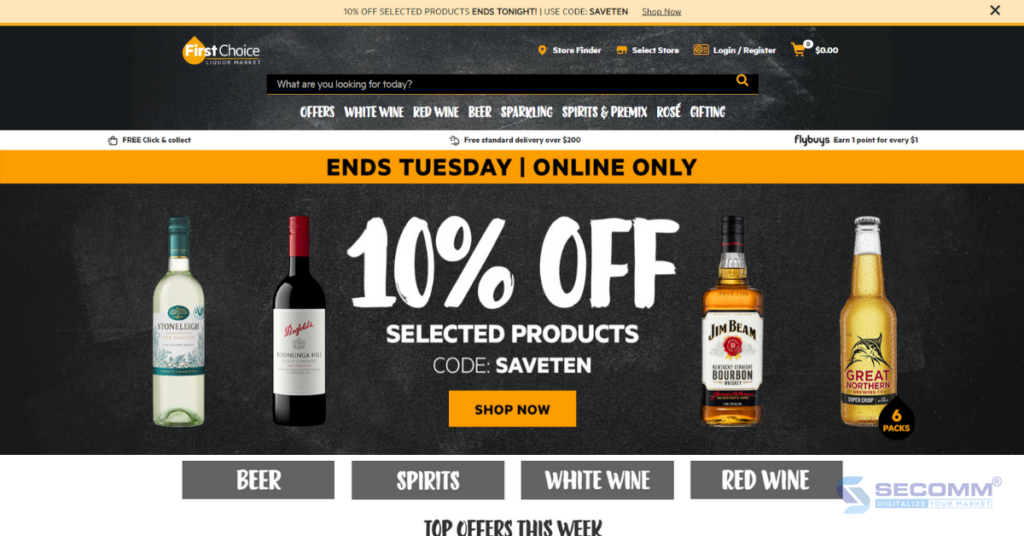
Vinomofo is a renowned wine brand from Australia with a simple yet powerful slogan, “Make wine fun.” This brand has created a passionate community around wine, where people can share and enjoy the collective enthusiasm for wine culture.
Vinomofo’s eCommerce website is built with advanced features such as product filtering and search, product previews, displaying detailed product information, showing related products, and one-page checkout. In addition, Vinomofo provides customers with a shopping policy that includes various payment methods and flexible return and exchange policies.
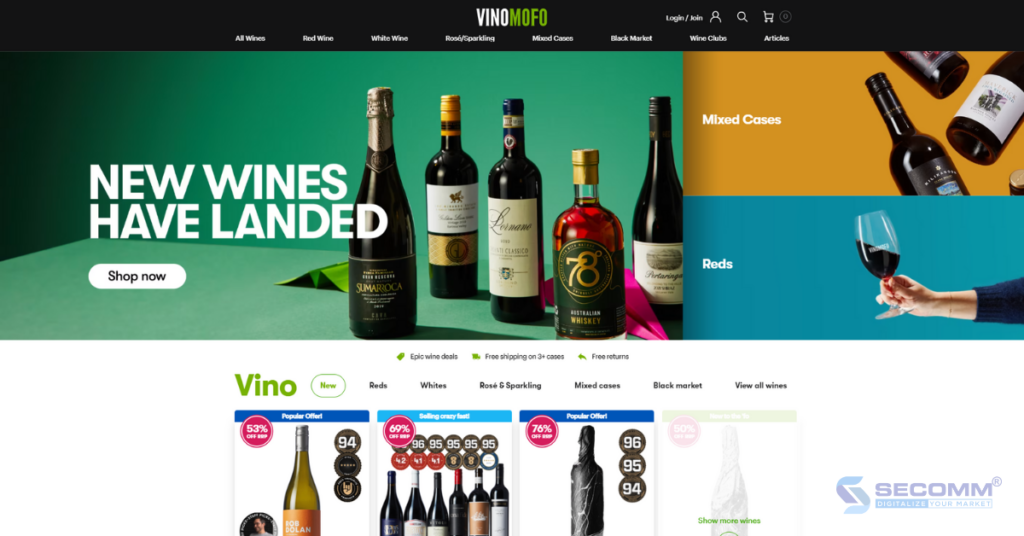
Wine Direct is known for its diverse product portfolio, ranging from classic wine bottles to the most modern and popular options in the market. The brand also stands out for its excellent customer service, providing detailed product information and post-purchase care to ensure maximum customer satisfaction.
Wine Direct’s website is designed to be modern and user-friendly, offering an easy and comfortable online shopping experience. The website not only provides comprehensive information about each wine bottle but also integrates features such as consumer reviews and special promotional programs.
With a strong presence in the Australian market, Wine Direct continues to be a trusted destination for those who love and appreciate the art of wine tasting.
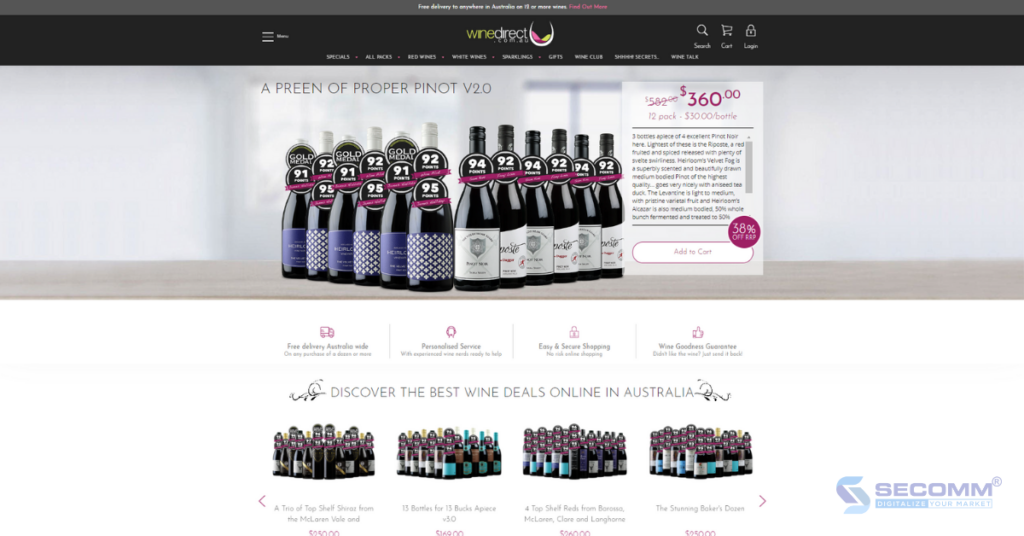
With over a decade of experience, Just Wines has built a strong reputation for providing diversity and high quality to Australian consumers. What sets Just Wines apart is its focus on establishing direct connections with wine producers and top vineyards, ensuring a reliable supply of quality wines and diversity in the product catalog.
The brand takes pride in offering customers a wide selection, ranging from traditional wines to new and unique discoveries in the market.
Just Wines’ eCommerce website is designed to be simple and user-friendly, enabling consumers to easily search, compare, and conveniently purchase wines. Additionally, Just Wines implements a customer loyalty program with various exclusive deals and attractive promotions, creating favorable conditions for customers to enjoy wines at the best value.
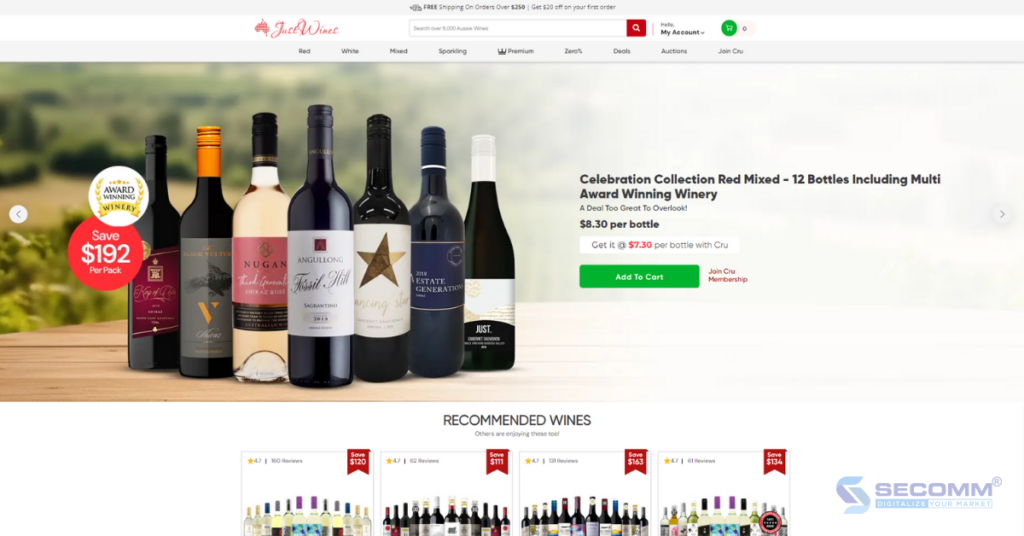
Trentham Estate is a renowned wine brand with a strong presence in the Australian market. With over three decades of history, Trentham Estate has played a significant role in the development and shaping of the Australian wine industry.
The brand is well-known for producing high-quality wines from renowned grape varieties cultivated in carefully tended vineyards. Trentham Estate is not just a winemaking facility but also a smart vineyard, overseeing the process from grapevines to wine barrels.
Trentham Estate’s eCommerce website is built with Magento, allowing customization of how product information is displayed, implementation of promotional programs, optimization of the payment process, and integration of various payment methods. This contributes to providing customers with a comprehensive and flexible online shopping experience.
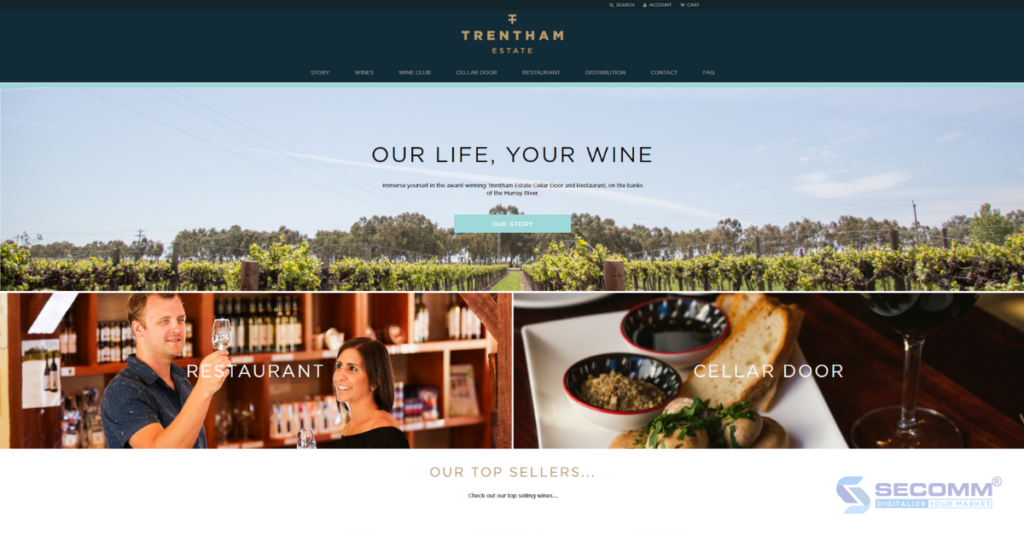
Above are 8 famous wine brands in Australia and how they have built and developed their eCommerce websites. This is clear evidence of the importance of having a professional and convenient online platform in the 21st century.
With extensive experience collaborating with various Australian clients, SECOMM has established itself as a trustworthy partner in constructing and evolving eCommerce initiatives. Notably, the SECOMM team has successfully implemented eCommerce systems for numerous wine businesses across different countries, including Trentham Estate, Thewarehouse, Ishopchangi, and more.
We comprehend the distinct requirements of businesses in the alcohol and beverage sector and are dedicated to delivering optimal solutions that enhance the online shopping experience and boost overall business efficiency.
If your business is in search of a professional partner to develop or enhance its eCommerce website, reach out to SECOMM or call (+84)28 7108 9908 today.
 2
2
 2,160
2,160
 0
0
 1
1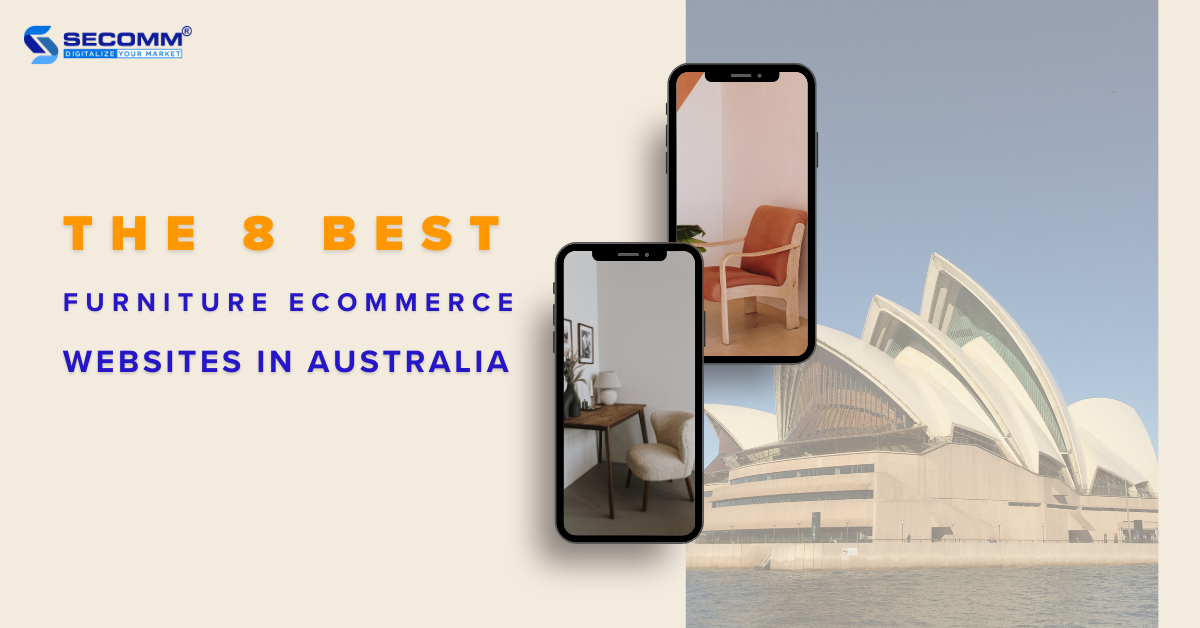
The furniture eCommerce industry in Australia has seen significant growth in recent years, driven by a shift in consumer preferences from traditional offline shopping to online platforms.
According to IBISWorld, the industry generated a revenue of $1.7 billion in Australia in 2023, showcasing a growth rate of 5.9%. IBISWorld also predicts that by 2029, the revenue for Australia’s furniture eCommerce industry is anticipated to reach $2.4 billion.
Let’s delve into how the websites of the following 8 brands have played a role in fostering the growth of the Australian furniture eCommerce sector.
Temple and Webster is one of Australia’s leading brands in the furniture and interior decoration industry. This brand offers a diverse range of furniture and decorative items and emphasizes quality at the most favorable prices.
Over the years, Temple and Webster, operating without physical showrooms, has focused on online sales. Therefore, the eCommerce website of Temple and Webster has been invested in extensively, featuring a series of unique functionalities to optimize the customer shopping experience.
Notable features include Product Filtering and Search, Quick View of Products, Detailed Product Views, Displaying Products within the Same Category, and Order Checking. Additionally, Temple and Webster provides popular payment options in Australia such as PayPal, Afterpay, and Zip.
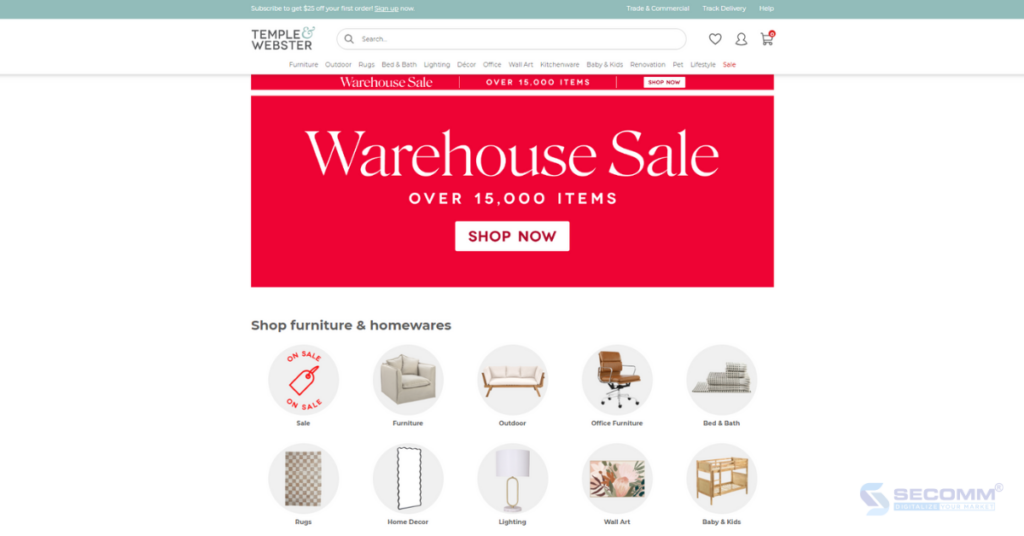
For over 30 years, Fantastic Furniture has become the top choice for customers seeking flexible and efficient furniture solutions. Currently, the brand owns more than 80 retail stores nationwide in Australia. In the realm of online sales, Fantastic Furniture has focused on building and expanding its eCommerce website.
Several unique features have been customized to facilitate easy shopping for customers. Some of these include Quick Product View, Product Color Selection, Product Comparison, Displaying Real Product Photos from customers’ Instagram, and diverse payment options such as Afterpay, Zip, and Latitude.
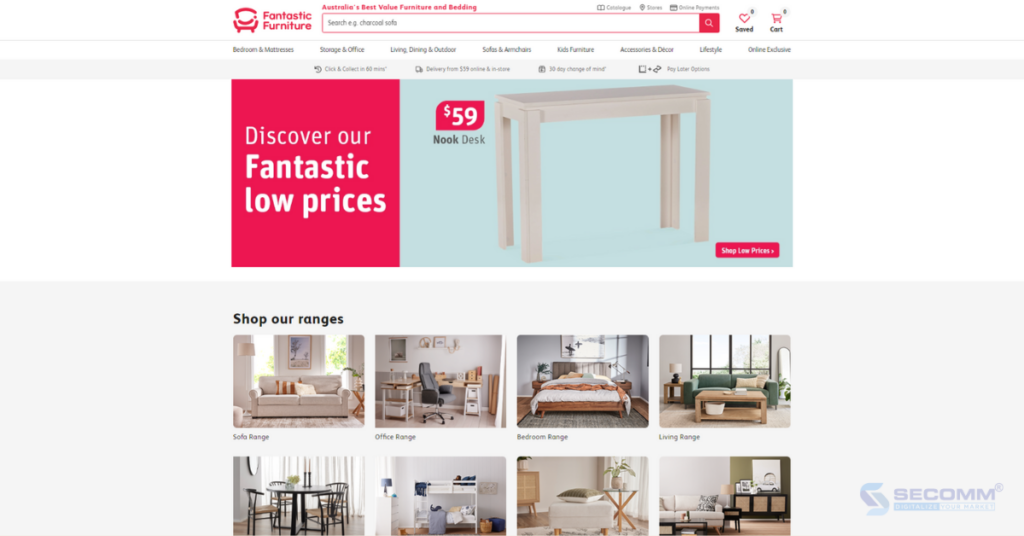
The next brand on this list is Amart Furniture. With a presence in over 40 locations in the Australian and New Zealand markets, Amart Furniture has gained popularity and trust from local consumers. The brand offers a diverse range of high-quality products and unique decorative solutions.
Amart Furniture’s furniture eCommerce website is a leading shopping destination in Australia, attracting over 6 million visits each month. With an intuitive interface and numerous advanced features, the website provides customers with a convenient and comfortable online shopping experience.
Additionally, Amart Furniture offers a 5-year quality guarantee on all its products and regularly introduces attractive promotional programs to attract and retain customers.
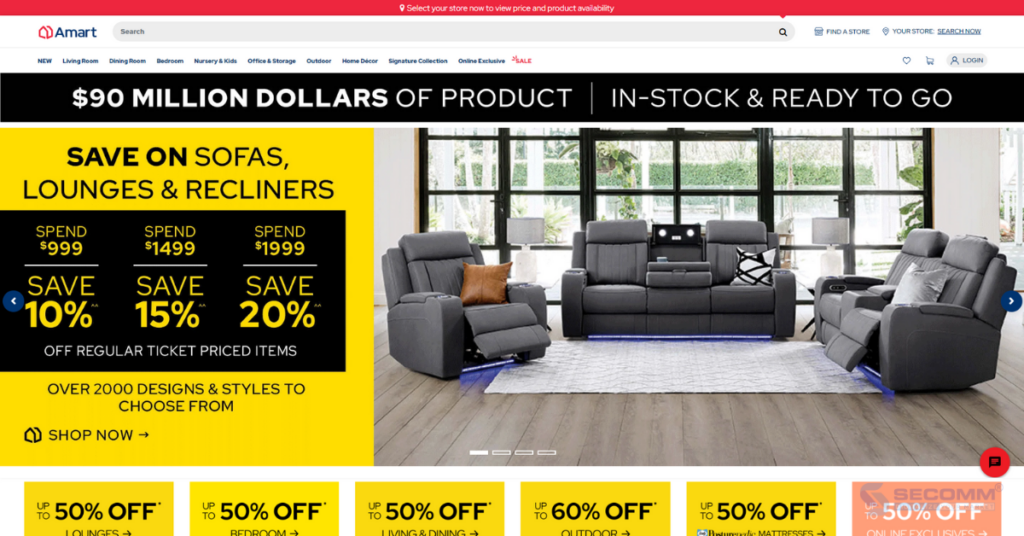
Freedom is renowned for its minimalist and modern-style furniture products. The brand’s product portfolio is quite diverse, ranging from living rooms, bedrooms, kitchens, outdoor furniture, and more. Freedom’s eCommerce website is designed with a harmonious and visually appealing interface, featuring numerous unique features to provide customers with an optimal experience.
Freedom also focuses on establishing a Loyalty Program, allowing customers to create accounts to accumulate points and enjoy attractive benefits while shopping. The combination of uniqueness, quality, and convenience of online shopping contributes significantly to Freedom’s strong position in the Australian furniture market.
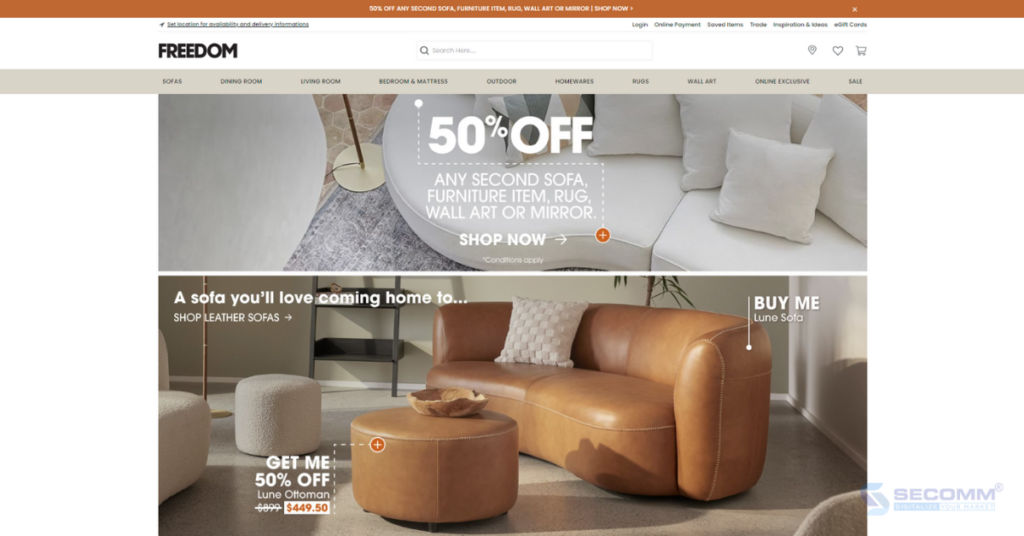
Nick Scali is a specialized Australian brand in designing sofas and retailing furniture. With over 50 years of operation, this brand has captivated customers with innovative designs and a commitment to providing sophisticated living spaces for every household.
Nick Scali’s furniture eCommerce website features several special functionalities to facilitate easy navigation and product purchases. Notably, the 360-degree product view and customization options for size and color based on customer preferences are highlighted. Additionally, the website’s minimalist and intuitive design further enhances the customer experience, making it smooth and enriching.
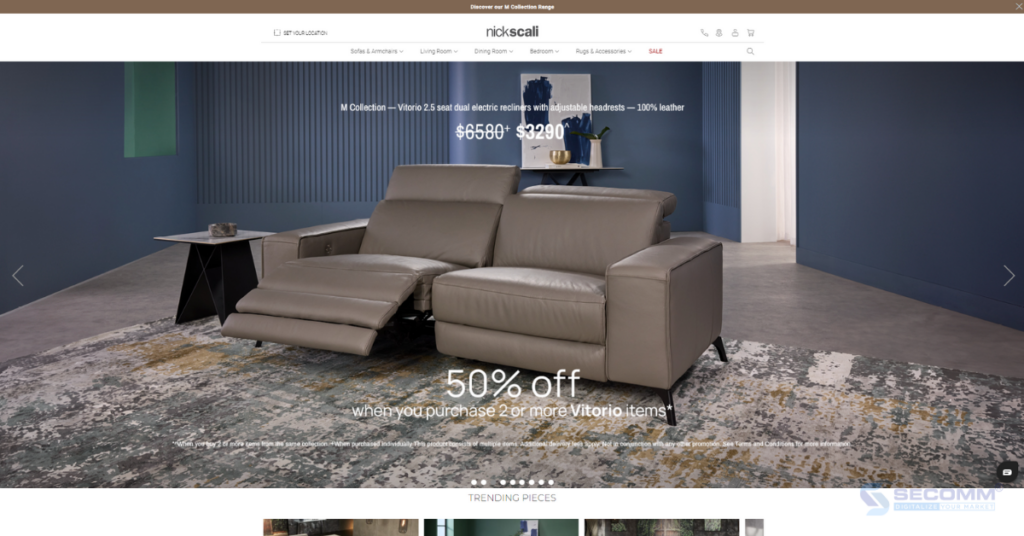
Koala is well-known in both the Australian and New Zealand markets for its high-quality, modern, and innovative furniture products. Furthermore, in the years 2023 and 2024, Koala’s mattresses consecutively ranked as the most beloved on Product Review.
Koala’s furniture eCommerce website is designed to showcase the elegance and modernity of its products. With an intuitive interface, customers can easily explore and select products. Additionally, industry-specific features such as AR/VR and 360-degree viewing are integrated into the website.
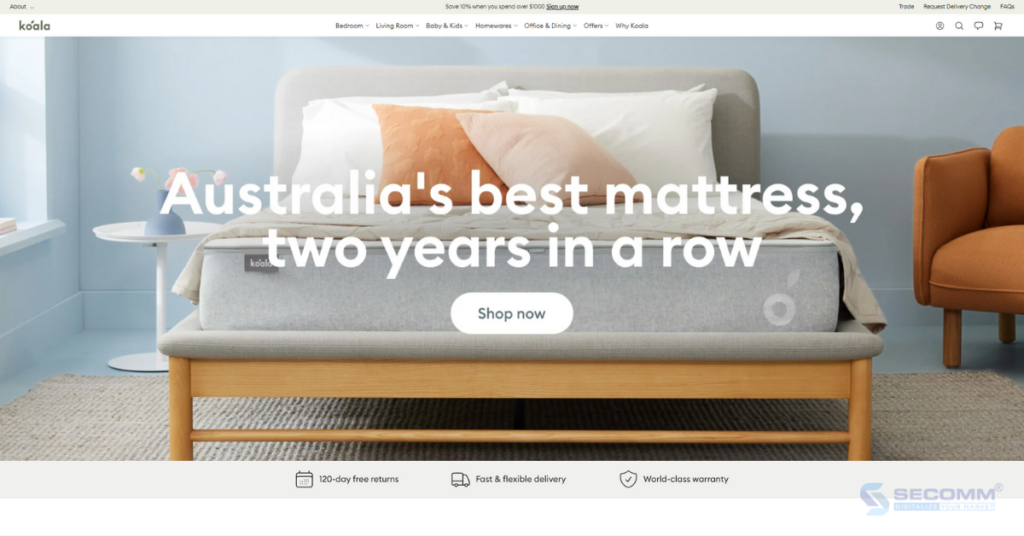
In the Australian furniture industry, Life Interiors stands out as a prominent and well-regarded name. Over the years, it has been the preferred choice for those who appreciate contemporary styles in furniture.
The brand places a significant focus on its online presence, achieving this through the development of a furniture eCommerce website with tailored features to enhance the shopping and payment experience for customers. Furthermore, Life Interiors regularly launches enticing shopping programs as part of its efforts to attract and engage customers.
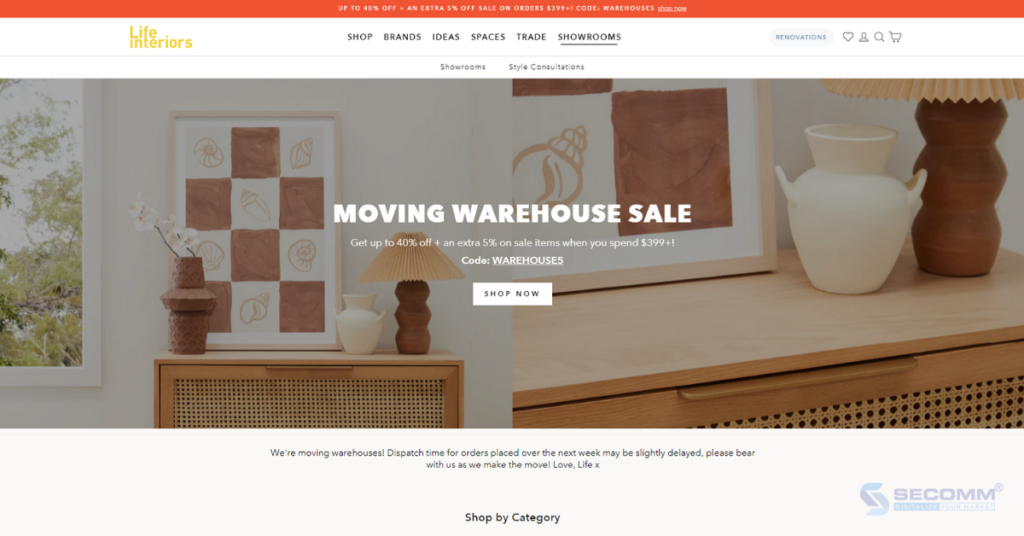
King Living is known in the Australian furniture market as an icon of luxury and innovation. The furniture eCommerce website is a reliable online shopping destination for customers seeking curated and high-standard furniture solutions. King Living has invested in developing various advanced features on the website to provide customers with the best shopping experience.
Notable features include 360-degree viewing, VR/AR, product specification viewing and downloading, one-page checkout, and more. Thanks to these efforts, for more than 40 years, King Living has established a strong presence in the consumer community, particularly among those who value the sophistication of premium living spaces.
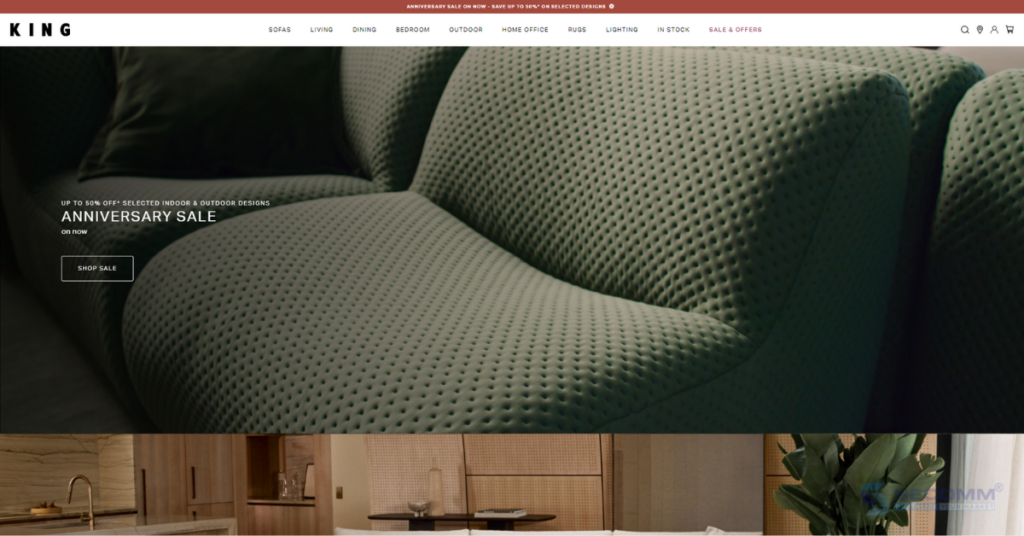
Above are the top 8 furniture brands in Australia that have successfully established and maintained their online presence by building eCommerce websites and investing to develop custom features.
With years of experience in developing successful e-commerce website projects across various platforms for numerous Australian clients such as Laybyland, Jasnor, RodShop, Trentham Estate, etc., SECOMM has a team of highly experienced experts with advanced technical skills and a deep understanding of the eCommerce market.
For detailed advice, please contact SECOMM or call the hotline (+84)28 7108 9908!
 13
13
 2,883
2,883
 0
0
 1
1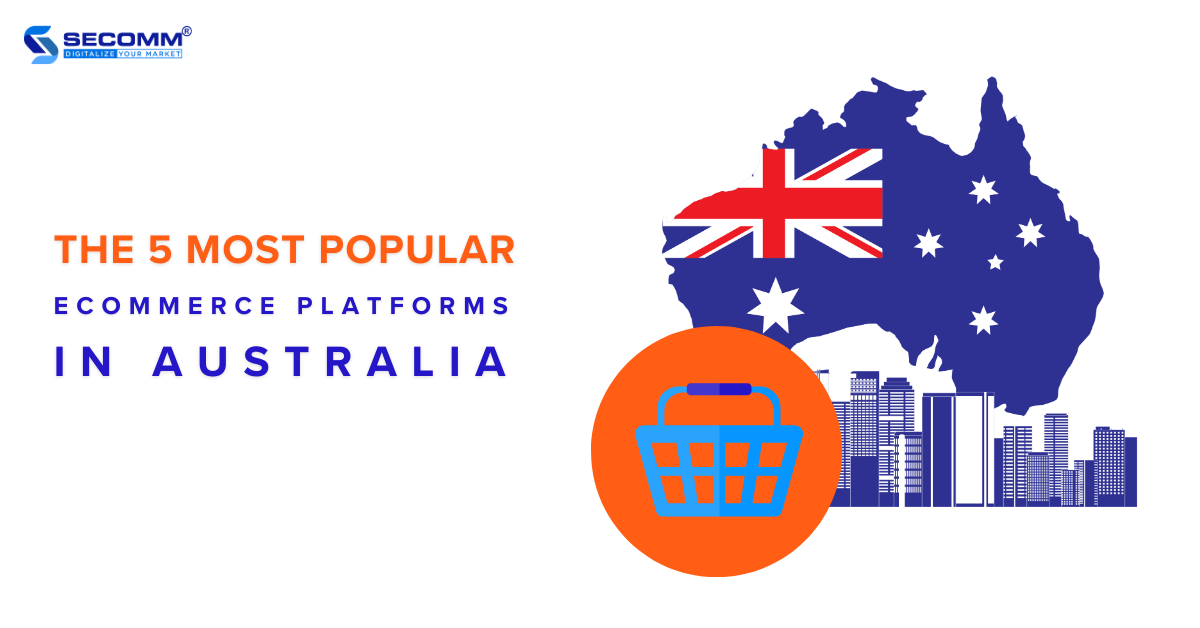
The Australian eCommerce world is continually evolving alongside the constant emergence of technological solutions. As a result, there is an increasing and diverse range of choices for eCommerce platforms.
This presents both an advantage and a challenge for businesses, as selecting the right platform for building an eCommerce website is a crucial first step.
Below are the top 5 leading eCommerce platforms in Australia.
Learn more: Top 10 most-visited eCommerce websites in Australia
Magento is a globally popular open-source platform, and its prevalence extends to Australia as well. According to BuiltWith, there are currently more than 4000 live websites in Australia utilizing the platform.
With its high flexibility, businesses can effortlessly tailor features and scale the system according to their unique business requirements.
Presently, Magento provides businesses with two versions: Open Source (Free) and Adobe Commerce (Paid).
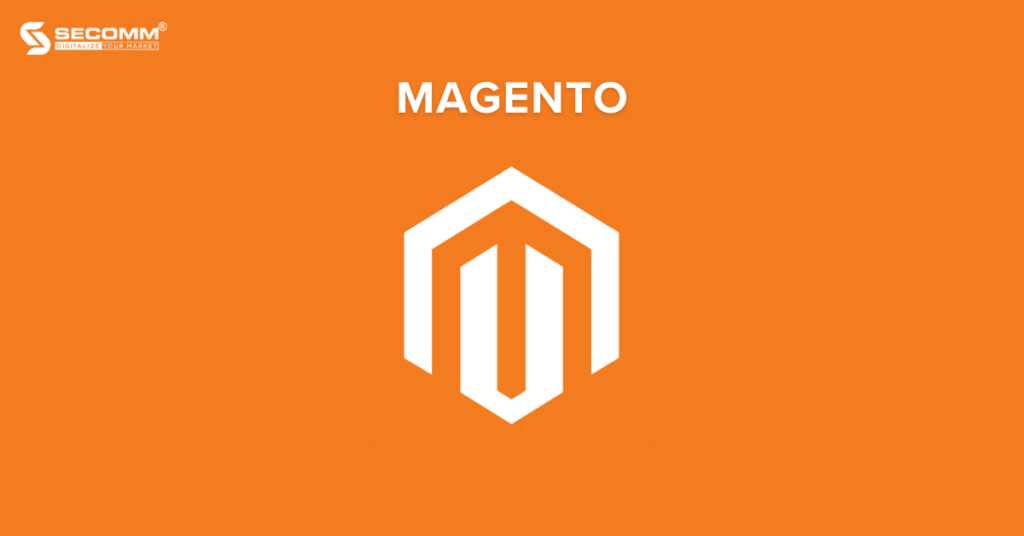
Pros:
Cons:
Core feature:
Pricing:
Learn more: Top Magento eCommerce websites in Australia
Shopify is a popular SaaS platform with over 4.8 million active websites. In Australia alone, over 150 thousand online stores are operating on the platform.
Recently, the premium version of Shopify, ‘Plus,’ has garnered attention from businesses across various sectors in Australia.
These businesses may have previously deployed different eCommerce platforms and later switched to the Plus to seek a superior solution. Some businesses initially launched websites with core plans and later upgraded to ‘Plus’ to optimize their operations.
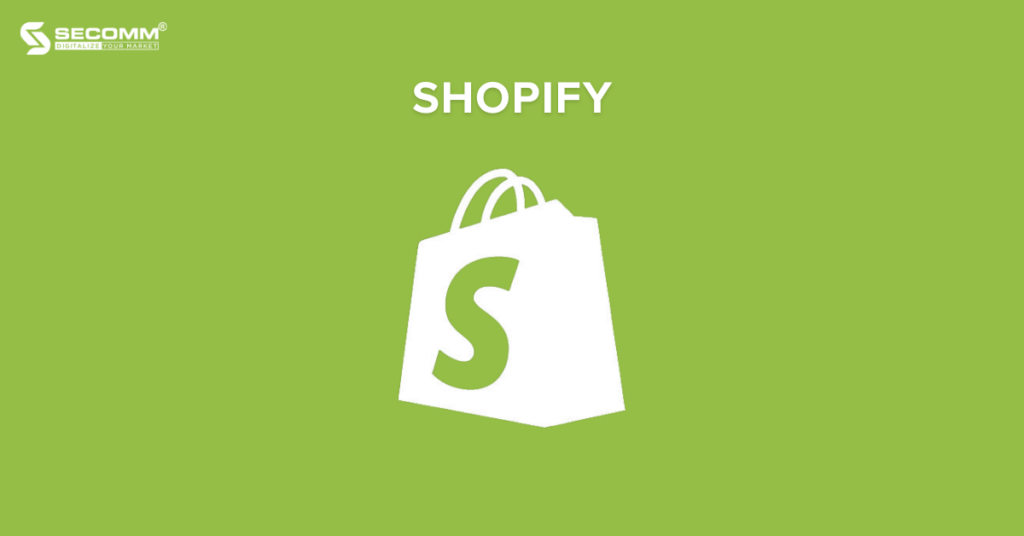
Learn more: Top eCommerce websites upgrade to Shopify Plus
Pros:
Cons:
Core feature:
Pricing
Here are Shopify pricing plans:
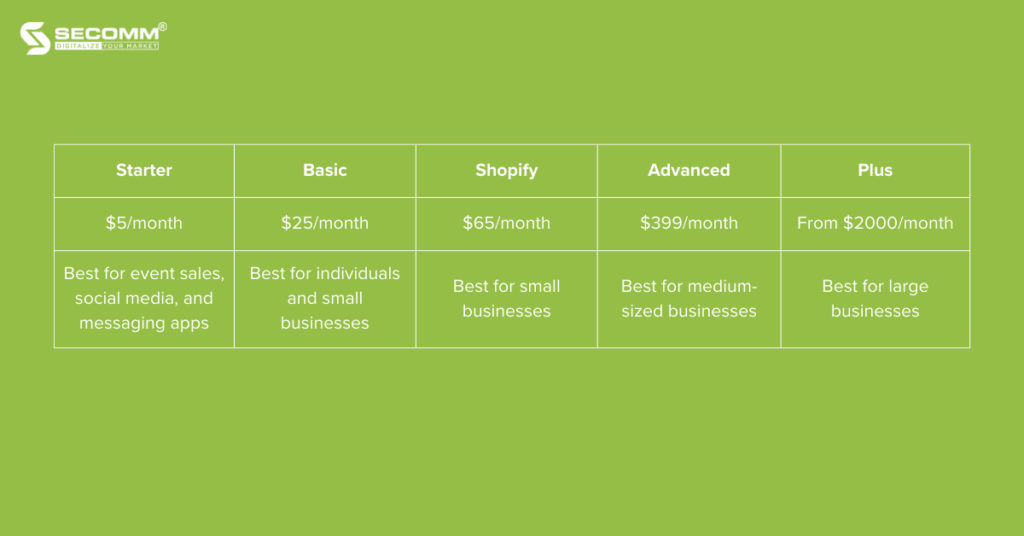
BigCommerce is another popular SaaS platform worldwide, with over 43 thousand active websites. In Australia, there are more than 2 thousand active BigCommerce websites.
The standout feature of this SaaS platform is its integrated features, enabling businesses of all sizes and technical expertise to deploy eCommerce websites quickly. In addition to standard solution packages, BigCommerce offers an ‘Enterprise’ version tailored for large businesses with custom pricing.
Learn more: Top 10 eCommerce websites using BigCommerce
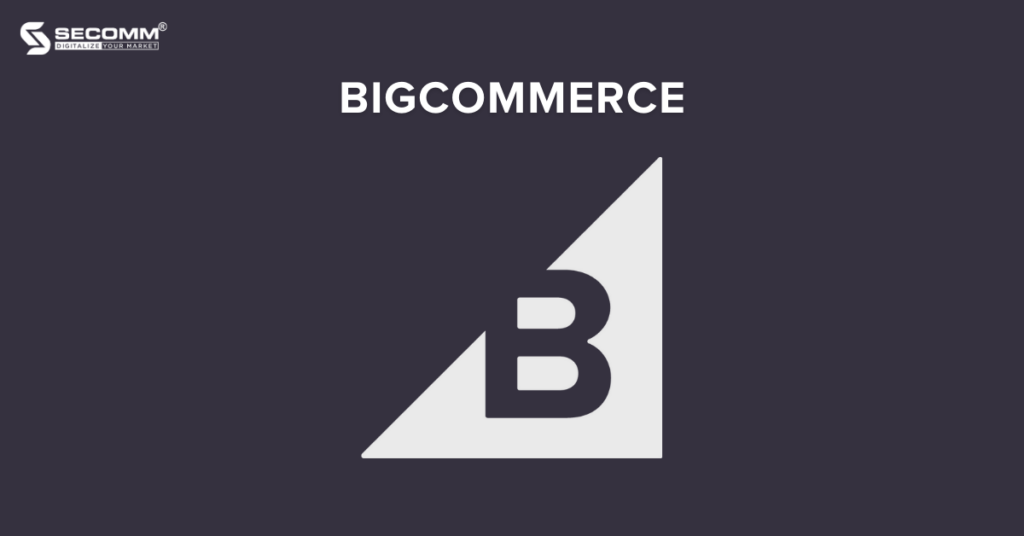
Pros:
Cons:
Core feature:
Pricing
Here are BigCommerce pricing plans:
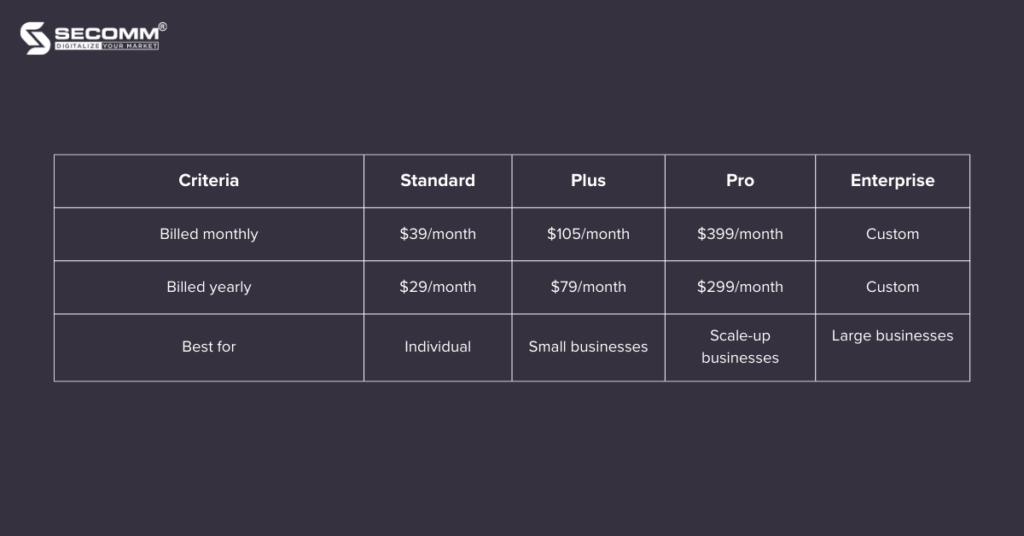
WooCommerce, a free and open-source WordPress plugin, enables brands to integrate eCommerce functionality into their existing WordPress websites.
With just a few clicks, the WooCommerce plugin helps convert a standard WordPress site into a fully-featured eCommerce platform, complete with essential features and easy customization.
Learn more: 20 websites using WooCommerce
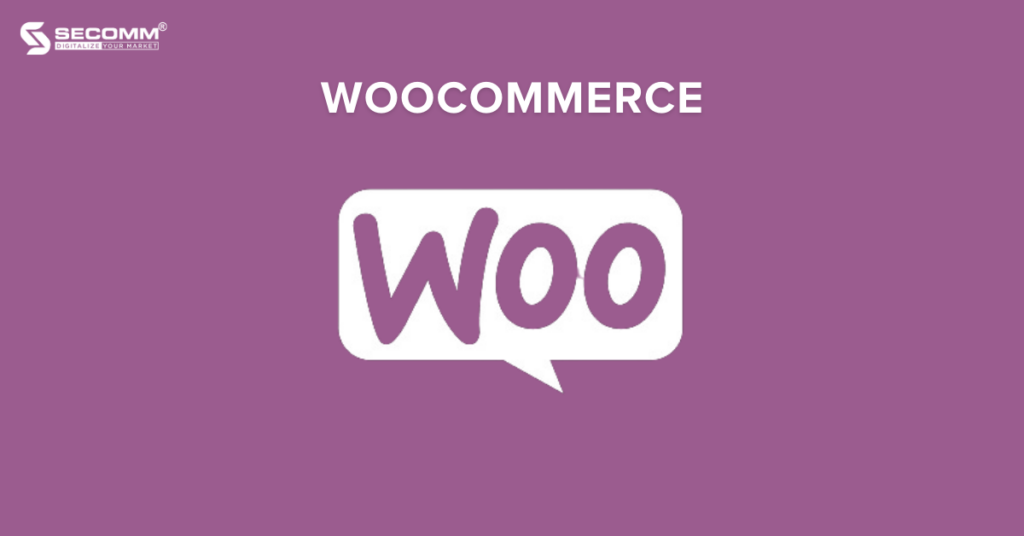
Pros:
Cons:
Core feature:
Pricing: Free to use. However, some integrations with other plugins may incur charges.
OpenCart is a globally popular open-source platform, powering over 900 thousand active websites worldwide. In Australia, it has gained popularity with more than 2 thousand active OpenCart websites, establishing itself as a favored open-source platform in the country, following Magento.
Founded by Daniel Kerr in 1998, OpenCart operates as open-source software, utilizing the PHP programming language. It currently offers two versions: Free (Free-to-use version) and Cloud Store (Paid version).
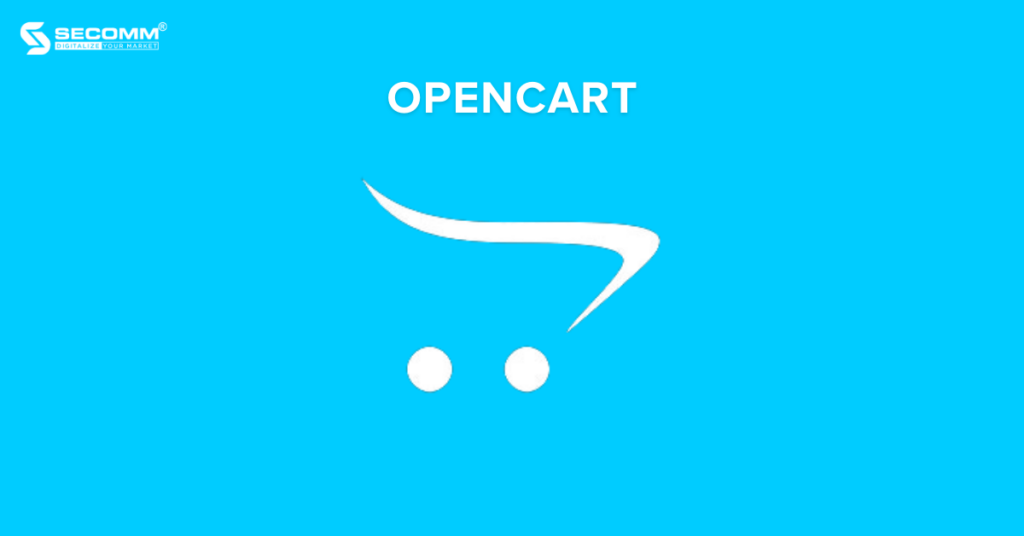
Learn more: Top OpenCart websites
Pros:
Cons:
Core feature:
Pricing:
Free for the Free version. For the Cloud Store version, the specific costs are as follows:
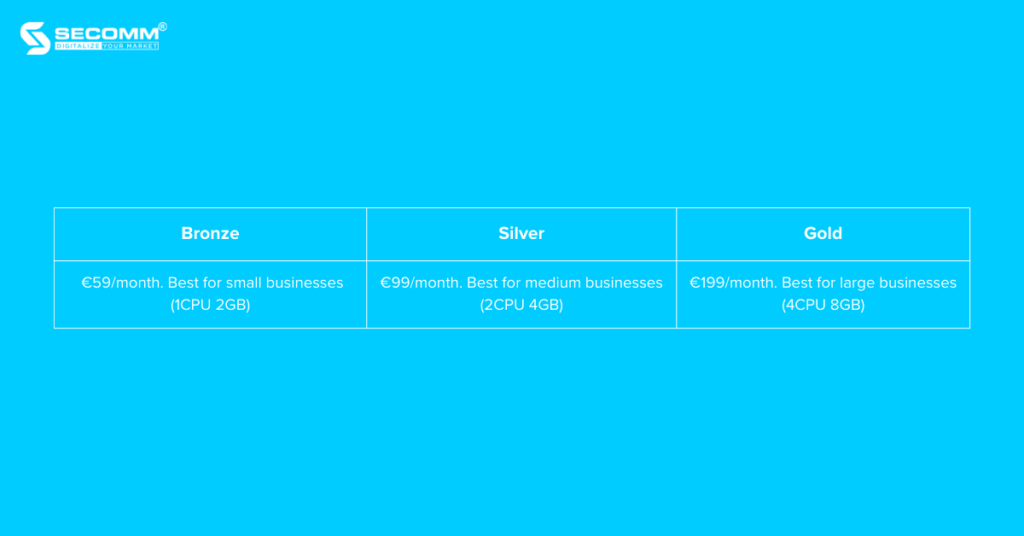
Above are 10 eCommerce platforms preferred by businesses in Australia when establishing their online stores. Each business will make its decision based on factors like scale, business model, and specific deployment requirements.
With over 10 years of experience collaborating with various Australian businesses such as Laybyland, RodShop, Trentham Estate, Jasnor, etc., to build eCommerce websites, SECOMM now possesses a team of highly skilled technical experts and a deep understanding of the Australian market.
For personalized advice on the best-suited platforms for your business, contact us or call the hotline (+84)28 7108 9908 today!
 2
2
 3,716
3,716
 0
0
 1
1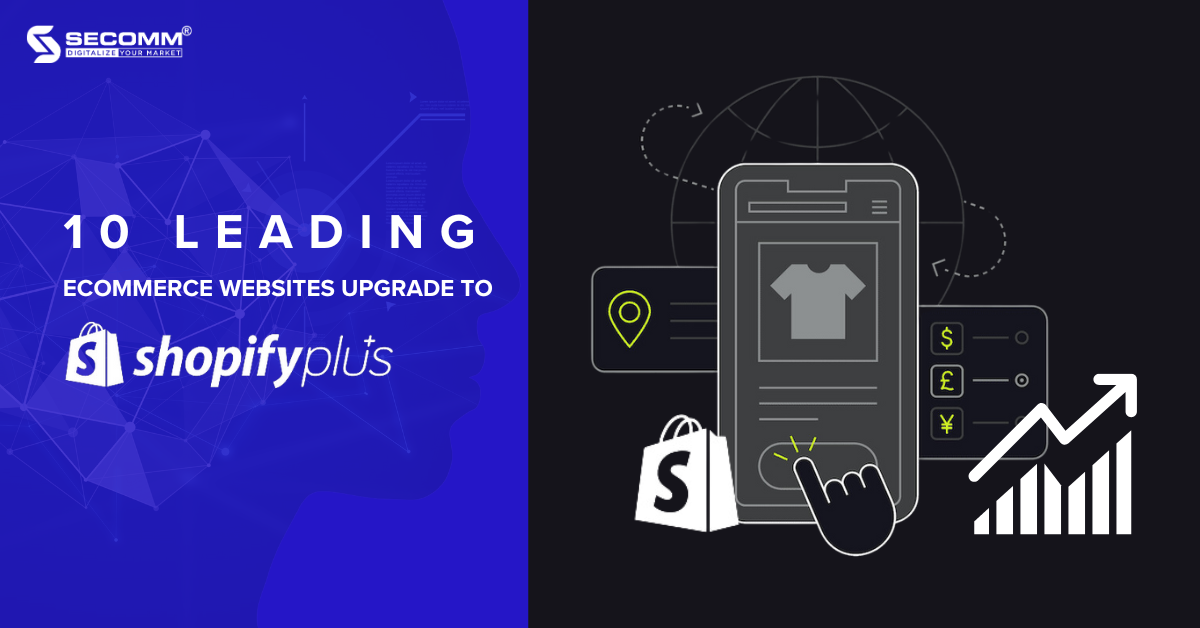
Choosing to upgrade to Shopify Plus is like opening the door for you to enter a world of unparalleled flexibility, speed, and customization. Countless brands across diverse industries and business models heavily rely on Shopify. According to BuiltWith statistics, there are more than 4 million Shopify websites globally. Many well-known brands have experienced remarkable sales and conversion rate surges after upgrading.
Let’s explore 10 eCommerce websites that have upgraded from core Shopify to Plus.
Founded in 2015 by Julian Hearn and James Collier, Huel is a brand specializing in meal replacements and nutritional supplements. Their product lineup includes nutritional powder (Huel Powder), ready-to-drink meals (Huel Ready-to-Drink), snack bars (Huel Bar), and additional supplements like omega-3 oil and protein powder.
After just 5 years, the brand experienced rapid growth, expanding 9 online stores and 120 staff members globally. As a result, the brand opted to upgrade to Shopify Plus to enhance its operational efficiency.
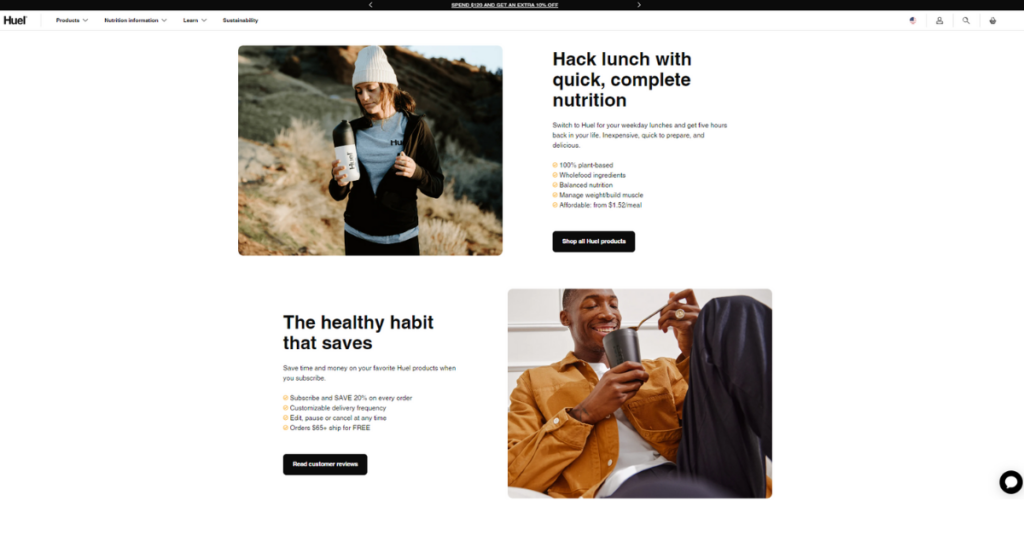
After more than 30 days of replatforming, Huel witnessed significant changes. Tasks such as adding employee accounts and assigning roles across one of the 9 stores, previously taking over 30 minutes, now only require a few minutes.
This not only streamlines the operation of current stores but also creates favorable conditions for Huel to expand and effectively manage an increasing number of stores and personnel in the future.
Negative Underwear was established in 2014 by two sisters, Lauren Schwab and Marissa Vosper. The brand’s mission is to offer women high-quality, straightforward, and comfortable lingerie. Negative Underwear quickly garnered attention for its unique designs and a philosophy focused on the wearer’s comfort and confidence.
From its early days, Negative Underwear built an eCommerce website using Shopify. As sales grew and the need for expansion became apparent, the lingerie brand decided to upgrade to Shopify Plus.
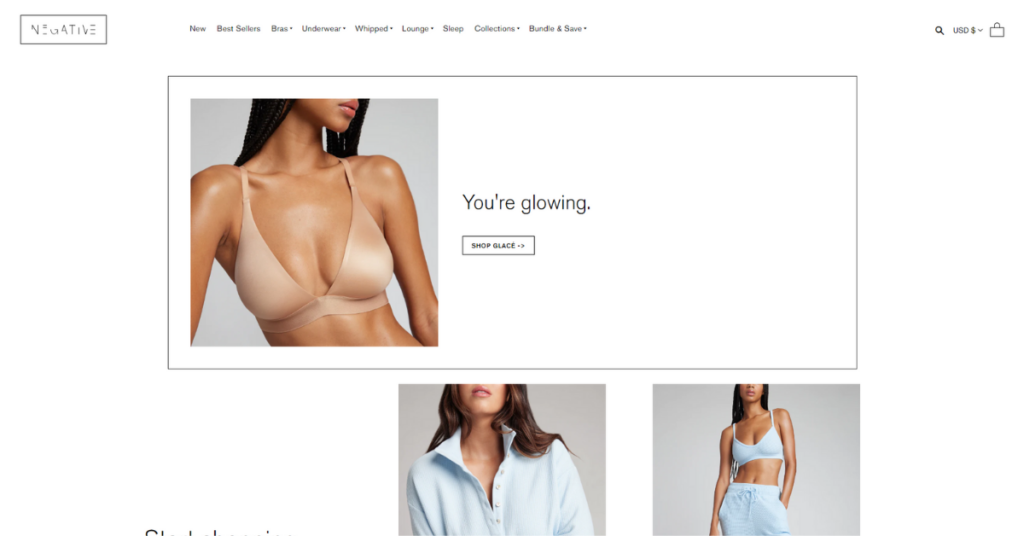
Through Shopify Plus, Negative Underwear benefits from a comprehensive and consistent overview of financial and sales reports. Streamlining operational tasks for centralized inventory management has become more efficient.
Streamlining operational tasks for centralized inventory management has become more efficient. Furthermore, the lingerie brand can effortlessly devise promotional campaigns during significant year-end shopping periods, enhancing the overall customer experience for those seeking to make multiple purchases simultaneously.
ILIA is a popular clean beauty brand that has garnered favor among consumers and earned numerous awards. With a commitment to helping users safeguard and rejuvenate their skin through safe and highly effective formulas, the brand has become a go-to choice.
While initially running on Shopify Advanced, the eCommerce website swiftly expanded, and ILIA upgraded to Shopify Plus for enhanced customization capabilities.
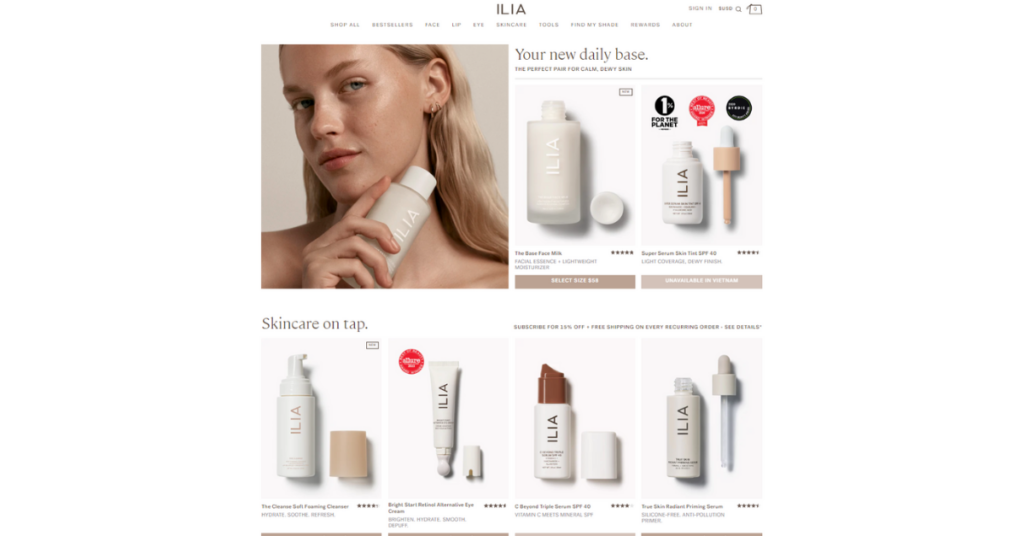
Moreover, through Shopify Plus, ILIA introduced Headless Commerce to ensure customers enjoy an optimal shopping experience without compromising page load speed and overall website performance. The deployment time with Shopify Plus saw a 20% improvement, and since the upgrade, ILIA has observed a notable 18% reduction in bounce rates.
Founded in 2002 by two Italian brothers, Vincent and Brian Wu, Incu swiftly rose to prominence as a leading fashion shopping destination in Sydney. Initially operating on its eCommerce platform, Incu later made the switch to the Basic Shopify.
However, with the company’s expansion and the introduction of a diverse range of products from various international brands, Incu found the need for a more robust backend system to efficiently manage the growing complexity of its eCommerce operations.
This included improving order processing workflows, inventory management, and automated updates for delivery rules and size customization based on customer location.
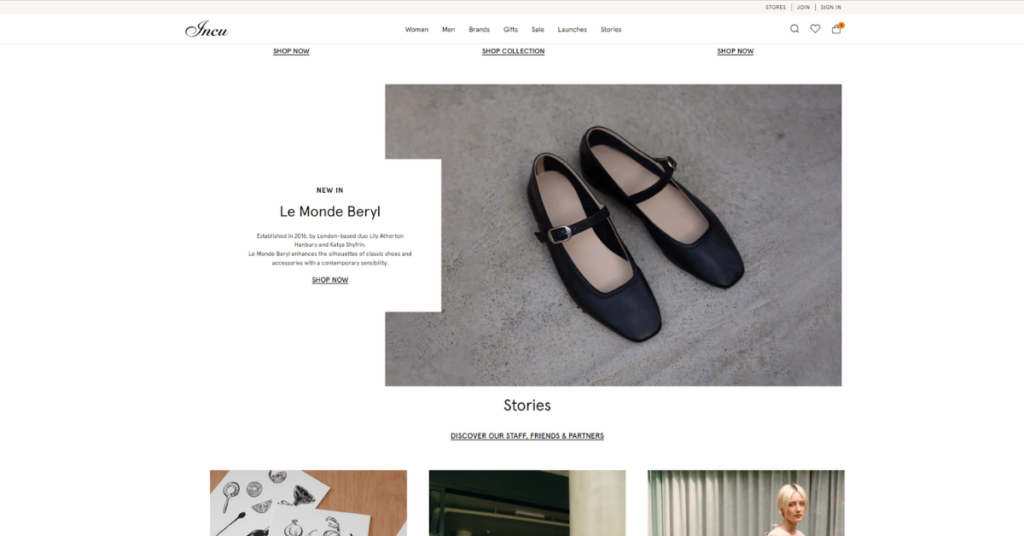
Incu, in particular, integrated advanced solutions from Shopify Plus, including LaunchPad and Flow, and implemented automation and Script Editor to tailor the shopping cart and checkout experience.
In the first week post-upgrade to Shopify Plus, Incu experienced a 15% increase in conversion rates, a 26% rise in revenue, and an average interaction rate of 91%, along with a noteworthy 40% reduction in bounce rates.
Boxraw is a sports fashion brand specializing in boxing, with its main headquarters situated in London, England. Established in 2017 by Ben Amanna, a professional with a background in sports and boxing, the brand aims to deliver high-quality products catering to both novice enthusiasts and professional athletes in the boxing realm.
In its early days, Amanna spent time reading Shopify blogs, building a website with the basic plan, and seeking support from the advisory team to learn about eCommerce and launch his brand.
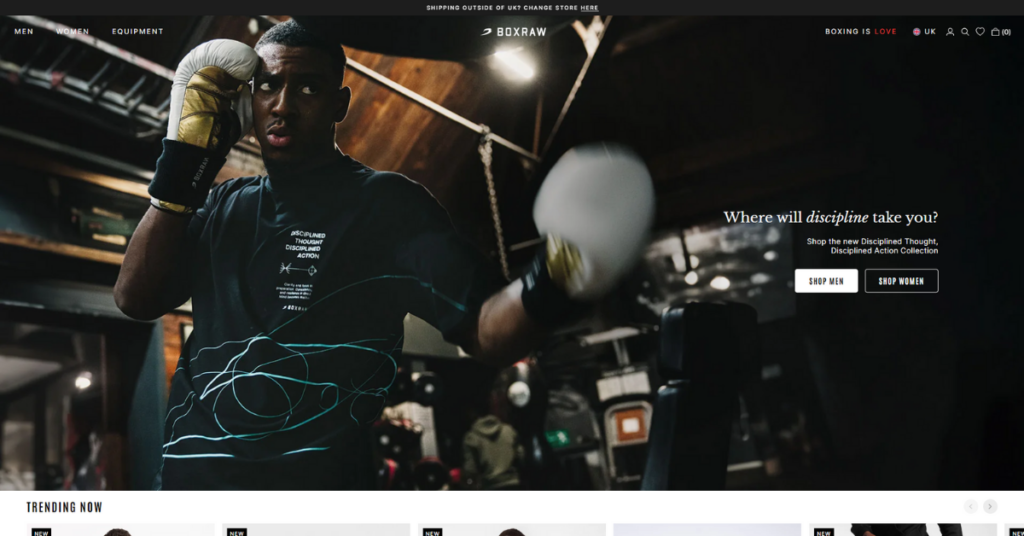
Particularly noteworthy is Boxraw’s use of LaunchPad, an exclusive solution tailored for Shopify Plus businesses, facilitating the creation of automated sales campaigns.
This has enabled the Boxraw team to break free from repetitive tasks, providing customers with distinctive shopping experiences at enticing prices.
In 2016, Lizzie Carter faced the challenge of finding the perfect towel to dry her naturally curly hair in London. Unable to find one, she decided to take matters into her own hands and create it herself. This led to the creation of Only Curls, which has since become the preferred shopping destination for those with curly hair.
Only Curls primarily offers a range of products, including pre-shampoo treatment oils, post-shampoo treatment oils, hair-fixing gels, and other items specifically designed to support the daily care and styling needs of curly hair.
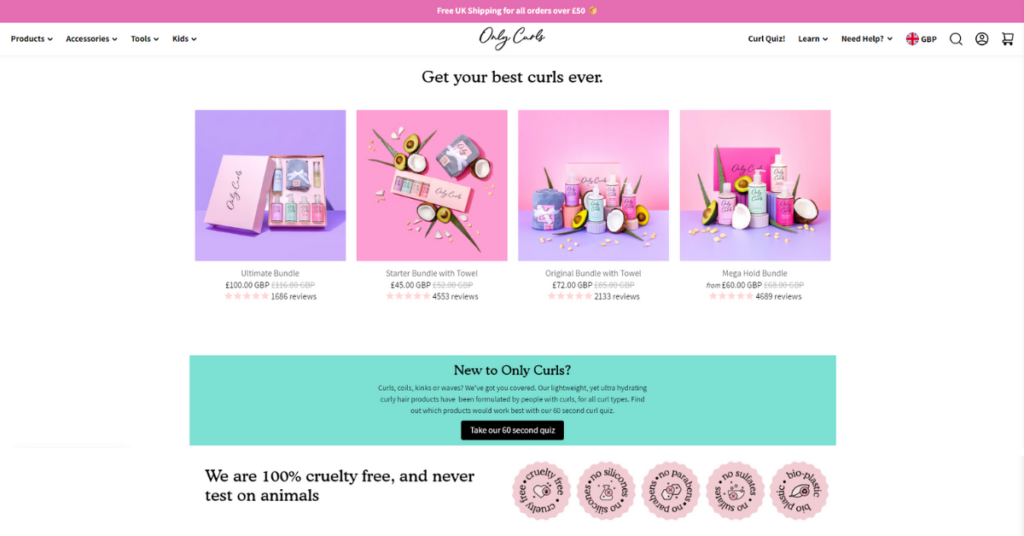
After initially using the basic Shopify package, Only Curls upgraded to the ‘Plus’ package due to the rapid growth of their business. With the upgrade, the brand incorporated LaunchPad and several apps from the Shopify Plus Certified App, such as Klaviyo and Gorgias, to streamline sales, marketing, and customer care processes.
This strategic decision resulted in a 19% increase in conversion rates, a 10% rise in the average order value, and a remarkable 154% surge in the total number of orders in the first month.
Aje is a renowned fashion brand headquartered in Sydney, Australia. After over a decade since its establishment, the brand has rapidly become a significant name in the international fashion industry.
Recognized for its more than 18 stores across Australia and New Zealand, each exuding an air of luxury and contemporary design, Aje aimed to mirror this aesthetic in its eCommerce presence.
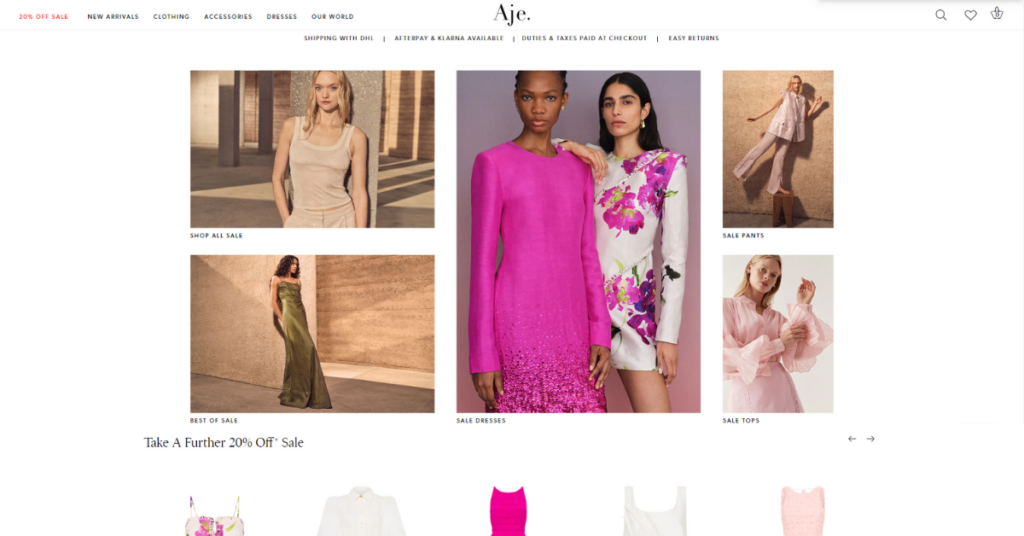
As a result, the brand upgraded to Shopify Plus to efficiently launch a new website with minimal downtime, ensuring a seamless integration of the online and offline customer experiences. Within just a few weeks of the upgrade, Aje observed a remarkable 135% increase in its conversion rate and a substantial decrease in bounce rates.
Founded in 2008 and headquartered in California, USA, Animals Matter stands as a premier brand in the realm of luxurious pet accessories. Specializing in crafting high-end products for pets, including beds, cushions, coats, collars, and more, Animals Matter prioritizes the comfort, safety, and fashionable flair of beloved pets.
Initially, Animals Matter opted for Shopify to establish a foundational eCommerce website, complemented by the strategic use of Google Ads. As sales began to climb, the brand decided to elevate its platform to the ‘Plus’ version, granting access to exclusive and advanced solutions.
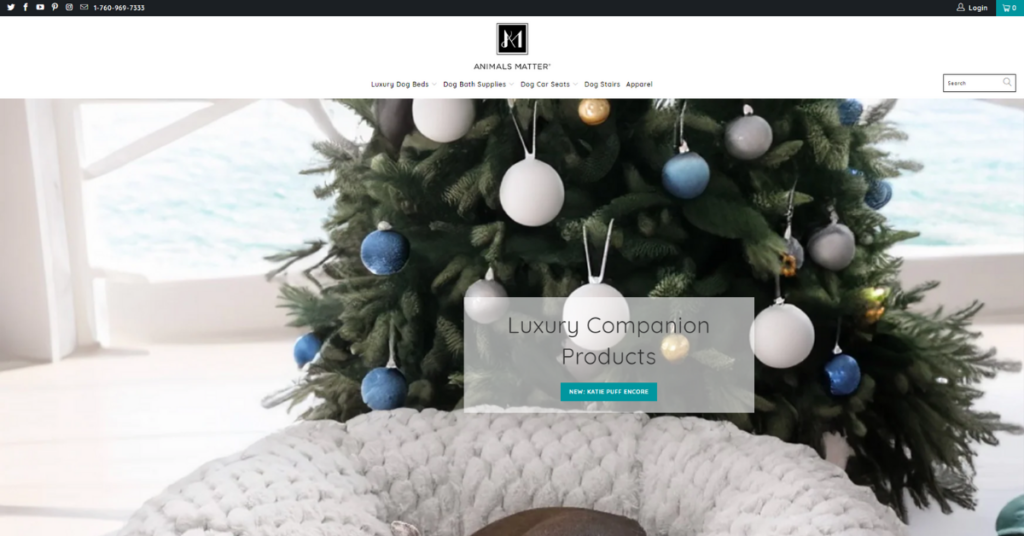
With a strategic focus on a Direct-to-Consumer (D2C) model and a commitment to multi-channel sales, Animals Matter seamlessly integrated its website with various social media platforms like Facebook, Instagram, Youtube, and Pinterest.
Moreover, utilizing the capabilities of ‘Plus,’ the brand employs email marketing to sustain customer engagement through diverse approaches. This includes the implementation of strategies such as abandoned cart emails, newsletters, and enticing promotional programs.
Boie, headquartered in New York, USA, is a personal care product brand that prioritizes safety and durability in its meticulously researched and crafted offerings. Boie’s products are crafted from antibacterial and recyclable materials, emphasizing a commitment to minimizing waste generation in the market.
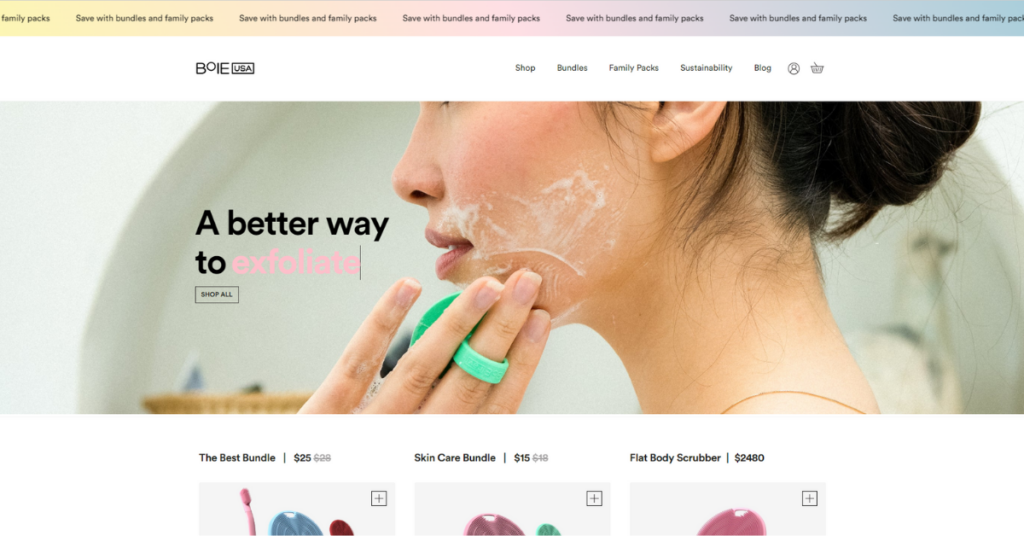
Recognizing the limitations of the basic Shopify solution in fulfilling its vision for an enriched eCommerce website user experience, Boie made the strategic move to upgrade to Shopify Plus. This flexible platform serves as a solution to address two key objectives for Boie: enhancing conversion rates, particularly for customers abandoning their carts, and optimizing SEO strategies to boost website traffic.
A prominent player in the personal care product market is al.ive body. This brand emerged amid Australia’s Covid-19-induced lockdown.
With prior success using Shopify, al.ive body decided to elevate its e-commerce website by switching to Shopify Plus, where it benefitted from valuable guidance and support from the Merchant Success team.
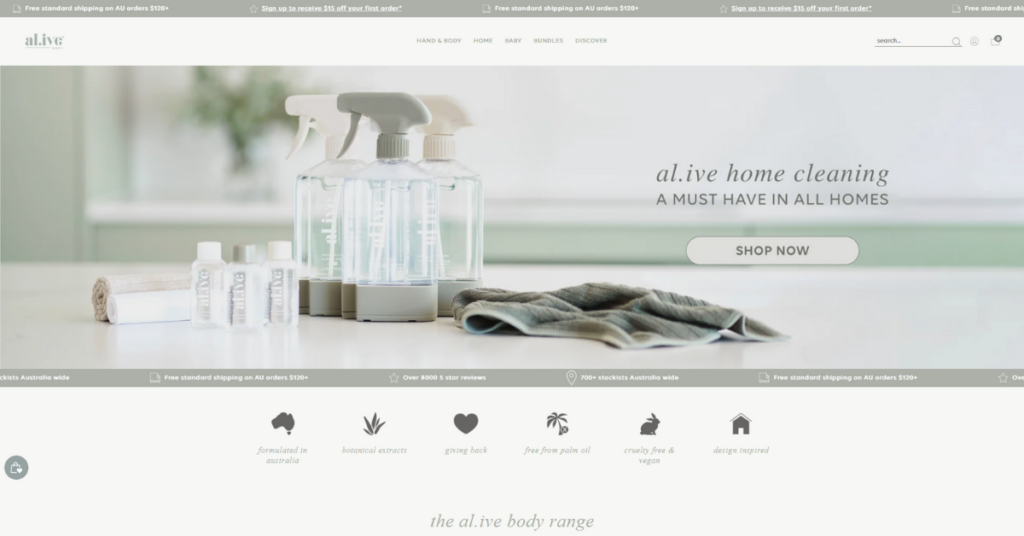
Leveraging the expansive features of ‘Plus,’ al.ive body introduced a dedicated B2B eCommerce website catering to wholesale customers. Moreover, the brand employed the Functions solution to tailor the backend logic of Shopify, enhancing the customer experience, and streamlining the payment process.
Since upgrading, the company achieved over 1 million Australian dollars in revenue within four days of the Black Friday sales event. Taking advantage of the increased customer influx during the sales period, al.ive body boosted its customer conversion rate by 47% after implementing customizations aimed at simplifying the payment experience.
Above are 10 brands that have enhanced their eCommerce websites by upgrading from the core Shopify versions to the Plus version, seeking advanced solutions to streamline business processes and improve the customer experience.
As a trusted partner for enterprises like Vinamilk, Suzuverse, SECOMM boasts a highly skilled technical team with profound knowledge of Shopify Plus.
Contact SECOMM or call the hotline to start upgrading your eCommerce website today!
 2
2
 4,343
4,343
 0
0
 1
1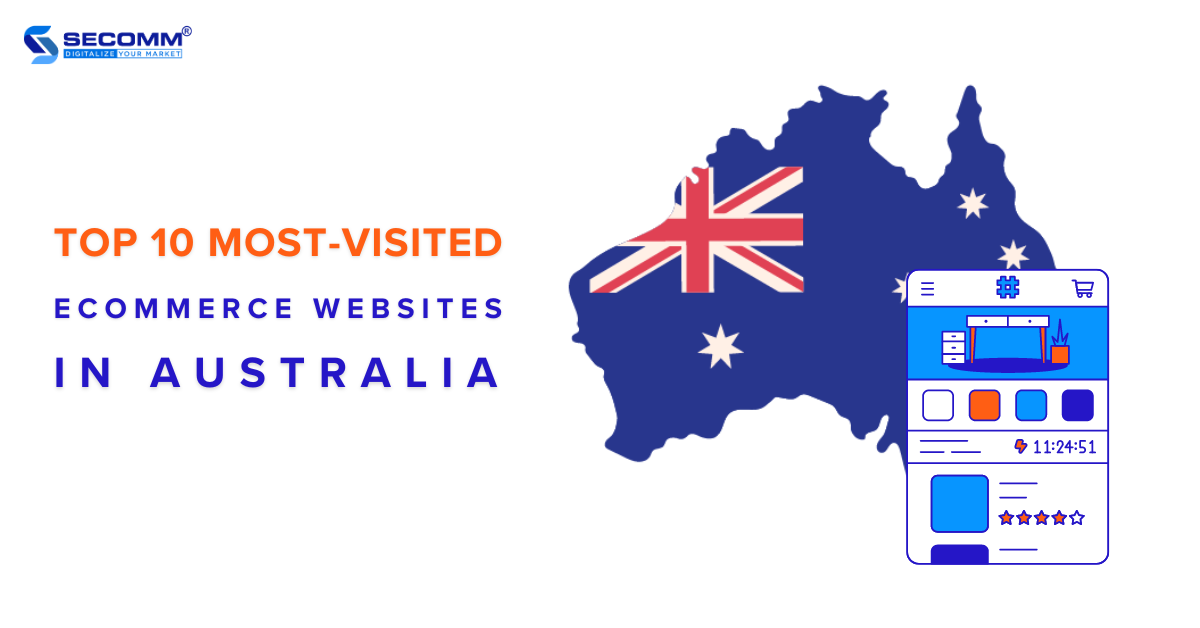
In Australia, shopping on eCommerce websites has become an essential trend. Over time, there has been a growing demand for an enhanced online shopping experience among Australian customers. This requires businesses to seek solutions to optimize their websites to provide a unique and efficient customer experience.
Here are 10 leading Australian brands dedicated meticulous efforts to refining the eCommerce experience, thereby gaining customer satisfaction and trust.
JB Hi-Fi is a retail chain headquartered in Australia, specializing in electronics, household goods, and entertainment products. It was founded in 1974 in Melbourne by John Barbuto (JB) and his wife, Judy Barbuto (the JB Hi-Fi name is a combination of the initials of John’s name and Judy’s name).
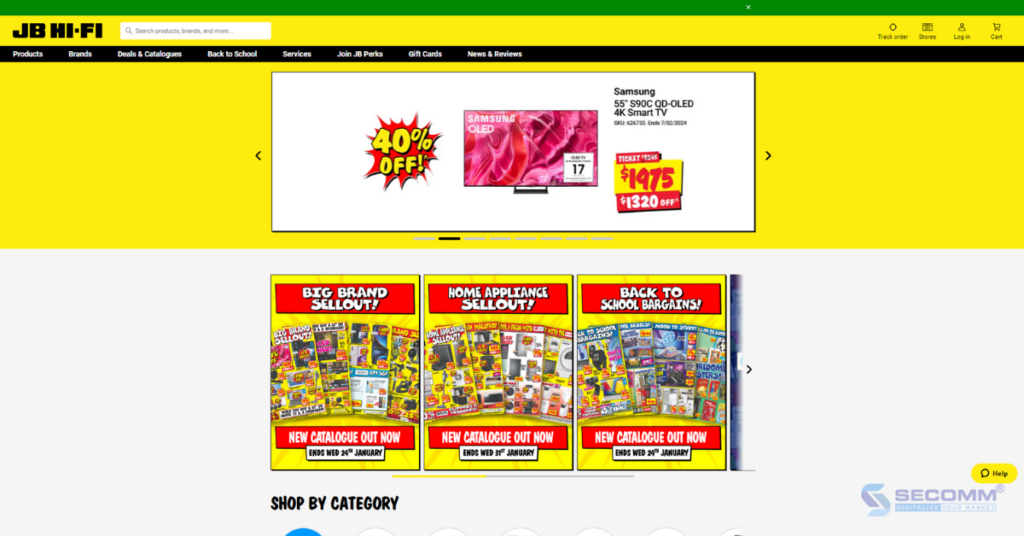
Alongside its brick-and-mortar stores in Australia and New Zealand, the brand also maintains an eCommerce website and a mobile app. These two primary channels enable customers to shop online and stay updated on various offers and promotions.
Beyond offering a diverse range of high-quality consumer electronics, JB Hi-Fi places a strong emphasis on providing customer support services both online and offline, aiming to deliver the optimal customer shopping experience.
Coles is a leading supermarket and retail chain in Australia. Established in 1914, the brand has since experienced impressive expansion and development, emerging as one of the major names in the Australian retail industry.
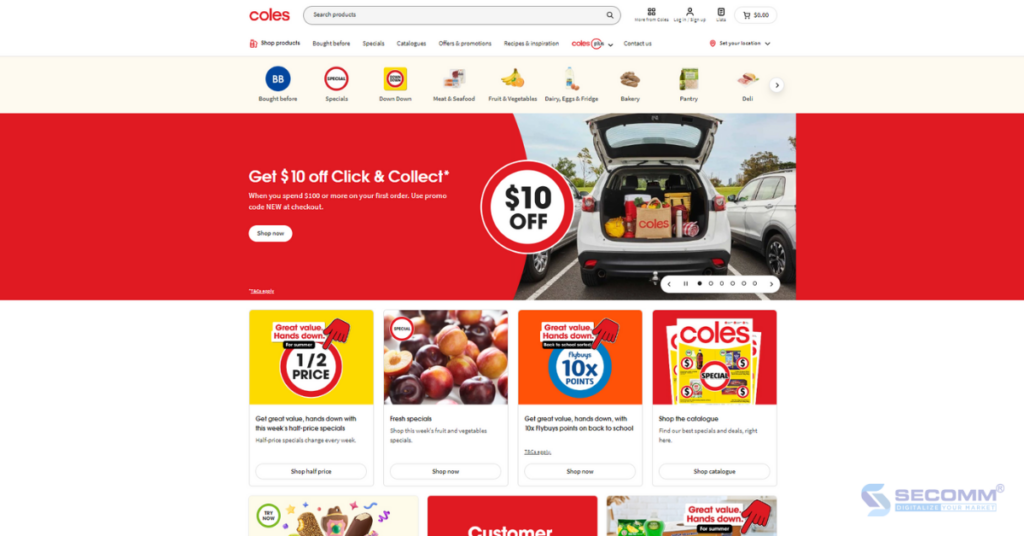
Coles offers online shopping services through its user-friendly eCommerce website and mobile app. The Australian brand also ensures competitive pricing and consistently introduces promotional initiatives, providing customers with a diverse array of options.
The ICONIC is an Australian eCommerce website specializing in fashion and footwear. Established in 2011, the brand swiftly captured attention, evolving into a premier online shopping destination for fashion enthusiasts in both Australia and New Zealand.
At The ICONIC, customers can easily discover their preferred products from a diverse selection of globally renowned brands, including Levi’s, Adidas, Lacoste, Polo Ralph Lauren, and more.
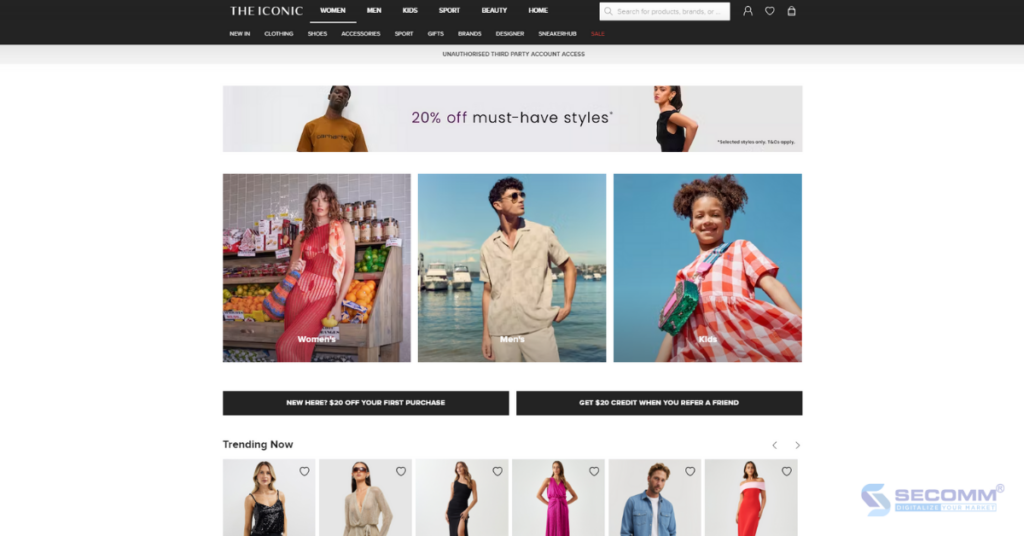
The ICONIC’s website is optimized to help customers browse products, place orders, and track their shipments effortlessly. Beyond providing a unique online shopping experience, The ICONIC regularly updates fashion trends and offers informative content for its customers.
Cotton On was established in 1991 by Nigel Austin in Geelong, Australia. The brand offers a wide range of fashion products, including clothing for men, women, and children, footwear, accessories, underwear, and even home goods and interior decorations in some stores.
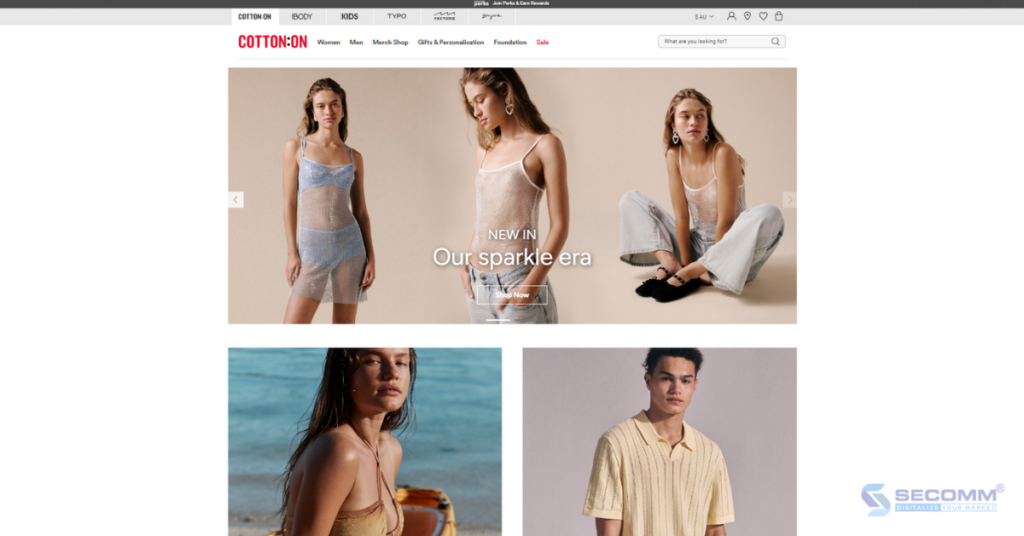
Cotton On has an extensive network of stores worldwide, with a presence not only in Australia but also in many other countries such as the United States, Canada, the United Kingdom, and various Asian countries. Therefore, an eCommerce website system has been built and developed with Salesforce Commerce Cloud (SFCC) to cater to the specific needs of each customer segment in different markets.
Sephora is a leading global retail chain specializing in cosmetics and beauty products. The brand is headquartered in Paris, France, and has expanded rapidly, establishing its presence in numerous countries across Europe, North America, Asia, and the Middle East.
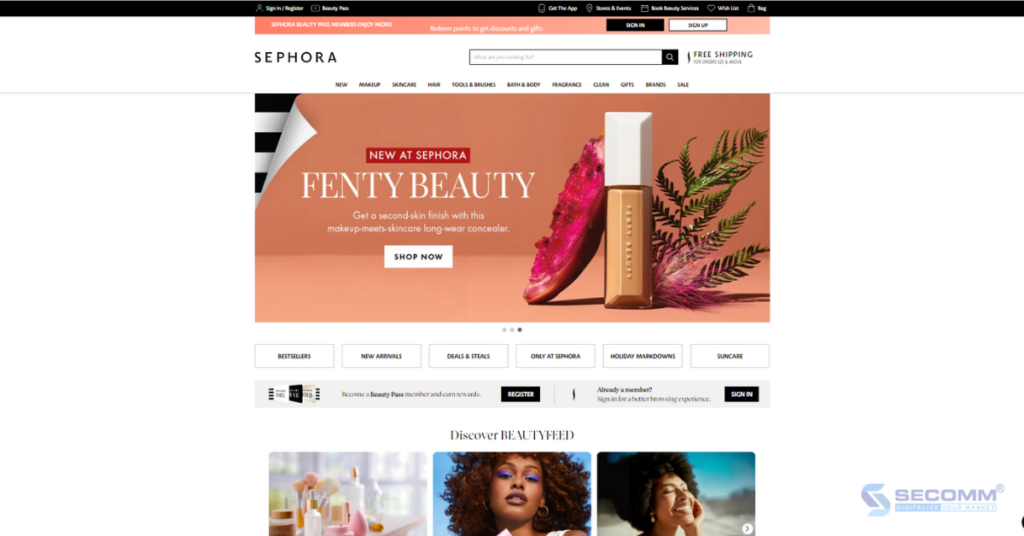
In Australia, Sephora is recognized as a go-to destination for purchasing cosmetics, both online and in-store. Sephora’s eCommerce website and mobile app boast various specialized features designed to elevate the customer experience. Moreover, the successful implementation of a loyalty program by Sephora across multiple markets serves as a valuable lesson for many other eCommerce enterprises.
Founded in Australia in 2006, Forever New is an international fashion brand that specializes in designing and manufacturing women’s fashion collections. The brand is renowned for offering customers products with a sophisticated and feminine style.
Since its inception, Forever New has experienced rapid growth and expanded its business not only in Australia but also in various other countries, including New Zealand, China, India, South Africa, and numerous European nations.
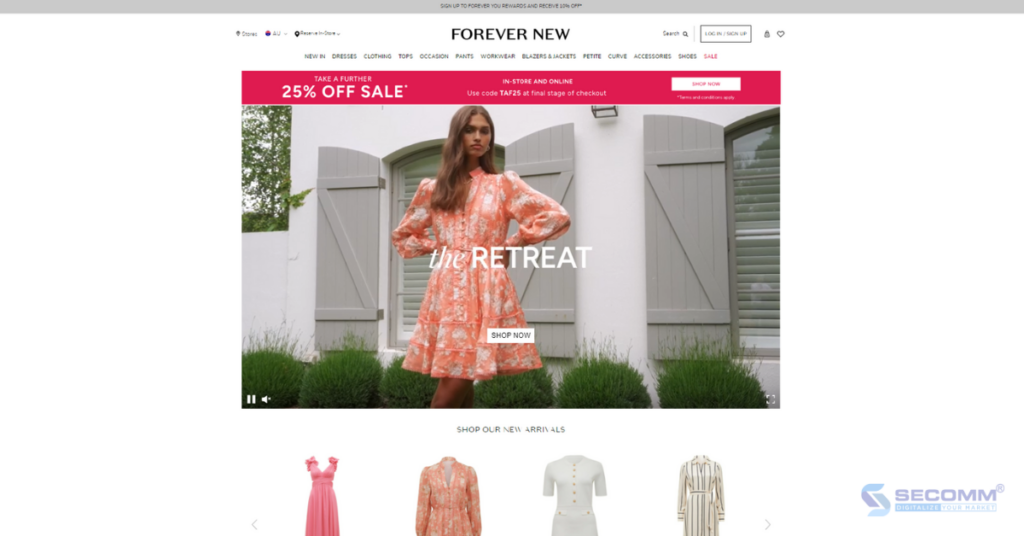
To meet the challenges of expansion and customization, Forever New opted for Magento Open Source to build its eCommerce system. Leveraging Magento, the brand has incorporated a range of advanced and specialized features alongside essential functionalities to enhance the online shopping experience for its customers.
Dick Smith is the name of a renowned Australian entrepreneur, Richard “Dick” Smith, who founded this brand in 1968. In its early years, Dick Smith focused on providing electronic products and components.
The brand quickly grew and expanded its product portfolio from electronic appliances, computers, mobile phones, cameras, and tech toys to other technology and entertainment-related products.
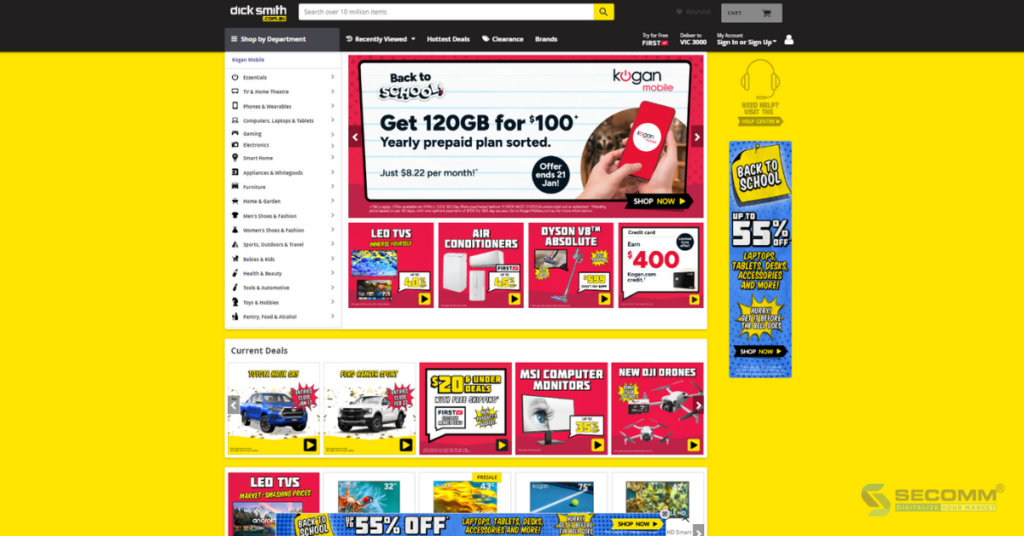
Dick Smith’s eCommerce website is built on the Magento platform. This has helped Dick Smith enhance its presence in both online retail and traditional retail stores, allowing the brand to reach a large audience through an optimized shopping experience.
Bed Bath N’ Table is a well-known brand specializing in furniture, home decor, and household items in Australia.
Its eCommerce website offers a diverse array of products for the living room, bathroom, dining area, and bedroom. Customers can easily discover items such as blankets, pillows, bedding sets, decorations, lamps, cookware, tableware, and numerous other products.
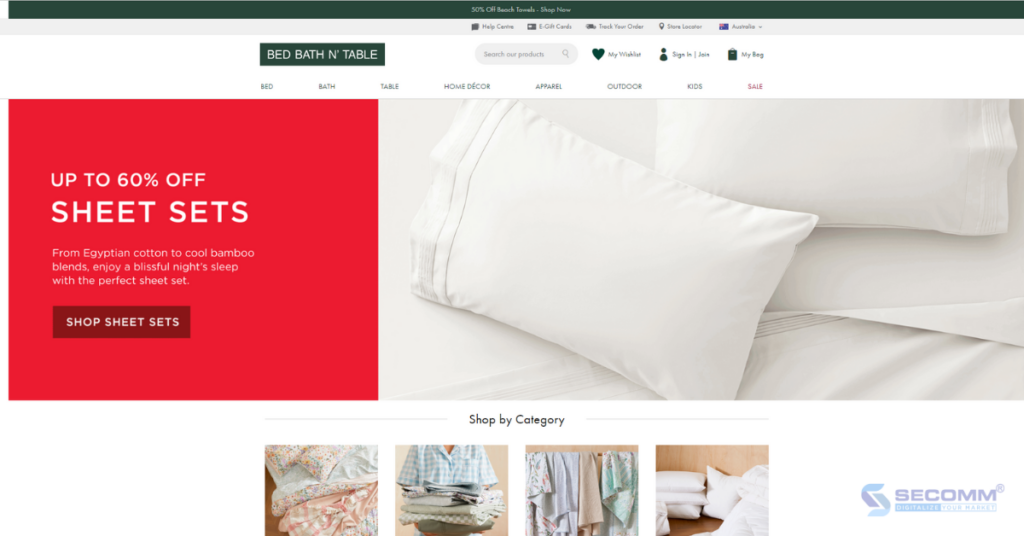
In addition, Bed Bath N’ Table provides various payment methods and implements a loyalty program to enhance the shopping experience for customers, ultimately boosting conversion rates and sales.
Over the years, through a commitment to professionalism and prioritizing customer experience, Bed Bath N’ Table has solidified its presence throughout the regions of Australia and New Zealand.
Established in 1990, Glue Store is an Australian fashion retail chain specializing in products from popular brands, especially those favored by the youth. Over the years, Glue Store has swiftly expanded to become a go-to fashion shopping destination in the Australia and New Zealand region.
Currently, Glue Store collaborates with a variety of renowned brands, including Adidas, Nike, Tommy Hilfiger, Calvin Klein, Puma, and various streetwear labels.
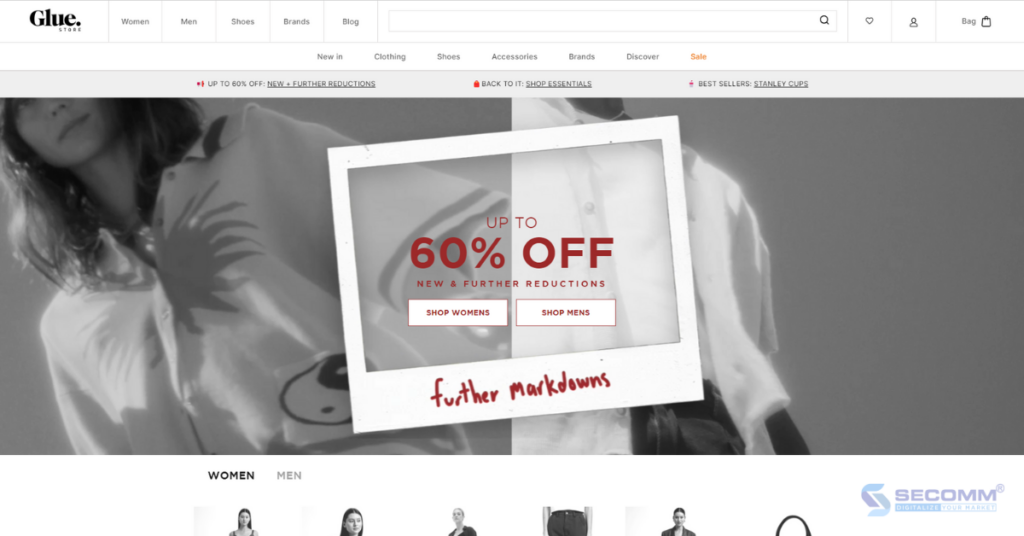
In addition to its traditional store chain, Glue Store offers customers an online shopping experience through an eCommerce website built on the Shopify platform. The website boasts a uniquely designed interface with advanced features, particularly enhancing the customer experience, notably during the checkout process.
Furthermore, Glue Store consistently introduces appealing promotional programs to attract and retain its customer base.
The eCommerce website Chemist Direct has become quite familiar to Australian consumers in recent years. It is a reliable destination for purchasing beauty products, personal care items, prescription and non-prescription medications, as well as medical equipment.
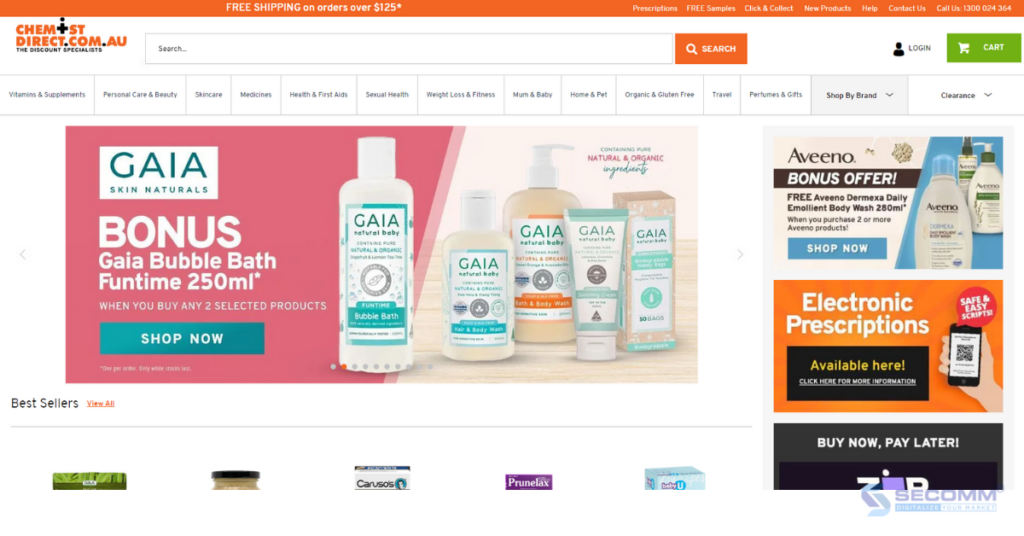
With a diverse and extensive product catalog, Chemist Direct has developed its eCommerce system on Magento to leverage the flexibility and easy scalability of this platform. Through Magento, the Chemist Direct team can easily develop and customize numerous advanced features, making searching, browsing, ordering, and payment more straightforward.
When it comes to payments, the brand implements Buy Now Pay Later with Afterpay and Zip, alongside traditional payment methods, allowing customers additional choices and flexibility when making purchases.
Here are the leading 10 eCommerce websites in Australia. Utilizing advanced platforms like Magento, Shopify, and SFCC, these brands have delivered an optimal online shopping experience, successfully attracting both local and international consumers.
Throughout years of growth, SECOMM, in collaboration with numerous Australian clients, has proudly contributed to the creation of exceptional eCommerce websites. Noteworthy projects include partnerships with Laybyland, Jasnor, Rod Shop, and others.
Contact SECOMM or call directly at the hotline (+84)28 7108 9908 to get started!
 2
2
 5,259
5,259
 0
0
 1
1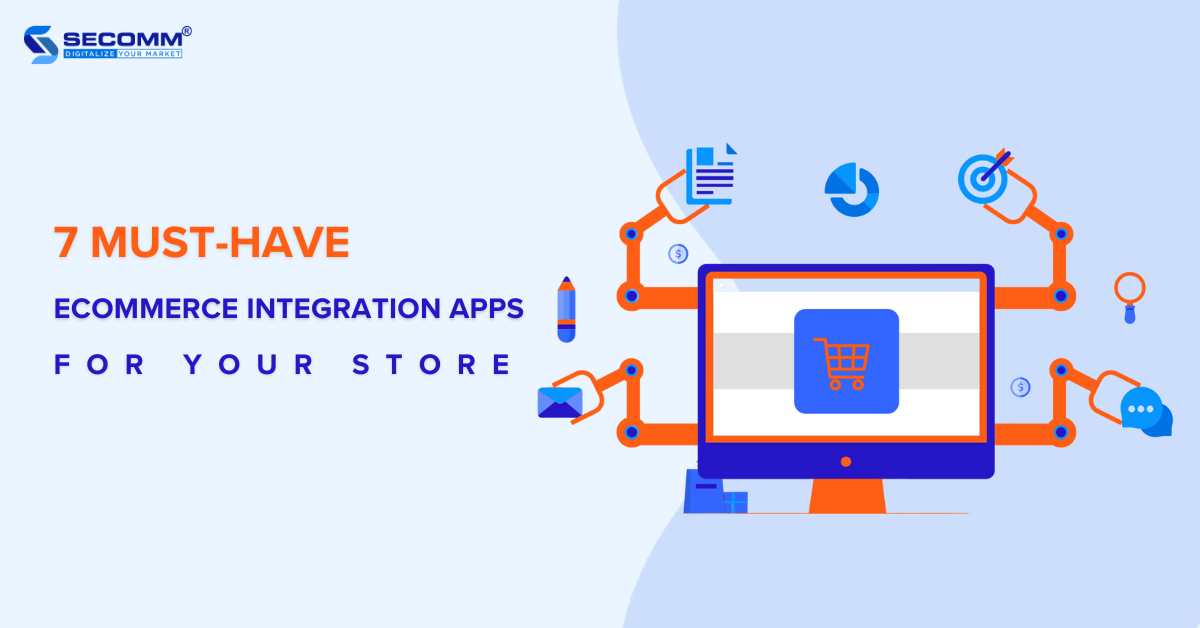
Several crucial factors impact the efficiency of running an online store. Among these, effectively implementing eCommerce integrations plays a key role in helping you streamline your operations and reduce risks.
Below are 7 essential integrations that you should include in your eCommerce website.
PIM (Product Information Management) is one of the common eCommerce integrations. The PIM system is used to collect, organize, and manage product information, including details such as product descriptions, images, prices, product attributes, customer reviews, and ratings.
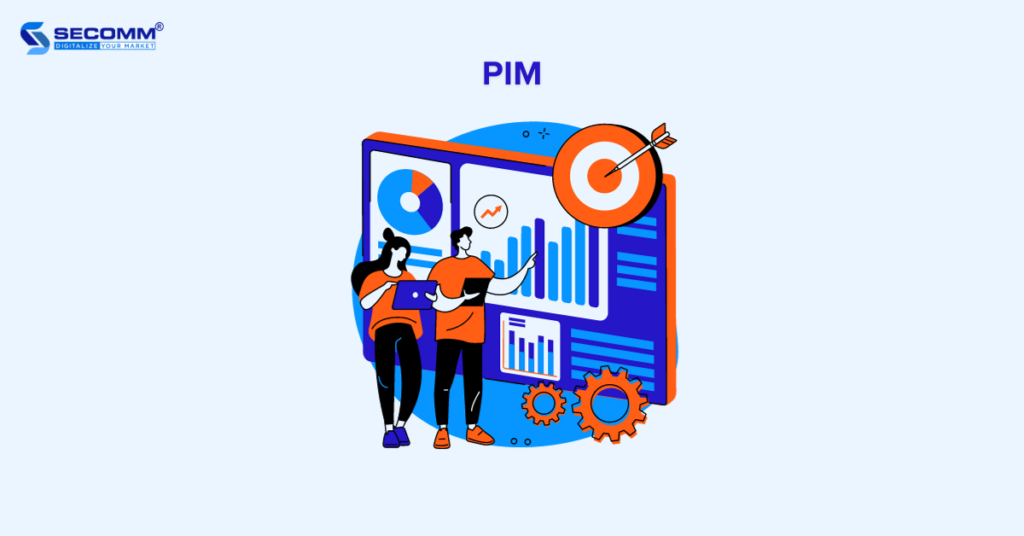
This tool helps you manage product information across diverse platforms, making it easier for customers to choose their desired products. Plus, PIM helps you save time compared to manual data entry, thereby reducing personnel costs.
Take Akeneo PIM, for instance; it is an open-source platform tailored for managing product information effectively. Akeneo is also flexible enough to seamlessly integrate with various systems such as ERP, CRM, POS, and popular eCommerce platforms like Magento, Shopify, and WooCommerce.
Currently, Akeneo offers three main PIM plans, including:
The Order Management System (OMS) helps you process orders in various channels.
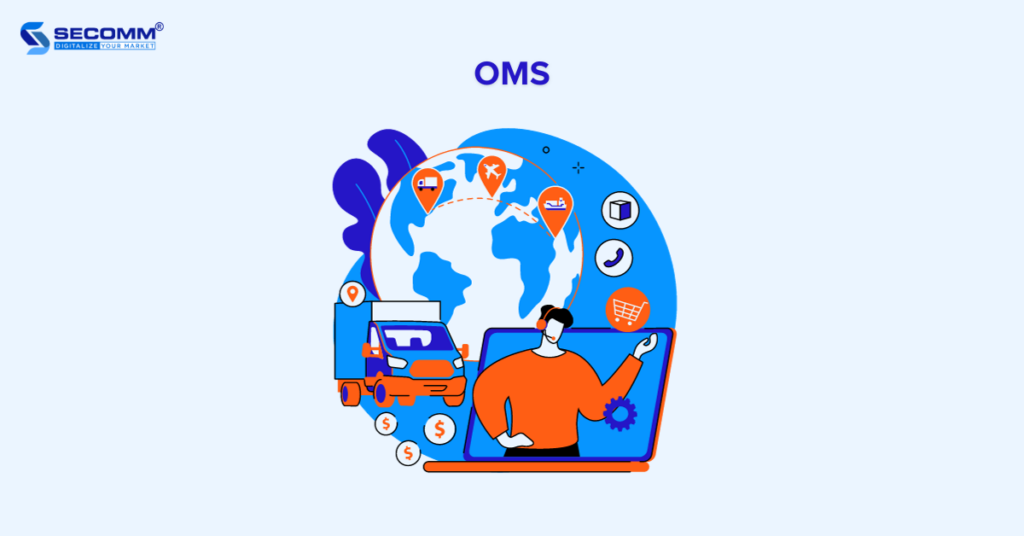
This eCommerce integration not only helps businesses efficiently manage orders, optimizing the customer experience, but also collects and analyzes data at peak and off-peak sales times, as well as for specific orders, top-selling items, and consumer behavior.
So, you’ll easily adjust their business strategies and manage inventory effectively.
For example, Fabric OMS is a Distributed Order Management (DOM) system designed to help you streamline the order processing process, including online purchases at the store (BOPIS), delivery to the store, and in-store order fulfillment.
Fabric’s order management solution helps you integrate and manage the entire order process on a single interface. You can optimize your order processing, minimize inventory discrepancies, and free up resources for other important tasks.
The Warehouse Management System (WMS) will help you manage the flow of goods, inventory, and shipping to facilitate sales and order fulfillment.
By automating order processing and optimizing the layout of goods in the warehouse, WMS accelerates order processing, reduces order preparation time, and enhances the ability to quickly respond to customer demands.
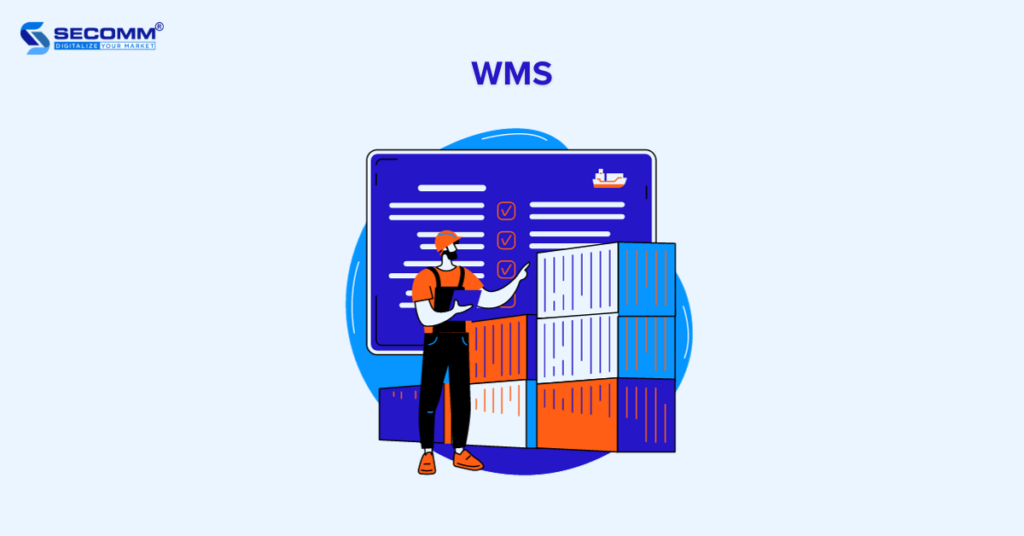
For example, Oracle Warehouse Management Cloud (WMS) is one of the eCommerce integrations that offers a cloud-based warehouse management system. It is well-suited if you’re looking for effective warehouse inventory management.
It automates warehouse processes such as receiving, storage, order processing, and shipping, particularly well-suited for a wide range of business scales. It also seamlessly integrates with ERP, CRM, and other supply chain solutions.
POS (Point of Sale) is a system that includes both hardware and software components, or it can be as straightforward as a point-of-sale device like a computer, tablet, smartphone, or receipt printer.
POS helps you manage and execute sales transactions, calculate payments, generate receipts, manage inventory, handle customer relations, and provide crucial sales-related information.
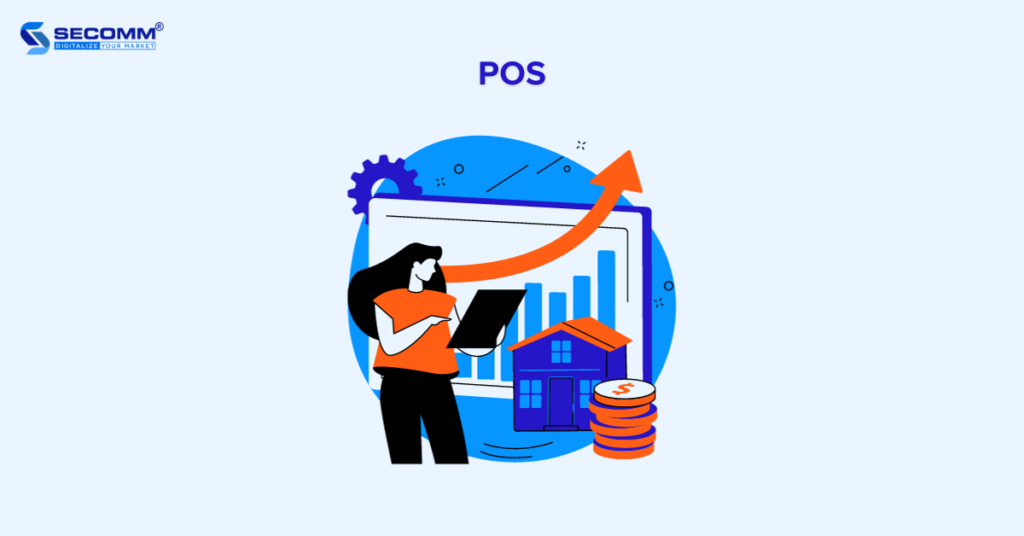
For instance, the Square POS system, developed by Square, has garnered the interest of numerous large businesses globally due to its free features. However, each transaction conducted through the POS incurs a fee of 2.6% and 10 cents for each tap, dip, or swipe.
For the “Buy Now Pay Later” model, the fee is 6% and 30 cents. Additionally, Square provides tailored POS packages for businesses with revenues surpassing $250,000.
Xem thêm:
CRM (Customer Relationship Management) helps you organize and manage customer information, including contact details, purchase history, and interactions. So, you’ll easily tap into customer needs and preferences, optimizing the shopping experience and increasing order conversion rates.
Moreover, CRM allows internal departments to interact and work on a unified and automated system, saving time and costs.
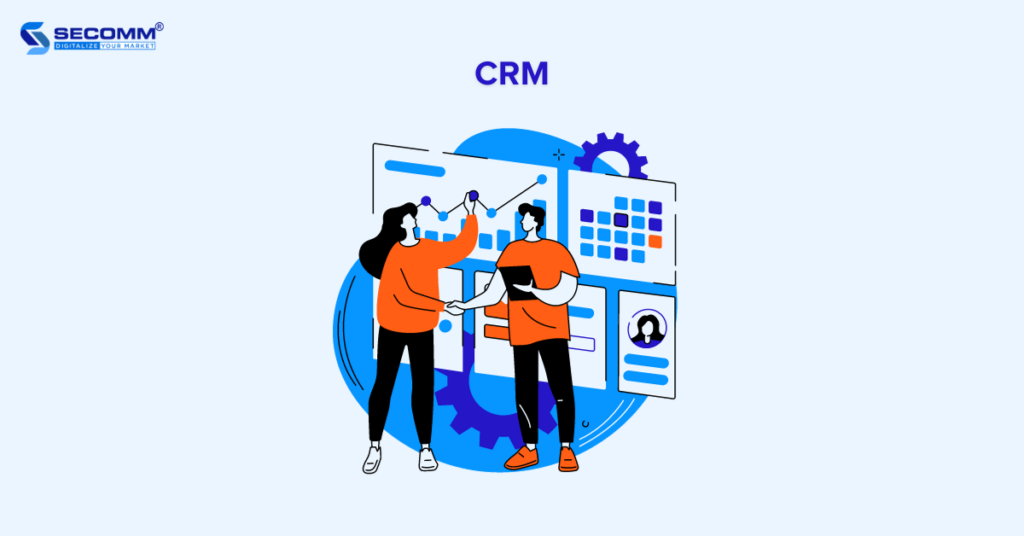
For example, Dynamics 365 Sales is one of the CRMs developed by Microsoft. With its intuitive interface, easy setup, and flexible customization capabilities, you can manage and enhance the efficiency of the sales process.
the system provides a “Real-time Insight” feature to deliver real-time insights from sales calls, such as customer emotions and sentiments. This helps businesses assess and strategize for their sales teams.
Currently, the system offers three plans:
Learn more:
Instead of relying on separate, isolated software systems lacking interdepartmental cohesion, ERP (Enterprise Resource Planning) integrates all software into a unified system.
The ERP eCommerce integration helps you manage all organizational activities, from inventory control and orders to financial planning and customer interactions.
You’ll maximize time efficiency, minimize costs, boost business productivity, and reduce unnecessary workforce.
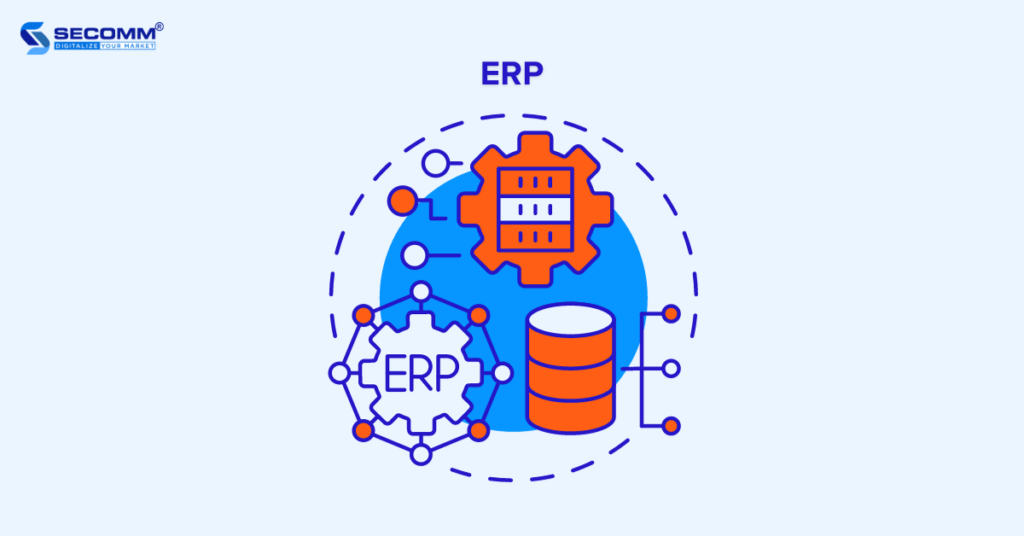
For example, Oracle ERP is one of the top global ERP software known for its outstanding features for operational efficiency.
Currently, Oracle provides three different plans tailored to specific needs:
Learn more: 6 best enterprise ERP software
Business Intelligence (BI) helps you analyze data from various sources such as eCommerce websites, POS systems, CRM, and other data sources. Plus, you’ll gain a deeper understanding of customer behavior, shopping trends, and factors influencing sales performance.
By using BI, you can also predict shopping trends to formulate specific strategies, while simultaneously monitoring financial performance, including forecasting sales figures, profits, and other financial indicators. This helps you allocate resources accurately.
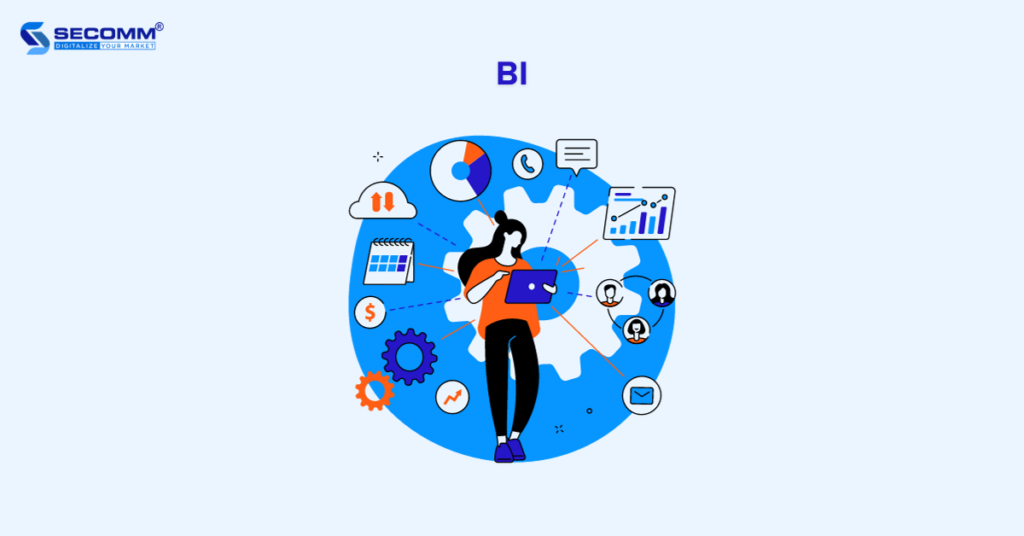
For example, Tableau is a widely used BI tool suitable for various individuals and organizations. With a user-friendly interface that requires minimal technical knowledge, Tableau allows users to easily create reports and visualize data.
The ability to connect and integrate data from various sources, including cloud data, and transform it into visually appealing charts and graphs, makes it easy for users to analyze trends and information
Deploy eCommerce integrations today!
Above are 7 popular eCommerce integrations to build your eCommerce website and enhance your online presence. You’ll choose your best-suited systems depending on the strategy, estimated budget, and business direction.
With profound knowledge of the eCommerce industry and experience in deploying integrations for all sizes of businesses, SECOMM is committed to proposing cost-effective solutions to develop your high-performing eCommerce system.
Contact or call directly on the SECOMM hotline (02871089908) to get started today!
 2
2
 3,553
3,553
 0
0
 1
1Subscribe to get the latest eBook!
Hotline